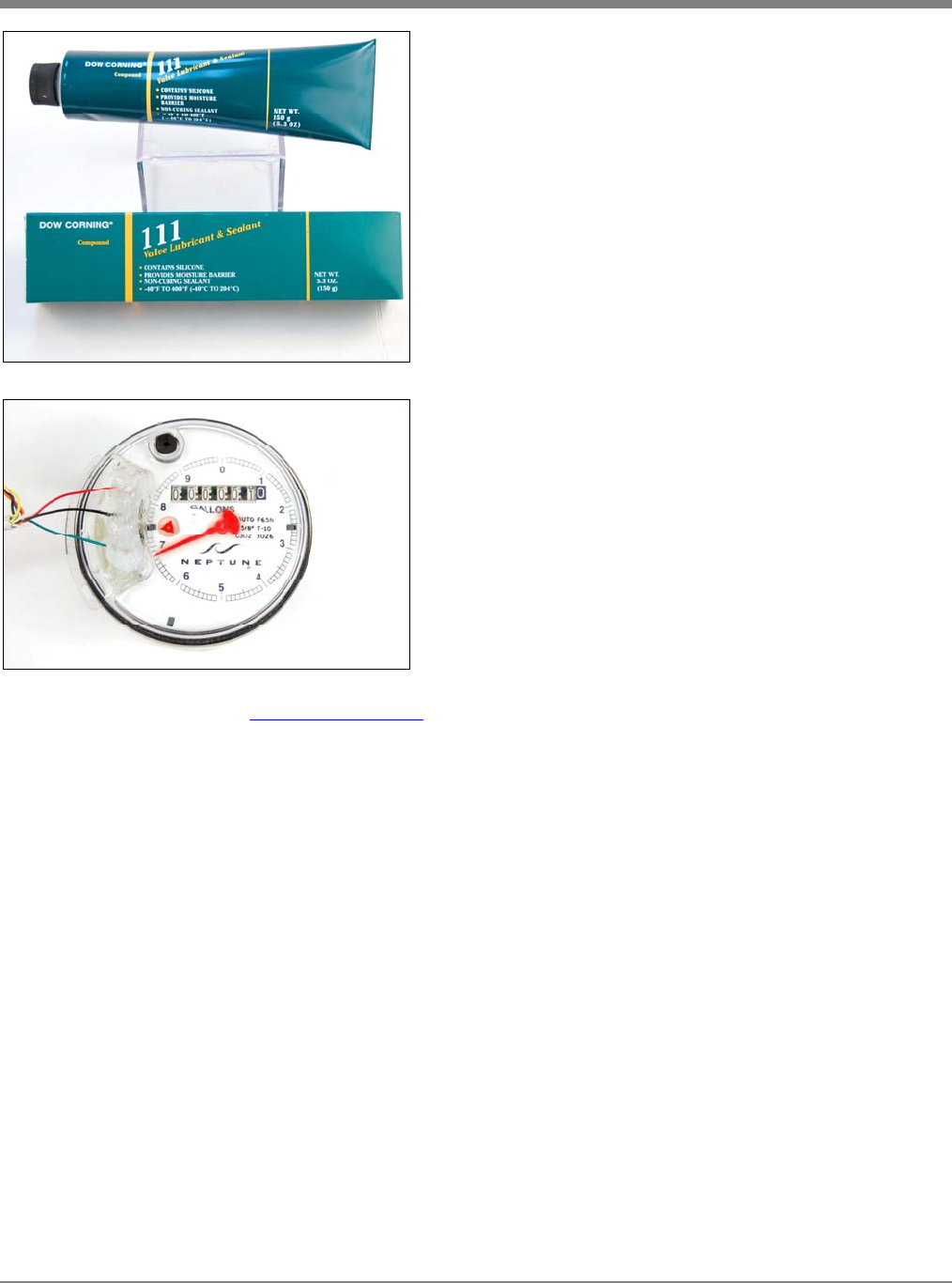Datamatic D4111G D4111 Water Firefly Rev G User Manual PROFILEPLUS 2
Datamatic, Ltd D4111 Water Firefly Rev G PROFILEPLUS 2
manual
MOSAIC WATER FIREFLY®
USER TRAINING GUIDE
(Operators Manual)
MOSAIC 1.1 / ROUTESTAR MVP 3.10 / ROADRUNNER 3.27

Datamatic, LTD. System Training Manual Version 08.24.12
- 2 - Confidential Datamatic, Ltd. 2012
Datamatic meter reading products are covered under one or more of the following patents:
AXIOMETRIC, LLC
U.S. Patent No. 7,782,804
ICH INC.
U.S. Patent No. 7,248,181
IPCO, LLC
U.S. Patent No. 6,044,062; U.S. Patent No. 6,249,516; U.S. Patent No. 7,054,271; U.S. Patent No. 7,089,125
PINE TREE HOLDINGS, INC.
U.S. Patent No. 6,710,721; U.S. Patent No. 6,755,148; U.S. Patent No. 6,798,352; U.S. Patent No. 7,042,368; U.S. Patent No.
7,315,257
SIPCO, LLC
U.S. Patent No. 7,103,511; U.S. Patent No. 6,914,893; U.S. Patent No. 6,891,838; U.S. Patent No. 5,714,931; U.S. Patent No.
6,233,327; U.S. Patent No. 7,397,907; U.S. Patent No. 6,618,578; U.S. Patent No. 7,079,810; U.S. Patent No. 7,295,128;
U.S. Patent No. 7,263,073; U.S. Patent No. 7,480,501; U.S. Patent No. 6,437,692; U.S. Patent No. 7,468,661; U.S. Patent No.
7,053,767; U.S. Patent No. 7,650,425; U.S. Patent No. 7,739,378; U.S. Patent No. 7,697,492

Datamatic, LTD. System Training Manual Version 08.24.12
- 3 - Confidential Datamatic, Ltd. 2012
MOSAIC™ regulations and Warranty information ....................................................................................5
FCC Regulations.......................................................................................................................................6
Introduction ...............................................................................................................................................9
Equipment...............................................................................................................................................10
ROADRUNNER Handheld.................................................................................................................10
MOSAIC FIREFLY.............................................................................................................................10
Lid Lock .............................................................................................................................................12
Remote Shutoff Valve........................................................................................................................14
Installation Considerations......................................................................................................................15
Installation Supplies................................................................................................................................16
Basic Supplies ...................................................................................................................................16
Water Sensor-end FIREFLY Installation Supplies.............................................................................17
Water Wire-end FIREFLY Installation / Pit Splice Supplies...............................................................18
Basement Splice Supplies.................................................................................................................20
FIREFLY Menu Screen...........................................................................................................................21
Programming MOSAIC FIREFLYs ....................................................................................................23
Pre-Installation Setup..................................................................................................................23
Installing the Sensor-end MOSAIC FIREFLY .............................................................................25
Programming the Sensor-end MOSAIC FIREFLY ......................................................................27
Installing Wire-end MOSAIC FIREFLYs......................................................................................33
Programming Wire-end MOSAIC FIREFLY ................................................................................39
Connecting and Programming the Remote Shutoff Valve...........................................................44
Connecting the Remote Shutoff Valve...............................................................................................44
Programming the Remote Shutoff Valve.....................................................................................44
Extract Profile Data............................................................................................................................47
Program GPS Coordinates................................................................................................................48
Options ..............................................................................................................................................49
Operate RSV .....................................................................................................................................50
Set Phy Fram.....................................................................................................................................53
Set FF To Ship Mode.........................................................................................................................54
Upgrade Firmware .............................................................................................................................55
Set FF Date/Time ..............................................................................................................................59
View Mesh Neighbors........................................................................................................................60
Set Radio Port ...................................................................................................................................61
Using a FIREFLY as a Repeater.................................................................................................62
Joining the MESH Network/LED Status..................................................................................................63
General LED Information ...................................................................................................................63
MOSAIC FIREFLYs Connected to an Encoded Meter (Mesh Mode) ................................................64
MOSAIC FIREFLYs Connected to a Pulse Meter (Mesh Mode) .......................................................64
MOSAIC Sensor-end FIREFLYs (Mesh Mode) .................................................................................64
MOSAIC FIREFLYs as Repeaters (Mesh Mode) ..............................................................................65
MOSAIC FIREFLYs in Non-Mesh Mode............................................................................................65
MOSIAC FIREFLYs on Encoded Meters (Non-Mesh Mode).............................................................65
MOSAIC FIREFLYs on Pulse Meters (Non-Mesh Mode) ..................................................................65
MOSAIC FIREFLYs (D411X only) Connected to Remote Shutoff Valves.........................................65
Troubleshooting Procedures...................................................................................................................66
MOSAIC FIREFLY Codes...........................................................................................................66
Connection Troubleshooting .......................................................................................................66
Unread Meters Troubleshooting..................................................................................................66
Red Light is Not Solid After Installation.......................................................................................67
Troubleshooting Sensor FIREFLYs ............................................................................................68

Datamatic, LTD. System Training Manual Version 08.24.12
- 4 - Confidential Datamatic, Ltd. 2012
Making Adjustments for Inaccurate Sensor-end FIREFLYs .......................................................70
Manually Calibrating the Sensor-end FIREFLY ..........................................................................70
Mounting the MOSAIC FIREFLY............................................................................................................71
Basic Install Information: ...................................................................................................................71
Wall Mount / Basement Splice Mount................................................................................................71
Lid Lock Mount ..................................................................................................................................72
Vault Mount .......................................................................................................................................72
FAQ’s......................................................................................................................................................73
Contacting Datamatic .............................................................................................................................83
Support..............................................................................................................................................83
Consumables.....................................................................................................................................86
Return Material Authorizations (RMAs).............................................................................................88
Training and Support.........................................................................................................................94

Datamatic, LTD. System Training Manual Version 08.24.12
- 5 - Confidential Datamatic, Ltd. 2012
MOSAIC™ regulations and Warranty information
The MOSAIC System is intended to be operated to manufacturer's specifications. As such, Customer understands
that electronic communication between Datamatic and your MOSAIC System is required to provide software
updates, to conduct support activities and to validate proper configuration and operation. Any blocking or
prevention of such access may prevent the System from operating as intended and may void coverage under your
Maintenance Agreement and/or your Warranty.
Any change to RF settings, other than by a Datamatic Administrator, may void your MOSIAC FIREFLY
Warranty. Do not change RF communication settings without consulting Datamatic first.

Datamatic, LTD. System Training Manual Version 08.24.12
- 6 - Confidential Datamatic, Ltd. 2012
FCC Regulations
FCC Part 15 requires that the Manual include the following statement:
“Changes or modifications not expressly approved by the manufacture could void the user's authority to
operate the equipment.”
“NOTE: This equipment has been tested and found to comply with the limits for a Class B digital device,
pursuant to Part 15 of the FCC Rules. These limits are designed to provide reasonable protection against
harmful interference in a residential installation. This equipment generates, uses and can radiate radio
frequency energy and, if not installed and used in accordance with the instructions, may cause harmful
interference to radio communications. However, there is no guarantee that interference will not occur in a
particular installation. If this equipment does cause harmful interference to radio or television reception,
which can be determined by turning the equipment off and on, the user is encouraged to try to correct the
interference by one or more of the following measures:
Reorient or relocate the receiving antenna.
Increase the separation between the equipment and receiver.
Connect the equipment into an outlet on a circuit different from that to which the receiver is
connected.
Consult the dealer or an experienced radio/TV technician for help.
To comply with FCC RF exposure compliance requirements, the antenna used for this transmitter must be
installed to provide a separation distance of at least 20 cm from all persons and must not be co-located or
operate in conjunction with any other antenna or transmitter.

Datamatic, LTD. System Training Manual Version 08.24.12
- 7 - Confidential Datamatic, Ltd. 2012
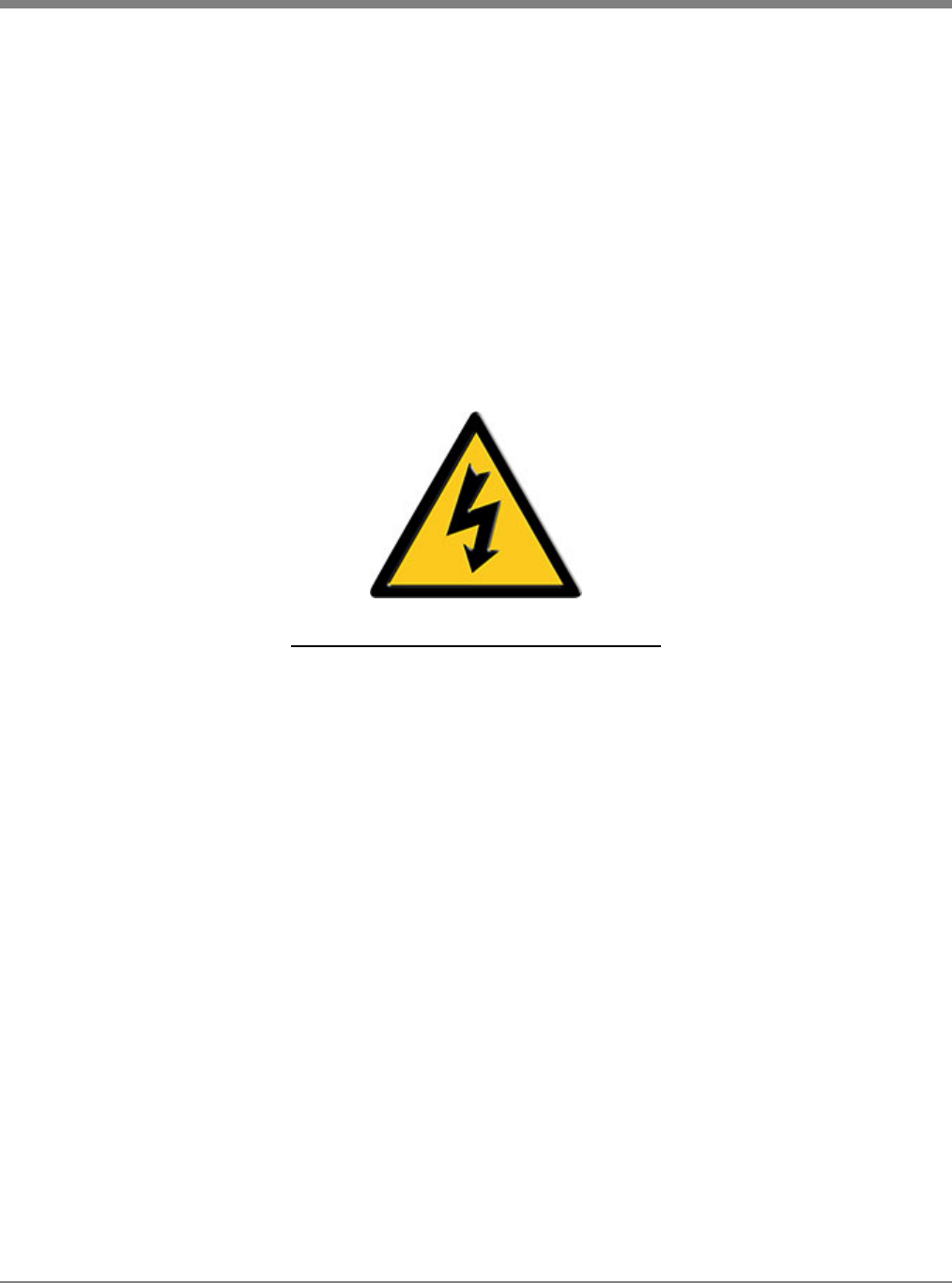
Datamatic, LTD. System Training Manual Version 08.24.12
- 8 - Confidential Datamatic, Ltd. 2012
FCC ID: VE4-GW2C-AC, VE4-GW2-D,ODYD4000, ODYD4100, and ODYD4111G
Datamatic, Ltd.
This device complies with Part 15 of the FCC Rules.
Operation is subject to the following two conditions:
1) This device may not cause harmful interference, and
2) This device must accept any interference received, including interference that may cause
undesired operation.
WARNING: These devices operate under Part 15 of the FCC rules. Modifications to these
devices not expressly authorized by Datamatic, Ltd. may affect your ability to legally operate
these devices.
Electrostatic Discharge (ESD) Warning
Electrostatic Discharge (ESD) is the enemy of electronic devices. You should always take precautions to eliminate any electrostatic charge
from your body and clothing before touching any semiconductor device or card by using an electrostatic wrist strap and/or rubber mat.
Static electricity can harm system boards. Perform installation at an ESD workstation and follow proper ESD precautions to reduce the risk
of damage to devices. Datamatic strongly encourages you to follow proper ESD procedure, which can include wrist straps and smocks,
when servicing equipment.
You can also take the following steps to prevent damage from electrostatic discharge (ESD):
o When unpacking a static-sensitive device from its shipping carton, do not remove the device’s anti-static packaging material until you
are ready to install the device. Just before unwrapping the anti-static packaging, be sure you are at an ESD workstation or grounded.
o When transporting a sensitive device, first place it in an antistatic container or packaging.
o Handle all sensitive devices at an ESD workstation. If possible, use anti-static floor pads and workbench pads.
Handle devices and boards with care. Don’t touch the devices or contacts on a board. Hold a board by its edges or by its metal mounting
bracket.
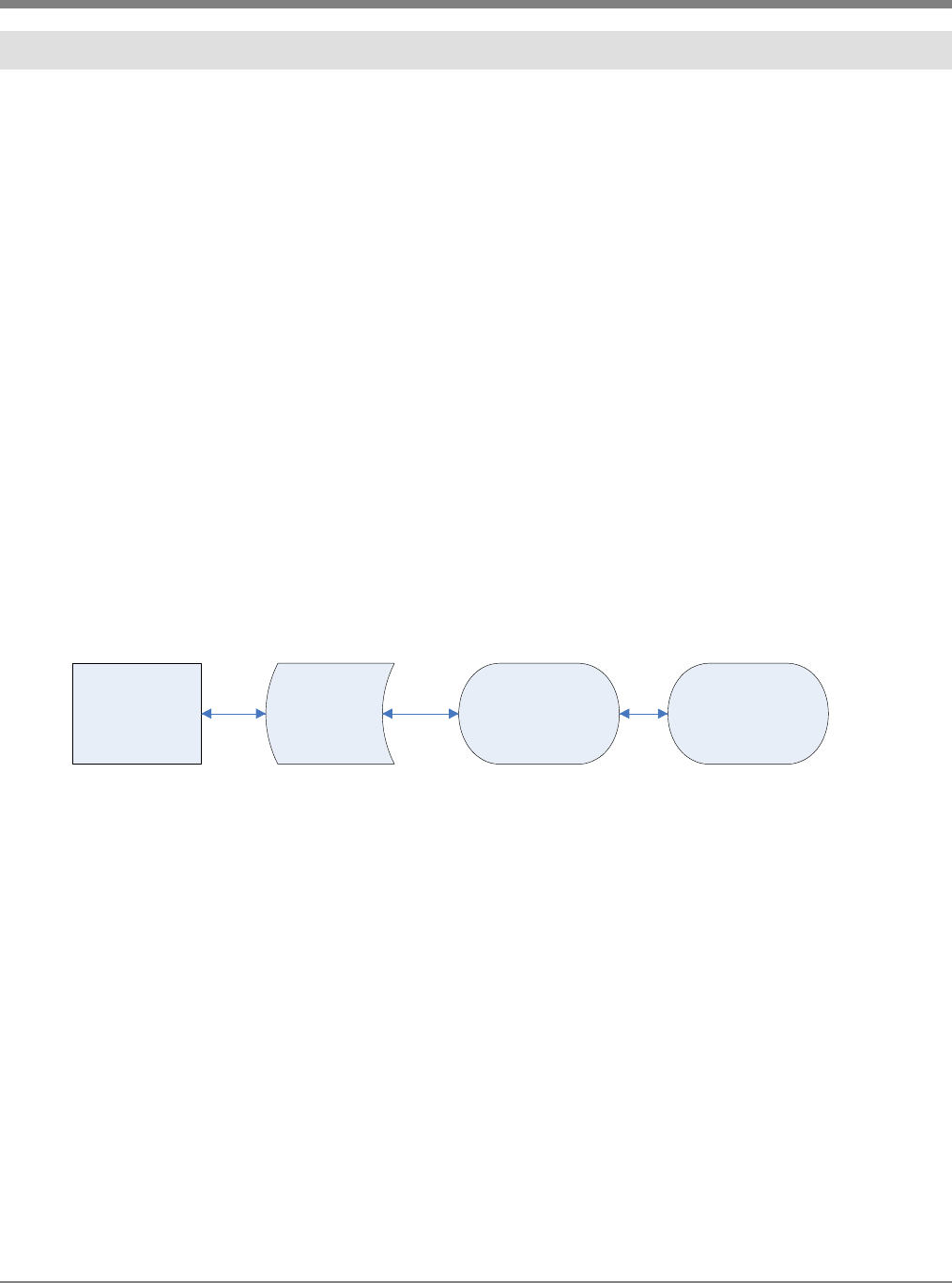
Datamatic, LTD. System Training Manual Version 08.24.12
- 9 - Confidential Datamatic, Ltd. 2012
Introduction
The Datamatic MOSAIC Mesh System is an automatic meter reading system designed for reading meter
data remotely and wirelessly. This is accomplished using the Datamatic MOSAIC Mesh system that
forms a mesh network with neighboring MOSAIC FIREFLYs and reports data to the MOSAIC Software
Interface through strategically placed MOSAIC Gateway devices.
MOSAIC FIREFLYs can be deployed using walk-by, mobile, and/or MOSAIC Mesh collection
platforms.
The main benefits of using The Datamatic MOSAIC Mesh system are:
• Real time access to meter reading data
• Built in logging of up to 320 days of hourly consumption data
• Meter lids do not have to be removed for reads
• Meter pits do not have to be dug out or pumped out for reads
• Safer meter reading procedure
• Visiting the site is not necessary for data collection
Please consult the MOSAIC Software Guide for user instructions regarding data access, configuring or
upgrading the MOSAIC Mesh FIREFLY System. After reviewing this guide you should be able to
successfully deploy the MOSAIC FIREFLYs for your system.
MOSAIC Software MOSAIC
Database MOSAIC Gateway MOSAIC
FIREFLYs
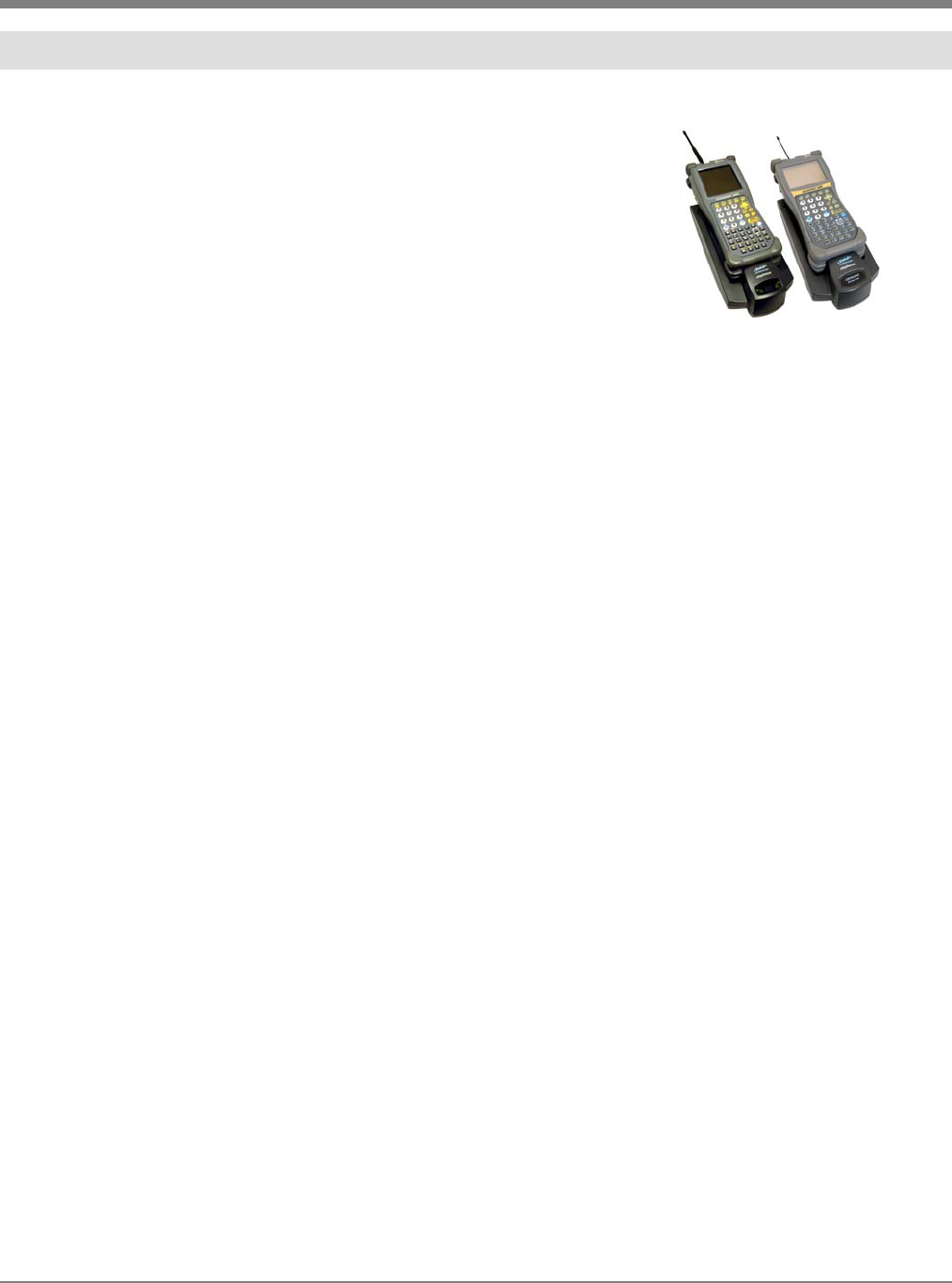
Datamatic, LTD. System Training Manual Version 08.24.12
- 10 - Confidential Datamatic, Ltd. 2012
Equipment
ROADRUNNER Handheld
The ROADRUNNER Radio Frequency Receiving Unit (RFRU)
receives and buffers radio readings, then downloads them to the
ROADRUNNER handheld unit when interrogated using the "I"
key.
The ROADRUNNER RFRU is an integrated, internal unit,
powered by a rechargeable NiCad battery pack.
MOSAIC FIREFLY
The MOSAIC FIREFLY tracks and transmits meter reading data. Each MOSAIC FIREFLY records up to
320 days of hourly consumption readings, thereby enabling the resolution of billing disputes. The
MOSAIC FIREFLY signal includes the meter reading, leak indicators and trouble codes upon detection.
(Refer to the troubleshooting section)
• Batteries: Dual 3.6-volt lithium-thionyl chloride D-cell
• Material: Polycarbonate
• Construction: silicon-lubricated gasket sealed tourqued to 12’ lbs
• Operating Temperature Range: -40 F to 185 F
• Radio Communication Frequency: 902-928 MHz frequency hopping spread spectrum
Unique Features
• Use existing meters
• Maintain the freedom to choose meters without the constraints of a proprietary AMR system
• Internally potted, gasket sealed and designed to withstand constant submersion
• Supports direct-read, pulse and encoded registers
• Leak Detection
• Tamper Detection
• Battery Status Indicator
• Above ground or through the lid installation
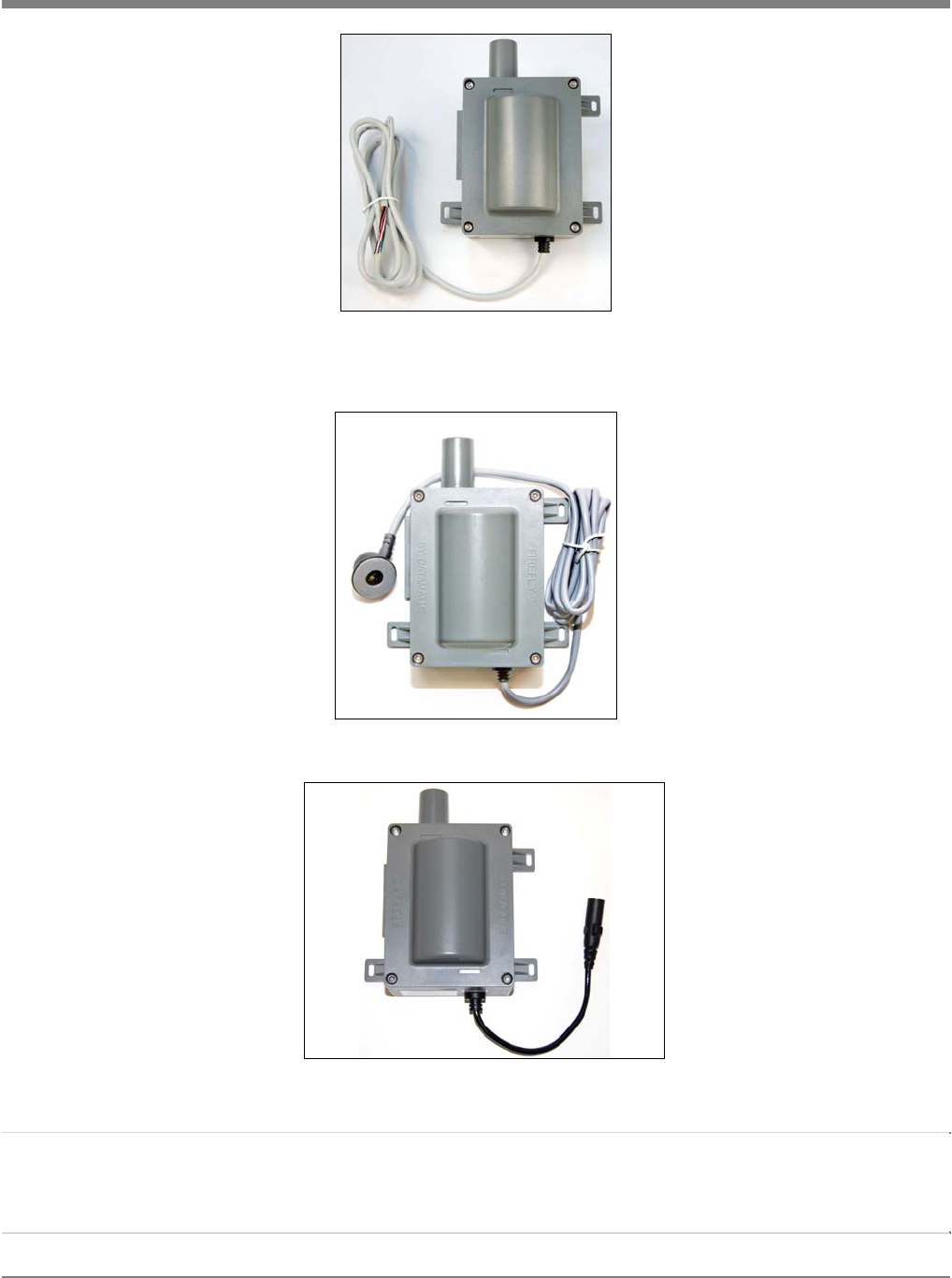
Datamatic, LTD. System Training Manual Version 08.24.12
- 11 - Confidential Datamatic, Ltd. 2012
Wire-end MOSAIC FIREFLY
Sensor-end MOSAIC FIREFLY
Nicor-end MOSAIC FIREFLY
Nicor-end FIREFLYs are connected to a Nicor-end register as follows:
Insert the pins from the FIREFLY's Nicor connector into the connector on the register side. Be careful not to
force the pins. Bent pins are not covered by the FIREFLY Warranty, so pay attention to proper alignment to
ensure a clean connection.
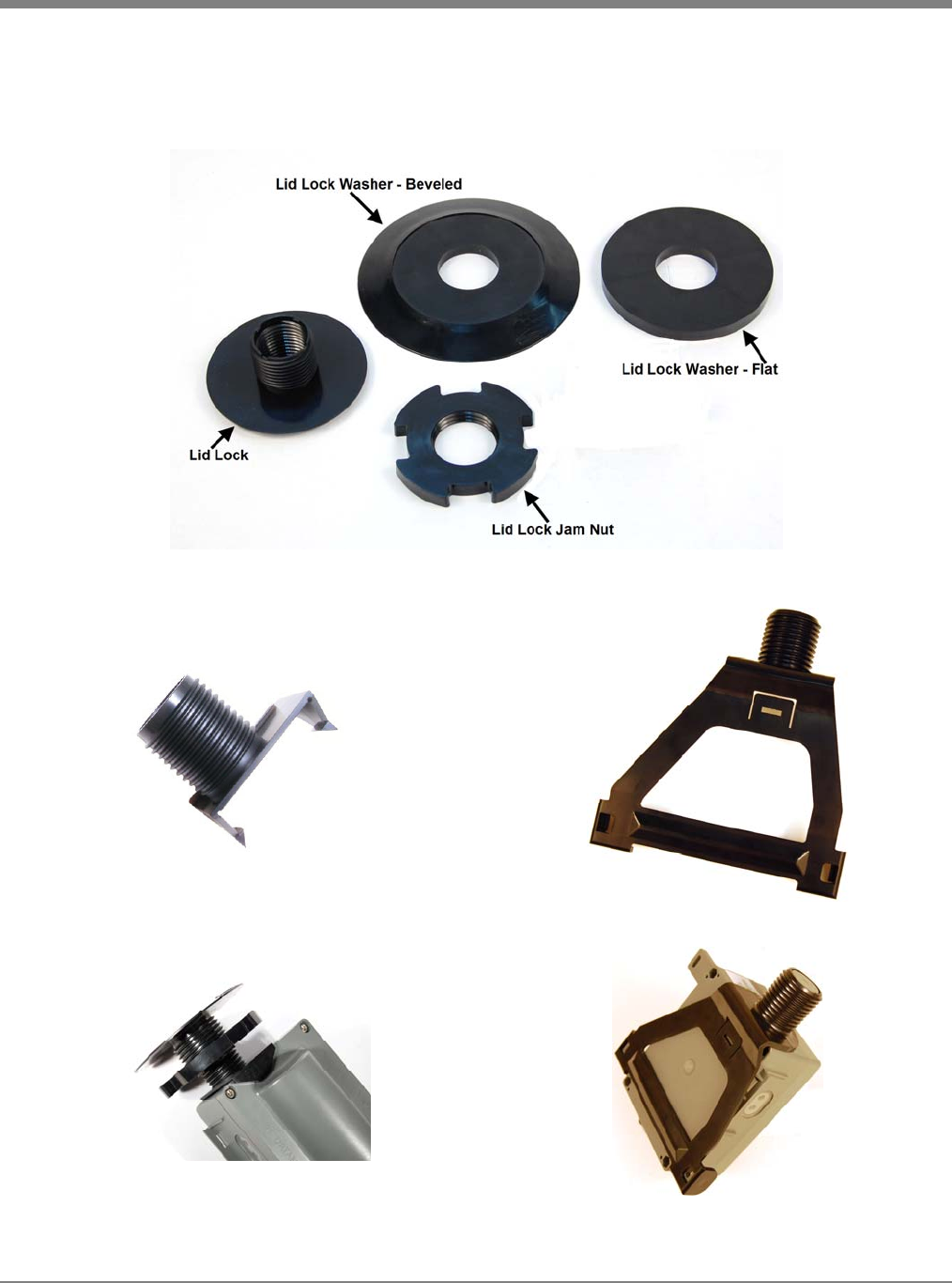
Datamatic, LTD. System Training Manual Version 08.24.12
- 12 - Confidential Datamatic, Ltd. 2012
Lid Lock
The preferred installation method in a water pit environment is to use the Lid Lock system. The Lid
Lock adapters hold the MOSAIC FIREFLY securely and allow the MOSAIC FIREFLY to be easily
screwed into the Lid Lock. There are two types of adapters available (as shown below).
Lid Lock Adapter for Dome Lid (MOSAIC)
Datamatic Product ID: 540018-0001 Lid Lock Adapter, MOSAIC A-Frame
Datamatic Product ID: USCMISTWATRLOCKAFR
MOSAIC FIREFLY with Lid Lock Adapter for Dome Lid
(MOSAIC) MOSAIC FIREFLY with Lid Lock Adapter, MOSAIC A-
Frame
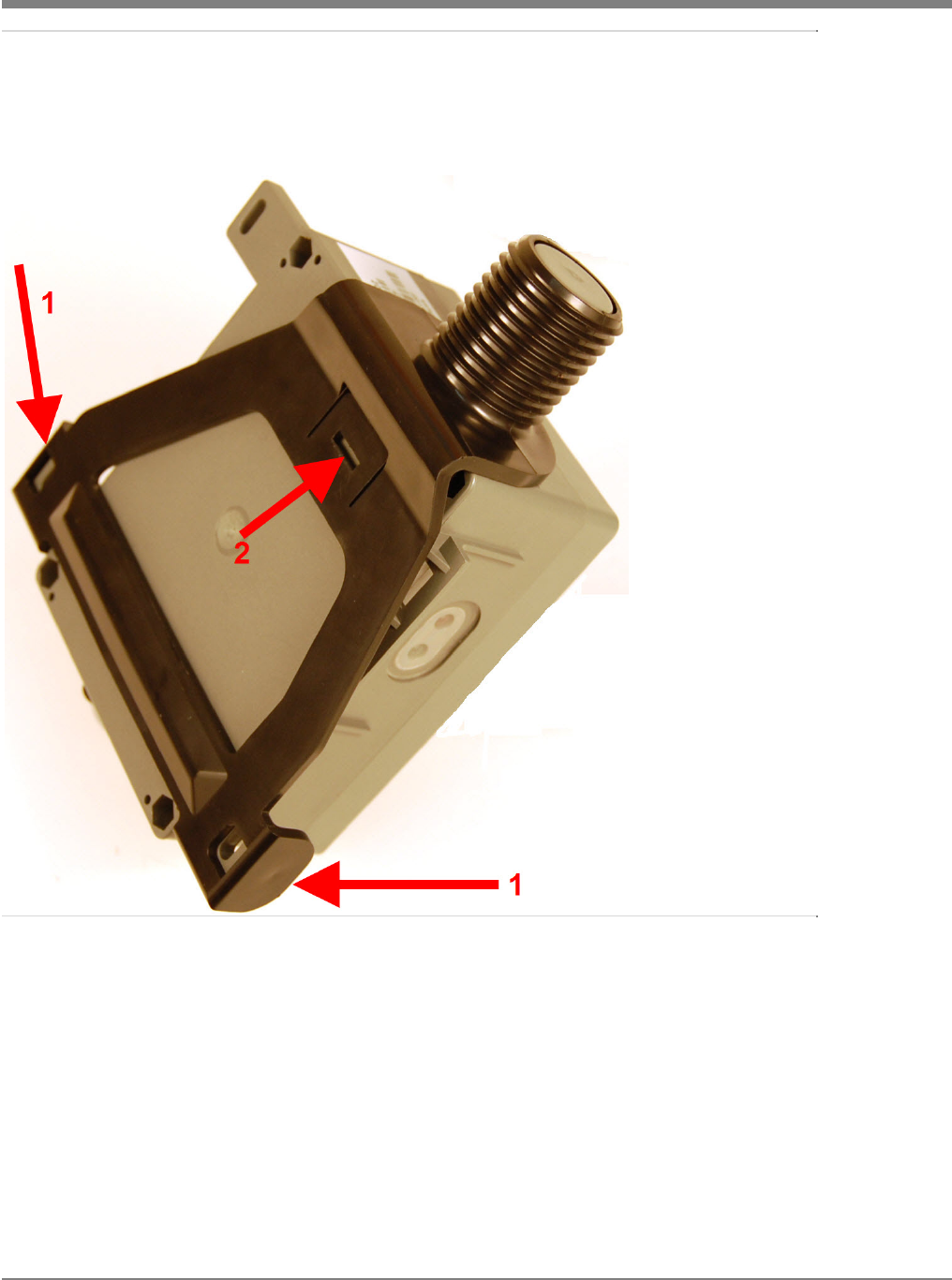
Datamatic, LTD. System Training Manual Version 08.24.12
- 13 - Confidential Datamatic, Ltd. 2012
NOTE: To properly remove the MOSAIC A-Frame Lid Lock Adapter from a FIRRFLY:
1 – Press outward on the feet of the adapter and slide the “feet” off of the FIREFLY tabs
2 – Lift the tab on the back of the adapter using a flat head screwdriver and slide the adapter off
the neck of the FIREFLY
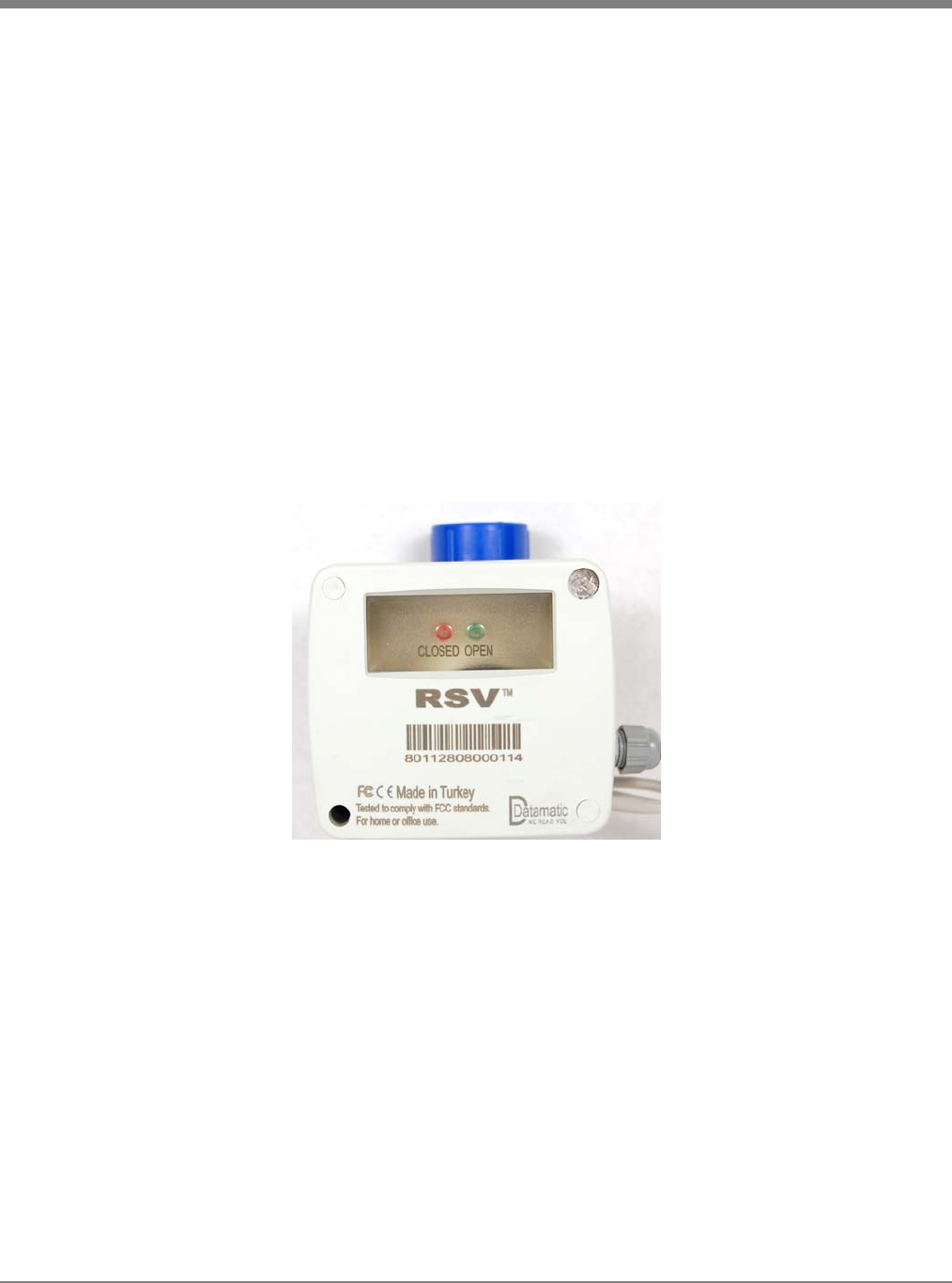
Datamatic, LTD. System Training Manual Version 08.24.12
- 14 - Confidential Datamatic, Ltd. 2012
Remote Shutoff Valve
The Remote Shutoff Valve (RSV) is used in conjunction with the MOSAIC FIREFLY (D411X only) to
control water service termination, providing utilities with a convenient method to deploy water shut-off
service. The FIREFLY can issue commands to the RSV to Open, Close, or report its current status
(open or closed).
There are three software/firmware components to the RSV system. These are ROADRUNNER
software, radio firmware, and the FIREFLY firmware. To ensure proper functionality of any RSV, the
units should be loaded with the minimum software/firmware listed below:
ROADRUNNER CE 3.26.4
Radio firmware 1.3.20
FIREFLY D4110 firmware 1.5.2
• Batteries: lithium battery pack with an output of 3.6V
• Construction: brass plated ball-valve with a non-corroding compound; able to operate at a 150
psi pressure and compliant with AWWA Standard C700-02, section 4.2.9
• Operating Temperature Range: -1 C to +60 C

Datamatic, LTD. System Training Manual Version 08.24.12
- 15 - Confidential Datamatic, Ltd. 2012
Installation Considerations
• Signal distance varies depending on the location of the MOSAIC FIREFLY. Those installed
above ground or through plastic lids generally transmit the greatest distance.
• The material of a pit or vault lid greatly affects the transmission range. For example, a
transmitter has a greater range sending from a pit with a plastic lid than a cast iron lid. A
FIREFLY mounted under any type of lid is subject to flooding. Since water impedes RF
transmission it is best to mount through the lid using a Lid Lock.
• Lids with holes of a diameter of roughly 1 ¾ inches make it possible to mount the MOSAIC
FIREFLY through the lid. This can increase transmission range significantly and protect against
loss of signal due to flooded pits. It is not recommended to install FIREFLYs under iron or
metal lids as RF performance is degraded.
• Complete field installation of a MOSAIC FIREFLY takes five to ten minutes, depending on the
meter location and mounting application.
• If the lid has a hole for the unit, use the Lid Lock, Lid Lock adapter, and appropriate washer.
Ensure that enough space exists between the meter box lid and the ground for the MOSAIC
FIREFLY to fit. If not, remove some of the dirt from the bottom of the meter. Do not over-
tighten Lid Locks.
• Some meters may be located in such a manner that they require the addition of repeaters to reach
the mesh.
• Some areas of your service territory may not have the density to warrant the use of the mesh -
your project manager will alert you to these areas where units can be placed into a drive-by
mode.
• Profile data uses more mesh bandwidth and as such can require the use of additional repeaters
and/or Gateways.
• The system requires ongoing maintenance - make sure to have the proper equipment and training
to maintain the system after your installation contractor leaves.
• Do not attempt to repair or trouble-shoot equipment without the proper equipment and training.
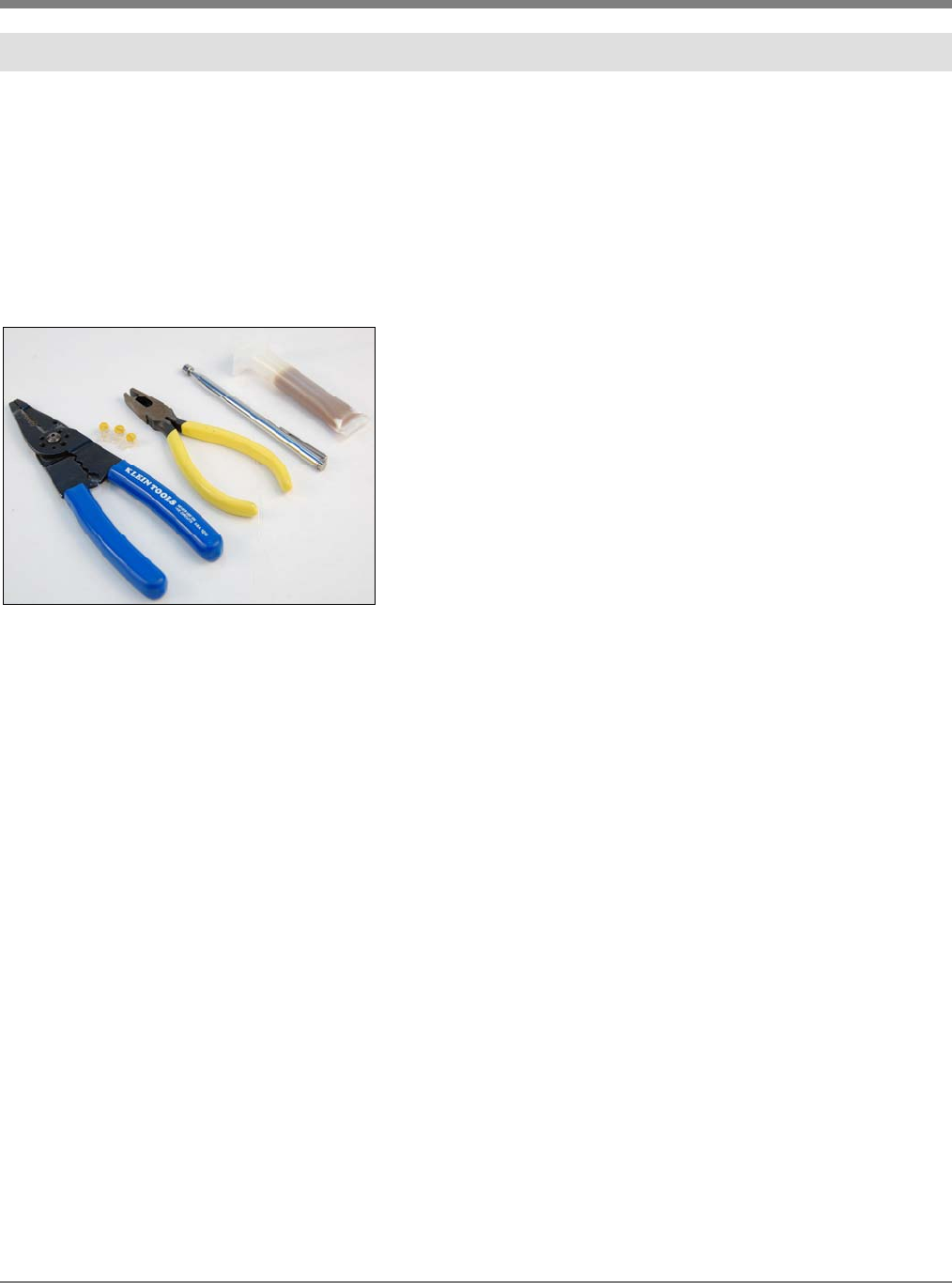
Datamatic, LTD. System Training Manual Version 08.24.12
- 16 - Confidential Datamatic, Ltd. 2012
Installation Supplies
Basic Supplies
• Klein Crimping Tool – Part No. D2346
• Wire Stripper
• Zip ties, White 14”
• 4 lb pull telescoping magnet
• Lid Lock
• 3M IDC Connector
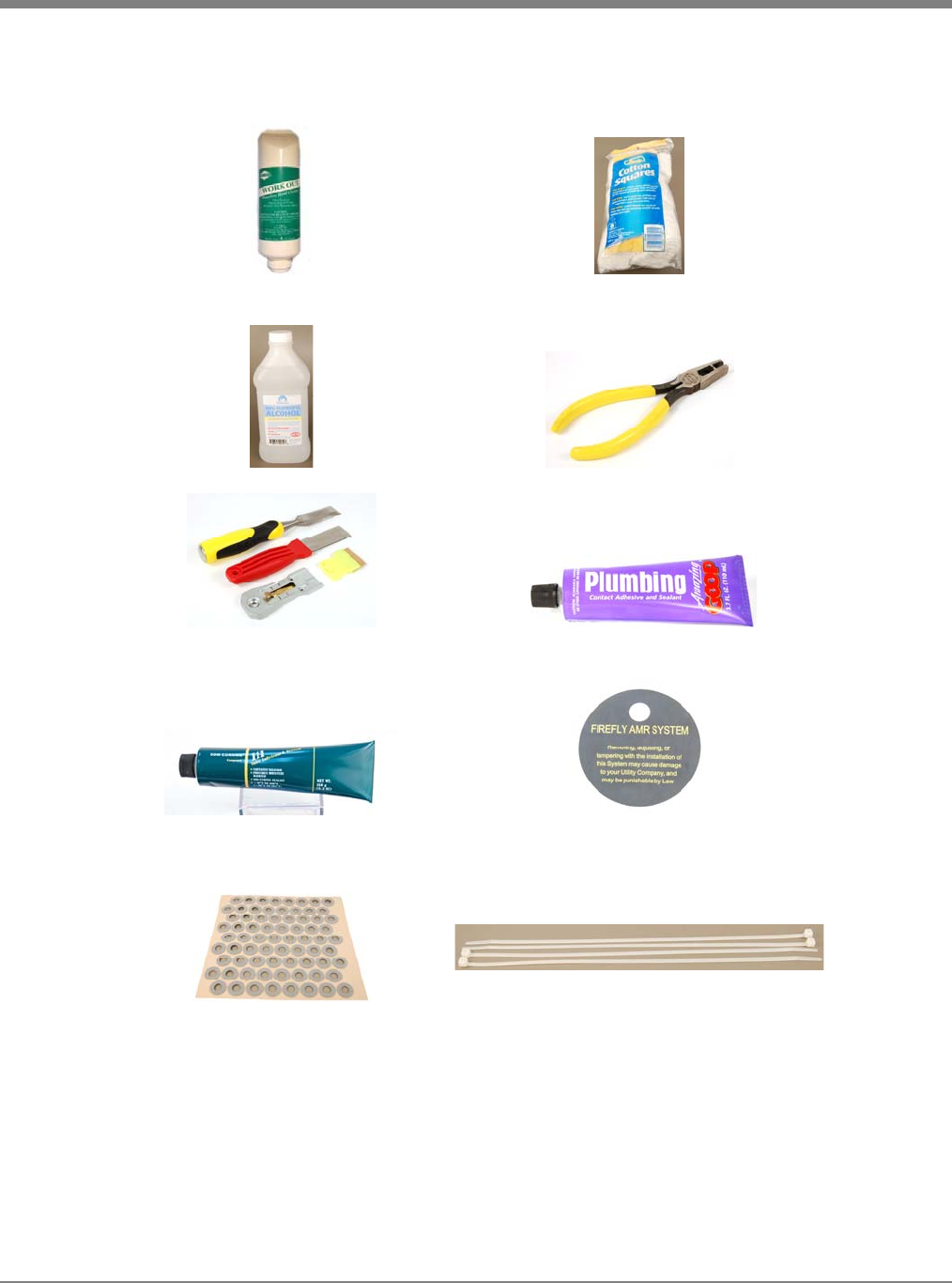
Datamatic, LTD. System Training Manual Version 08.24.12
- 17 - Confidential Datamatic, Ltd. 2012
Water Sensor-end FIREFLY Installation Supplies
Basic Supplies:
Below is an illustration of materials used with Sensor-end installations:
Work Out Waterless Hand
Cleaner Lint Free Cotton Squares
99% Isopropyl Rubbing Alcohol Wire Cutter (for cutting zip ties)
Razor blade tool or chisel (for
cleaning meter faces) Plumber’s Goop Adhesive #15112
(Purple Tube)
DOW CORNING 111
Compound
Unit of Measure: 5.3 oz. Tube
Sensor flaps
3M Adhesive Replacements Zip Ties—14”
Additional supplies: Cloth Rags, ¾” PVC pipe; sch. 40
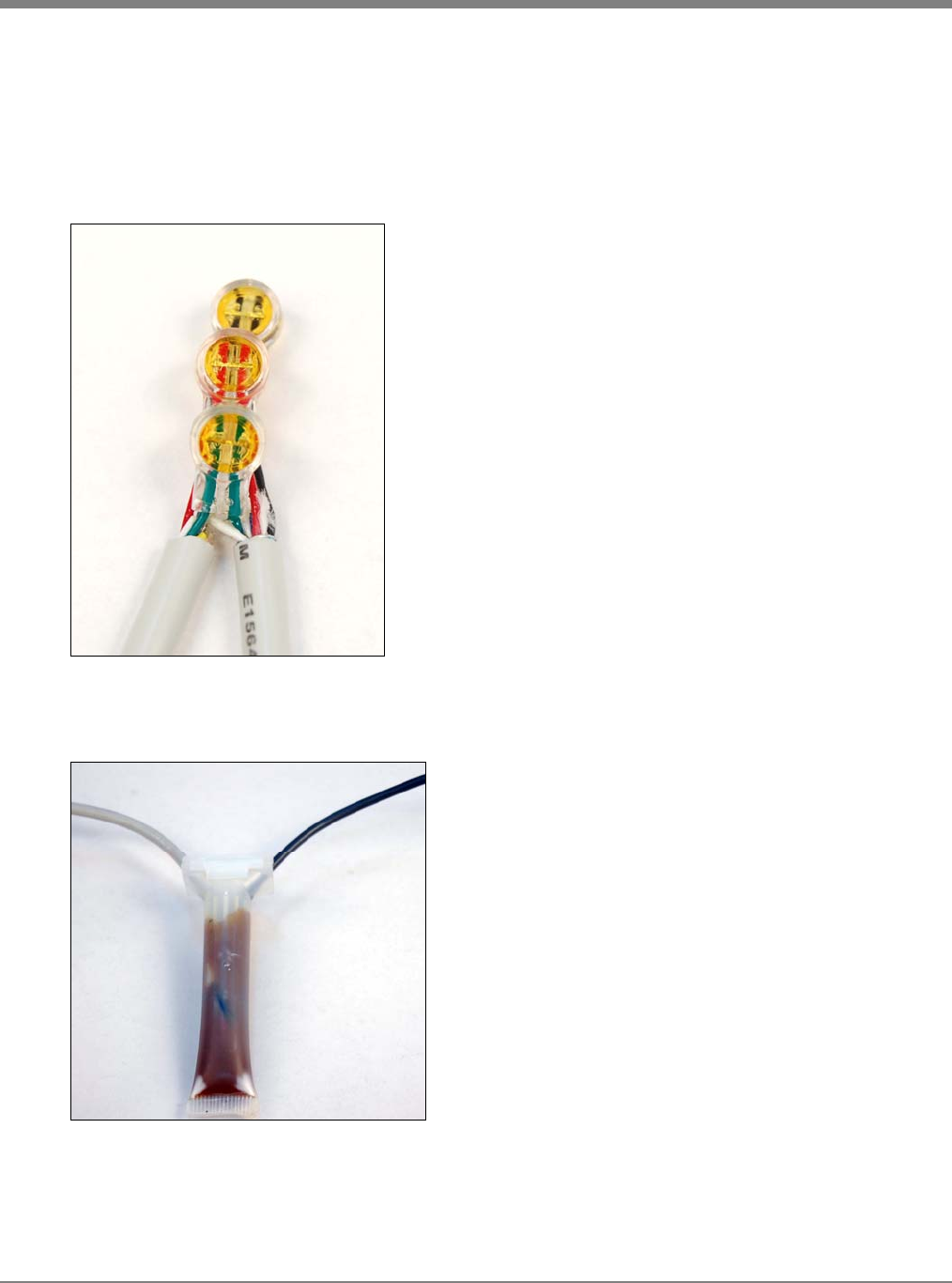
Datamatic, LTD. System Training Manual Version 08.24.12
- 18 - Confidential Datamatic, Ltd. 2012
Water Wire-end FIREFLY Installation / Pit Splice Supplies
Following is a list of materials required to install a wire-end MOSAIC FIREFLY using the Water Pit
Splice technique:
UY Connectors
• 3M IDC Connector – Yellow Part No. 34-7035-9854-9
(use only approved crimping tool - Klein Crimping Tool – Part No. D2346)
Burial Pod
• 3M Direct Burial Splice Pod – Part No. 054007
DOW CORNING
Valve lubricant (for direct-connect only)
• MFG. Model # 111
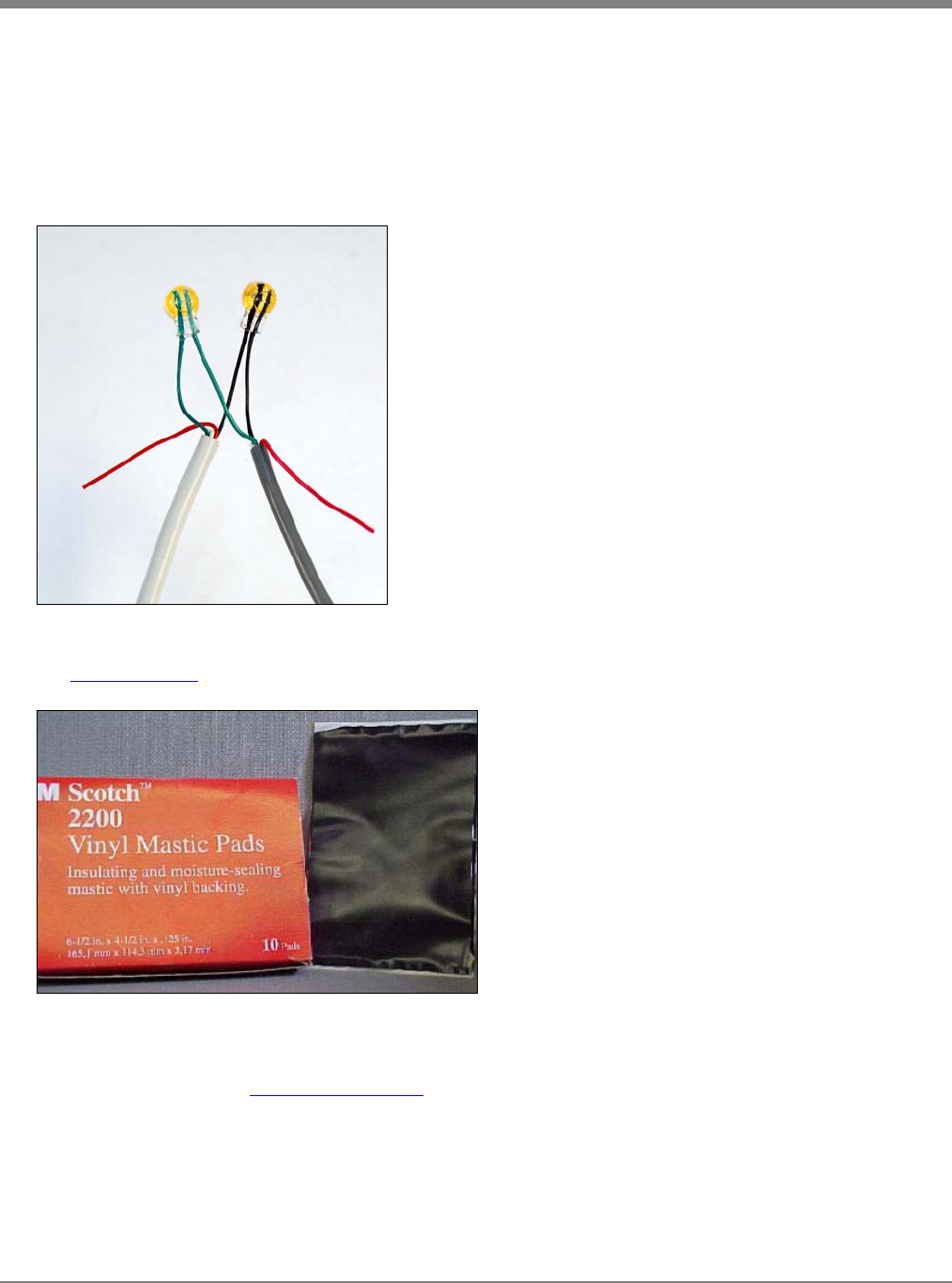
Datamatic, LTD. System Training Manual Version 08.24.12
- 20 - Confidential Datamatic, Ltd. 2012
Basement Splice Supplies
Following is a list of materials required to install a wire-end MOSAIC FIREFLY using the Basement
Splice technique:
UY Connectors
• 3M IDC Connector – Yellow Part No. 34-7035-9854-9
(use only approved crimping tool - Klein Crimping Tool – Part No. D2346)
3M Scotch 2200 Vinyl Mastic Pads
• www.3m.com (to locate local distributor)
Note: Supplies for installation can be purchased from:
Grainger Industrial Supply www.grainger.com Call toll-free at 1-888-361-8649, 24 hours a day, 7 days a
week.

Datamatic, LTD. System Training Manual Version 08.24.12
- 21 - Confidential Datamatic, Ltd. 2012
FIREFLY Menu Screen
Select the FF Menu key on the ROADRUNNER CX to access these options:
1. Define Templates
(Setting this up saves time during the programming process. Please see Appendix
A – F for details.)
2. Program by Template
(Use to program the FIREFLY. Please see Programming the Sensor-end
MOSAIC FIREFLY and Programming Wire-end MOSAIC FIREFLY sections
below.)
3. Program by Parameter
(Use to reprogram a FIREFLY’s individual parameters settings.)
4. View Settings
(Allows the user to view all current parameters of that FIREFLY.)
5. Extract Profile Data
(Extracts reading, saves consumption. This is the FIREFLY’s history. Please see
the Extract Profile Data section below.)
6. Set Reading Mode
(Determines the way you will read the FIREFLYs. Please see the Pre-
Installation Setup section below.)
7. Program GPS Coords
(Use to program GPS coordinates to a FIREFLY or Gateway. Please see the
Program GPS Coordinates section below.)
8. Capture Config
(To manually capture configuration ‘programming’ data at any time.)
9. Options
(Use to set options for the ROADRUNNER. Please see the Options section
below for details.)
A. Operate RSV
(Use to operate a Remote Shutoff Valve connected to a FIREFLY. Please see the
Operate RSV section below for details.)
B. Set Phy Fram
(Sets the phy fram value)
C. Define AutoCAL Rules
(Use to set rules the FIREFLY must meet during AutoCAL. Please see the Pre-
Installation Setup section below.)
D. Set FF To Ship Mode
(Sets the FIREFLY to Ship mode. Please see the Set FF To Ship Mode section
below for details.)

Datamatic, LTD. System Training Manual Version 08.24.12
- 22 - Confidential Datamatic, Ltd. 2012
E. Clear Flags
(Use to clears flags in the FIREFLY.)
F. Upgrade Firmware
(Use to load firmware images to the FIREFLY and OREO. Please see the
Upgrade Firmware section below for details.)
G. Set FF Date/Time
(Set the FIREFLY date and time. Please see the Set FF Date/Time section below
for details.)
H. View MESH Neighbors
(Please see the View MESH Neighbors section below for details.)
I. Set Radio Port
(Please see the Set Radio Port section below for details.)
X. Exit
(Exit out of the FIREFLY Menu.)

Datamatic, LTD. System Training Manual Version 08.24.12
- 23 - Confidential Datamatic, Ltd. 2012
Programming MOSAIC FIREFLYs
Pre-Installation Setup
#1 Verify the ROADRUNNER Date / Time / and Time Zone settings are correct
Refer to the ROADRUNNER Pocket Guide for step-by-step instructions.
#2 [F5-1] Set your FIREFLY Template:
See Appendix A through F for specific Template parameters
The “Desired Firmware” template option can be utilized to specify the version of firmware that
should be loaded to each FIREFLY being programmed. When setup, this feature will
automatically detect the current FIREFLY firmware version and load the “Desired Firmware”
version during FIREFLY programming if the two values do not match.
#3 [F5-6] Set the Reading Mode
Set the FIREFLY mode to Verify FF Read
Set Reading Mode options include the following:
“Single FF Read” allows the user to interrogate a single non-mesh FIREFLY (selected on the
ROADRUNNER) during the time it is configured to accept reading requests.
“Verify FF Read” allows the user to Read Verify the physical meter reading against the non-
mesh FIREFLY reading during the time the non-mesh FIREFLY is configured to accept reading
requests.
“Multi FF Read” allows the user to interrogate all non-mesh FIREFLYs (in the current route on
the ROADRUNNER) during the time they are configured to accept reading requests.
NOTE: After a read is taken in Multi FF Read mode, the FIREFLY enters a
dormant state for 10 minutes. This is done to reduce the amount of RF traffic.
The FIREFLY will not respond to commands during this dormant time.
#4 [F5-9] Check the Options Screen
(Please see the Options section below for an explanation of all Options.)
Check the options screen from the FIREFLY Menu for the following:
1) FIREFLY Support Mode = MOSAIC Mode
2) Capture Data = Enabled
3) Delta Warning = 2
4) Truncation = Enabled
5) Connection ID Method = Serial Number (*NOTE* the first time a FIREFLY is programmed, the
connection method must be set to serial number)

Datamatic, LTD. System Training Manual Version 08.24.12
- 24 - Confidential Datamatic, Ltd. 2012
6) Radio Communication Mode = __________________________
(Mesh or Non-Mesh / FNCTN [blue key] + C to toggle)
7) GPS Format = _______________________________________
8) GPS Longitude Location = _____________________________
9) GPS Latitude Location = _______________________________
10) Radio Data Mode = Binary
11) Gas Read View = DISREGARD
12) Multi-Read Sleep Int. = ________________________________
13) Firmware Update Method = RLOAD
14) Image File Naming Convention = _______________________
#5 [F5-B] Check the Phy Fram setting
The Phy Fram is the setting the radio inside the ROADRUNNER uses to communicate with the
FIREFLY. The radio and FIREFLY must be on the same setting to communicate. The default Phy
Fram for all FIREFLYs is B4D2B4D2. If you are not sure what your phy fram value is, please contact
Datamatic Customer Support.
#6 [F5-C] Check the AutoCAL Rules (applies to Sensor-end FIREFLYs only)
Check the AutoCAL Rules screen for the following:
1) Minimum Dip – 18
2) Minimum Background – 60
3) Maximum Background – 225
4) Primer Threshold – 10
5) Maximum Threshold – 50
6) Dip Multiplier – 43%

Datamatic, LTD. System Training Manual Version 08.24.12
- 25 - Confidential Datamatic, Ltd. 2012
Installing the Sensor-end MOSAIC FIREFLY
The Datamatic Sensor FIREFLY for water meter applications relies on pulses of infra-red light emitted
by the sensor head four times a second and are directed at the face of the register dial. Sensors in the
head then read the infra-red light pulses reflected off the register face to determine if the needle has
passed underneath the sensor head. The successful sensing of the needle passage then depends on the
unrestricted light transmission from the light-emitting source in the sensor, through the air between the
source and the register lens, the register lens, the atmosphere in the register, the reflectance of the
register dial face and the reflected light’s transmission back through those elements to the sensor. The
performance of the Datamatic Sensor FIREFLY for water meter applications could be affected unless
the following requirements are maintained:
• Register lens face must be free of scratches to allow for a permanent, water-tight seal with the
sensor.
• Register lens material must be clear, free of cloudy imperfections or milky tones, etc.
• Register must have a solid colored, radius-type needle (no full-diameter needles).
• Register must be permanently sealed, with a completely dry register cavity - no water, moisture
or dirt or humidity fogging can be present in the register.
• Register conditions must allow for the Datamatic Sensor FIREFLY to generate a minimum
background value of 100.
Note - There will be a percentage of meter registers in every system, depending on age and condition of
meters, which may require replacement based on failures of above in order to support the Sensor
FIREFLY. You should incorporate these requirements in your ongoing water meter maintenance
program.
The 4 P’s of Installation
1. Preparation
2. Placement
3. Pressure
4. Programming
#1 Preparation of the Meter
a) Remove meter box lid and check for meter serial number.
b) Survey the meter, checking lid, hole depth, and overall cleanliness.
c) Check for meter disqualification. Enter the corresponding skip code if necessary.
d) Place sensor flap onto FIREFLY cable.
e) Flip lid back and pre-clean meter face/lens using Work Out Waterless Hand Cleaner or Fast
Orange non-pumice cleaner and a cloth or cotton swab to remove residue.
f) Clean meter face/lens with 99% isopropyl alcohol and a NEW lint-free cotton swab.
g) Re-wipe the surface of the meter lens with a clean, new cotton swab each time until the swab
comes up clean, and the clean lens squeaks when wiped.
h) After cleaning, ensure that the lens is completely dry; allow time for the alcohol to evaporate.
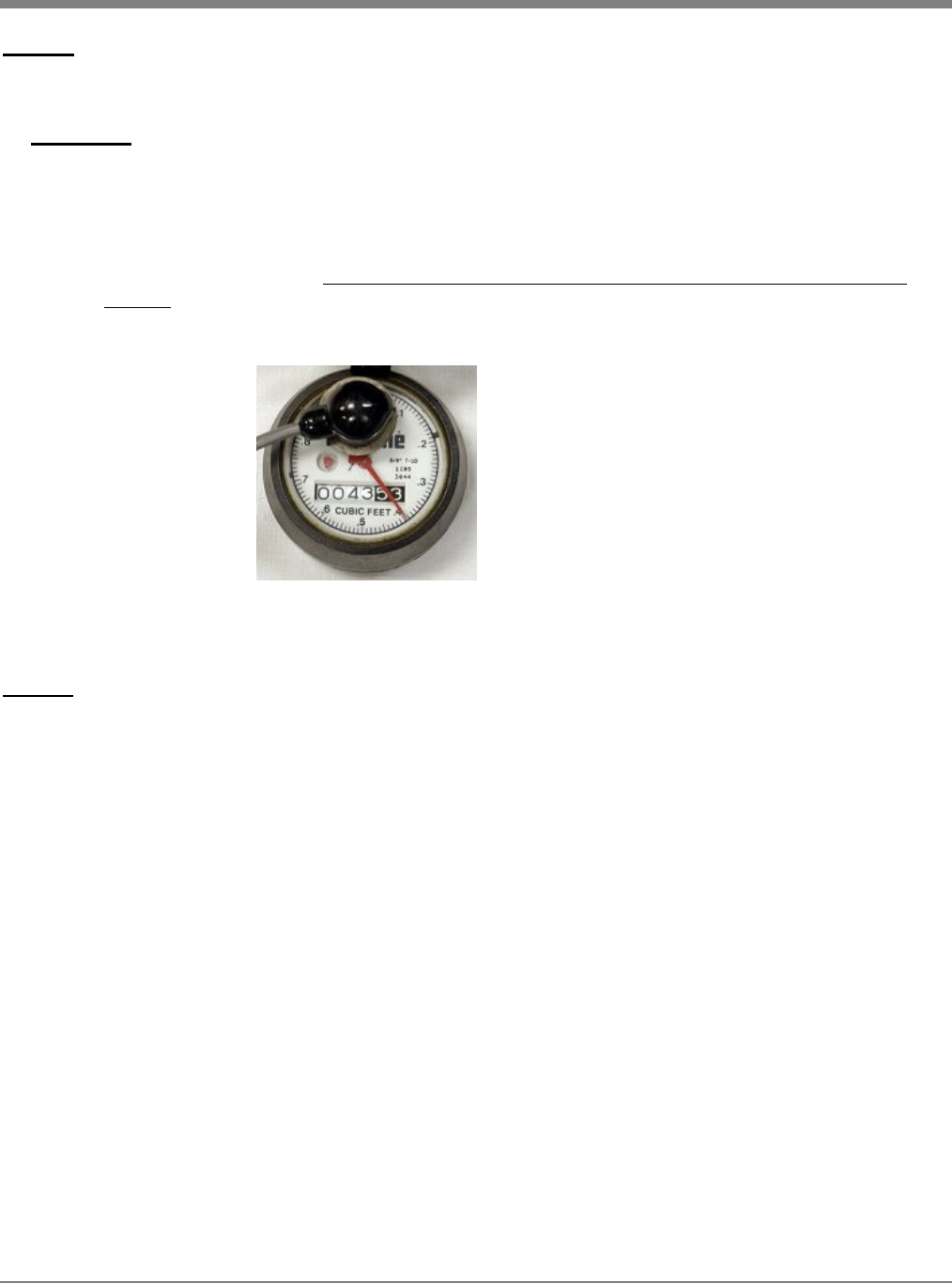
Datamatic, LTD. System Training Manual Version 08.24.12
- 26 - Confidential Datamatic, Ltd. 2012
NOTE: Only use isopropyl rubbing alcohol marked “99% by volume”. Lower concentrations, such as
the commonly available 91%, do not clean or evaporate well and adversely affect sensor-to-meter bond.
#2 Placement of the Sensor
a) Insert sensor cable through sensor flap.
b) Remove the adhesive backing from the high-bond tape on the optic sensor face.
c) Orient the sensor so the water meter needle approaches the sensor from the cable side and
perpendicular to the cable. There are marks on each side of the sensor base that are to be in line with
the needle when it passes. Do not place the sensor over any moving part or the sweep hand of the
register. Normally, place sensor along outer edge of register.
Here is an example of correct Sensor Placement
:
#3 Pressure – To the Sensor on the Meter
NOTE: Since the 3M tape provides a pressure sensitive seal, the installer must apply 15 lbs. of
pressure to the FIREFLY optical sensor immediately after attaching to the lens surface for a minimum
of 60 seconds.
a) Very Important: Press the adhesive down for 60+ seconds using 15 lbs of pressure. Allow
24-96 hours to cure.
b) Fasten the cable to the register with a zip tie.
c) Place DOW CORNING 111 Compound or Goop-Plumber’s Adhesive #15112 (purple tube)
around the edge of the sensor and under the tail of the sensor. Do not squirt the adhesive
UNDER the 3M seal. The goal is to provide a temporary water barrier between the meter
face and the edge of the sensor, so that the 3M adhesive can cure properly.
d) Position the flap at the base of the sensor so that it folds over and “hangs” above the register
to try to keep most of the stray light out while it processes through AutoCAL. The flap will
be “pulled” over the sensor snuggly lying flatter on the meter during the Read and Verify
procedure that will be discussed later.
#4 Programming (see below)
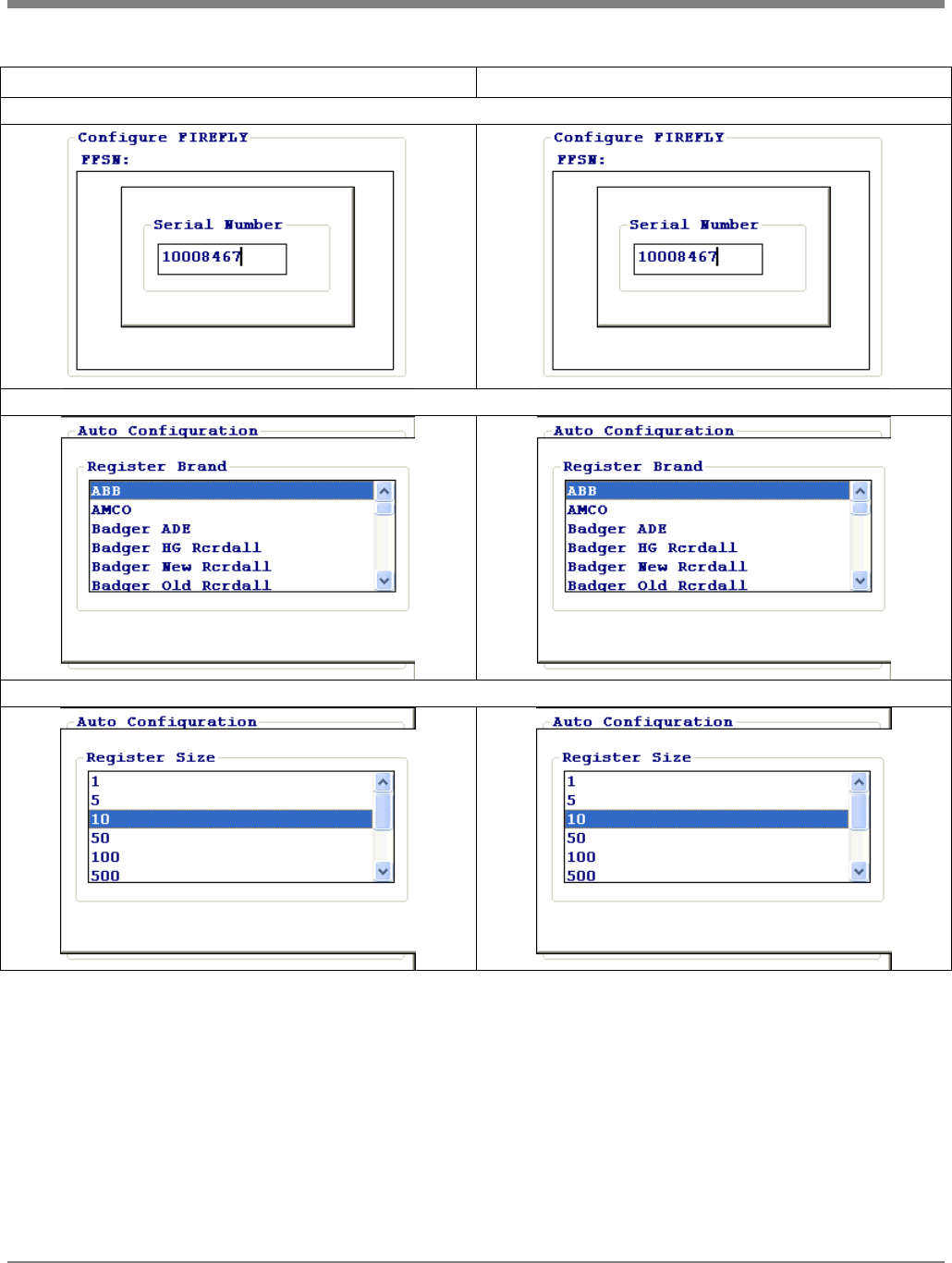
Datamatic, LTD. System Training Manual Version 08.24.12
- 27 - Confidential Datamatic, Ltd. 2012
Programming the Sensor-end MOSAIC FIREFLY
Mesh Mode Non-Mesh Mode
FFSN
Register Brand
Register Size
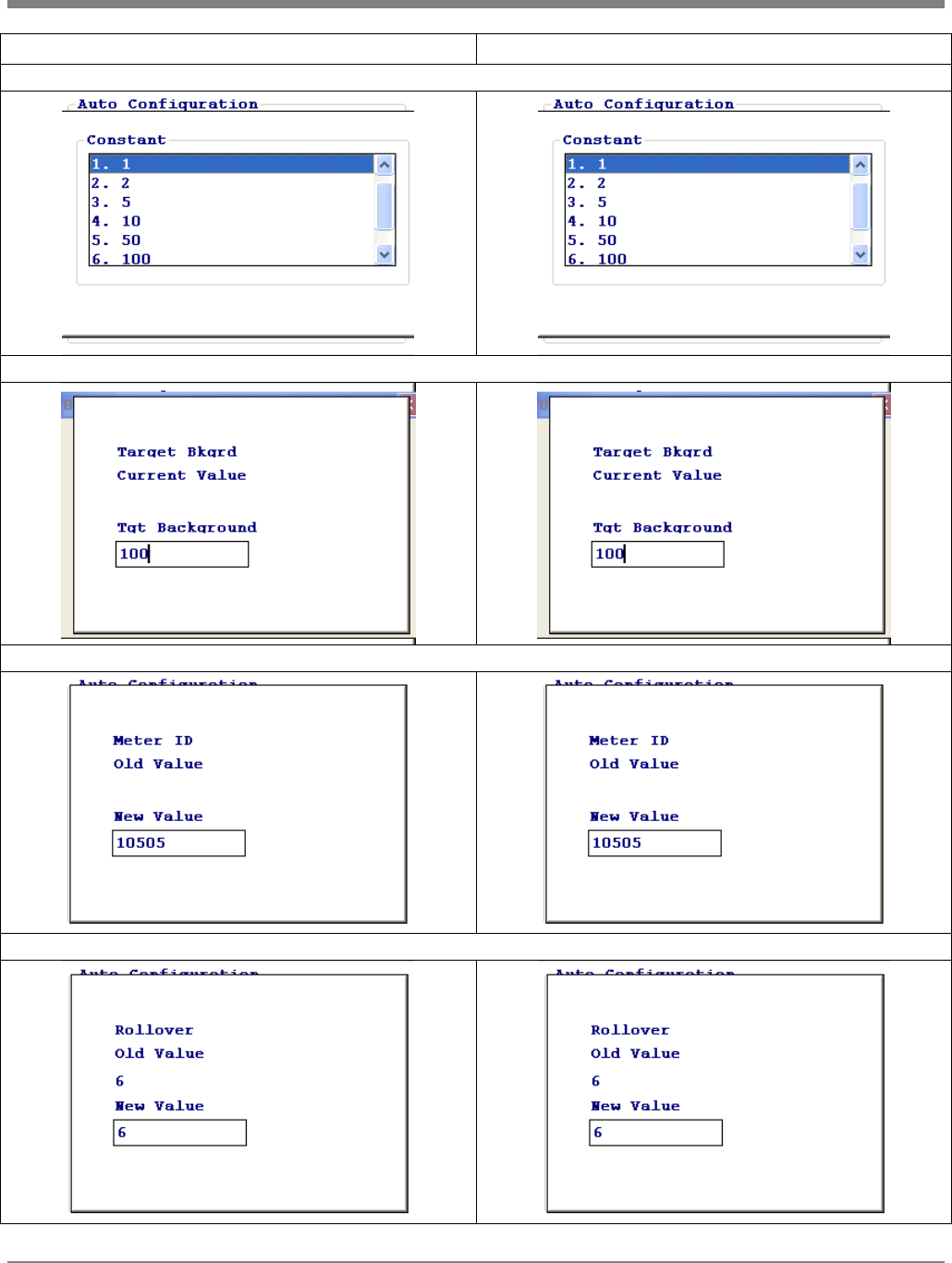
Datamatic, LTD. System Training Manual Version 08.24.12
- 28 - Confidential Datamatic, Ltd. 2012
Mesh Mode Non-Mesh Mode
Constant
Target Background
Meter ID
Rollover
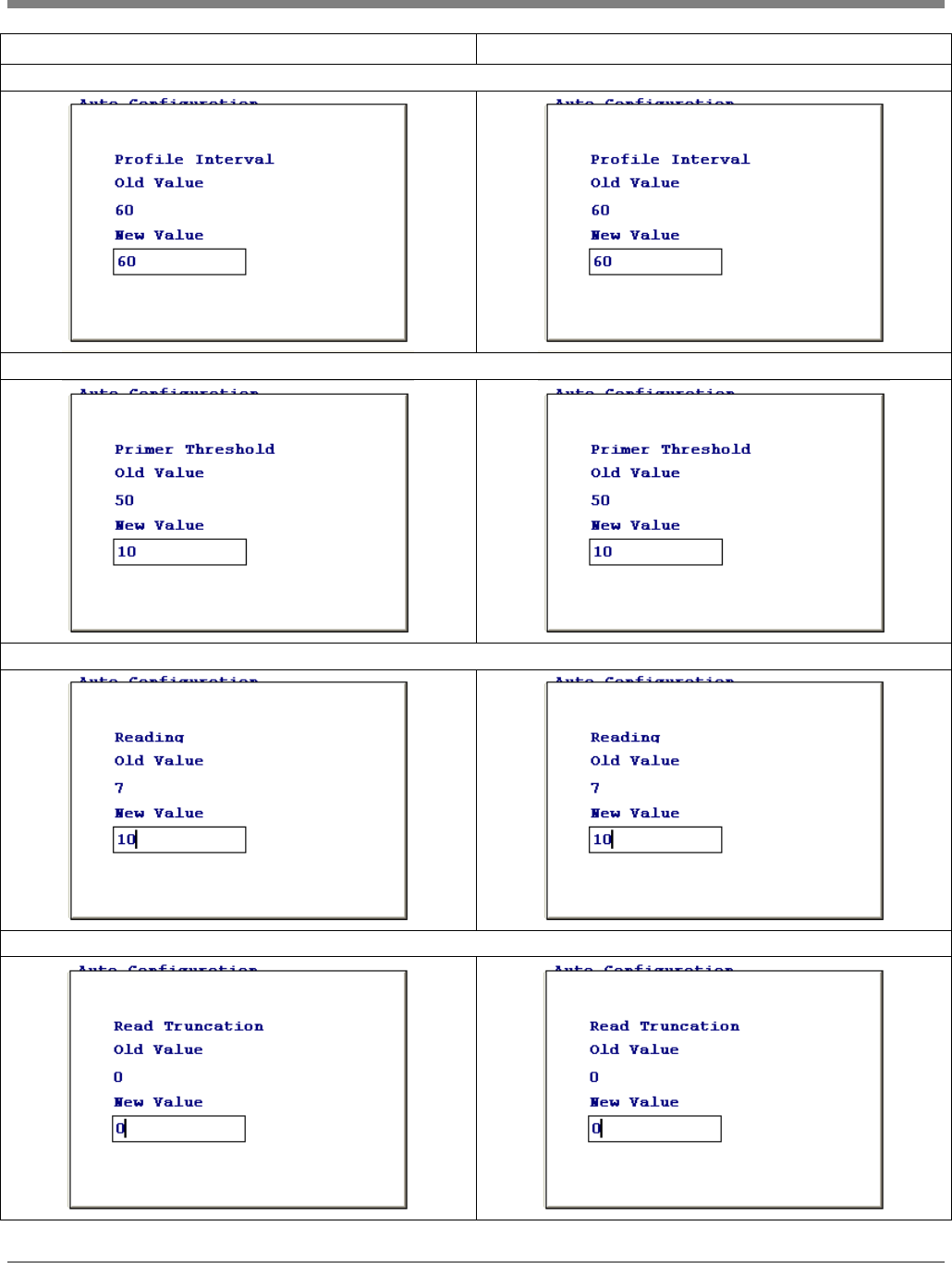
Datamatic, LTD. System Training Manual Version 08.24.12
- 29 - Confidential Datamatic, Ltd. 2012
Mesh Mode Non-Mesh Mode
Profile Interval
Primer Threshold
Reading
Read Truncation
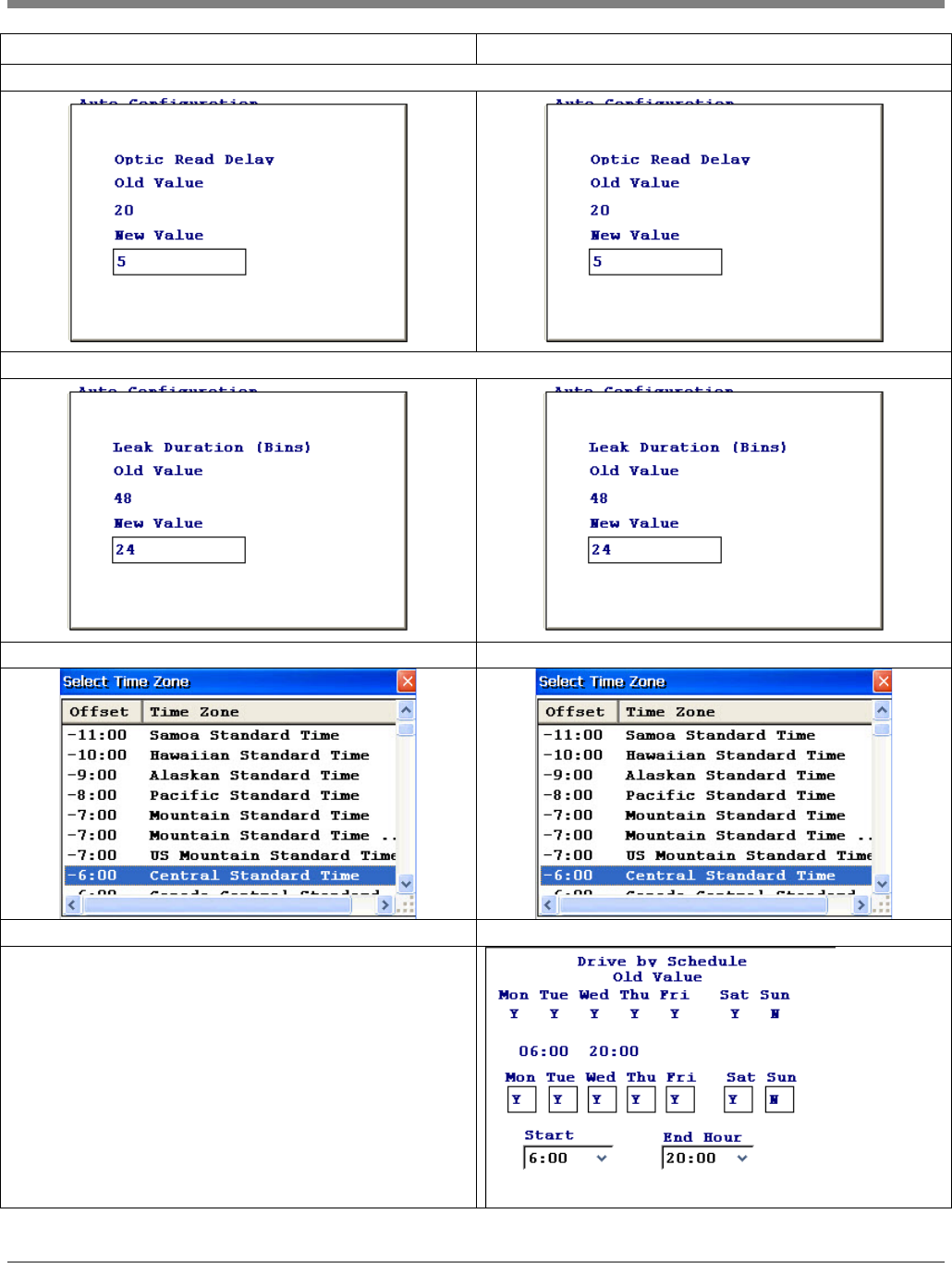
Datamatic, LTD. System Training Manual Version 08.24.12
- 30 - Confidential Datamatic, Ltd. 2012
Mesh Mode Non-Mesh Mode
Optic Read Delay
Leak Duration (Bins)
Select Time Zone Select Time Zone
Drive by Schedule
Drive by Schedule is not required for Mesh
FIREFLYs.
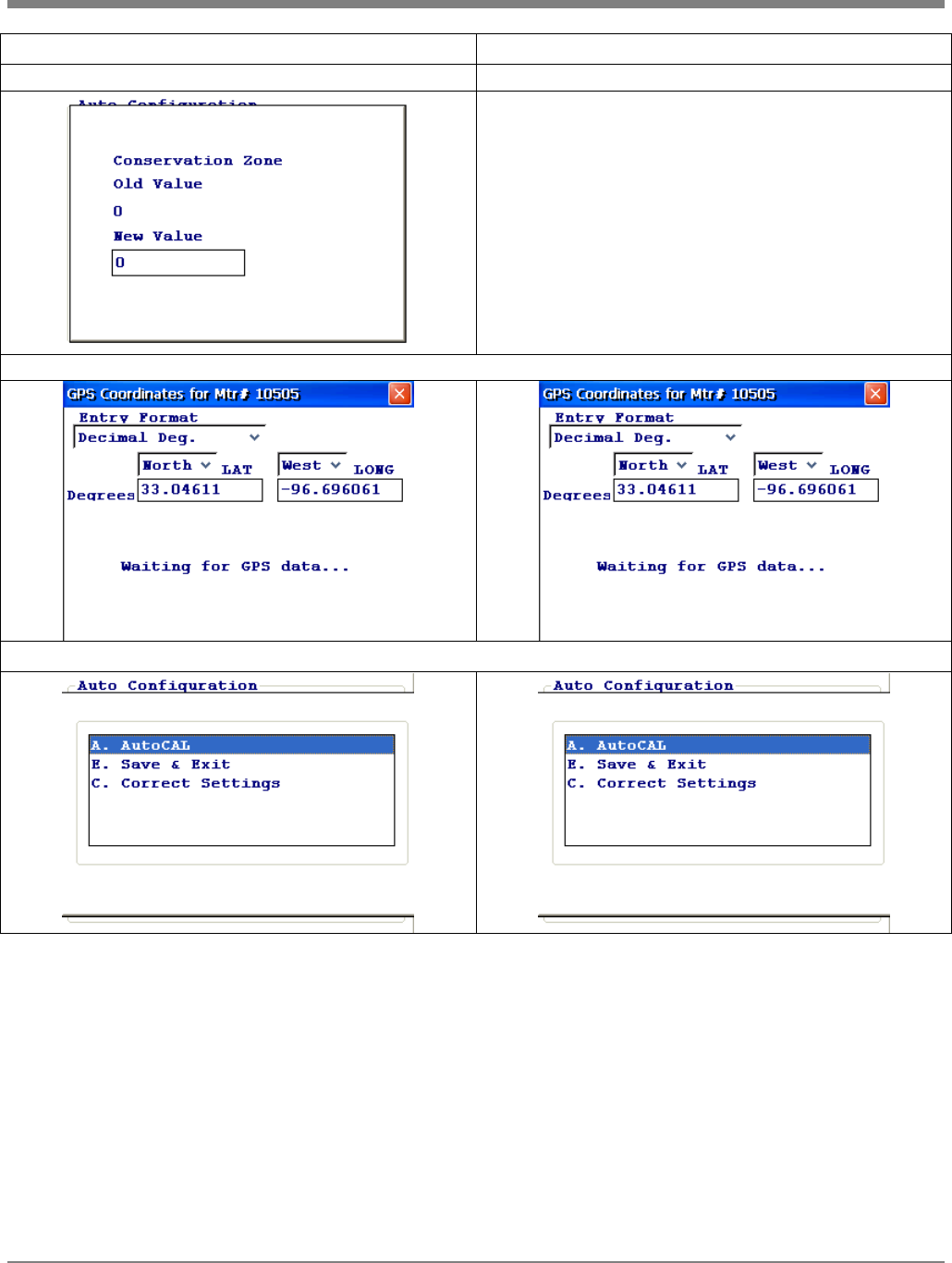
Datamatic, LTD. System Training Manual Version 08.24.12
- 31 - Confidential Datamatic, Ltd. 2012
Mesh Mode Non-Mesh Mode
Conservation Zone
Conservation Zone is a Mesh function at this time.
Please contact Datamatic Project Management to
discuss this option.
GPS Coordinates
Enter AutoCAL
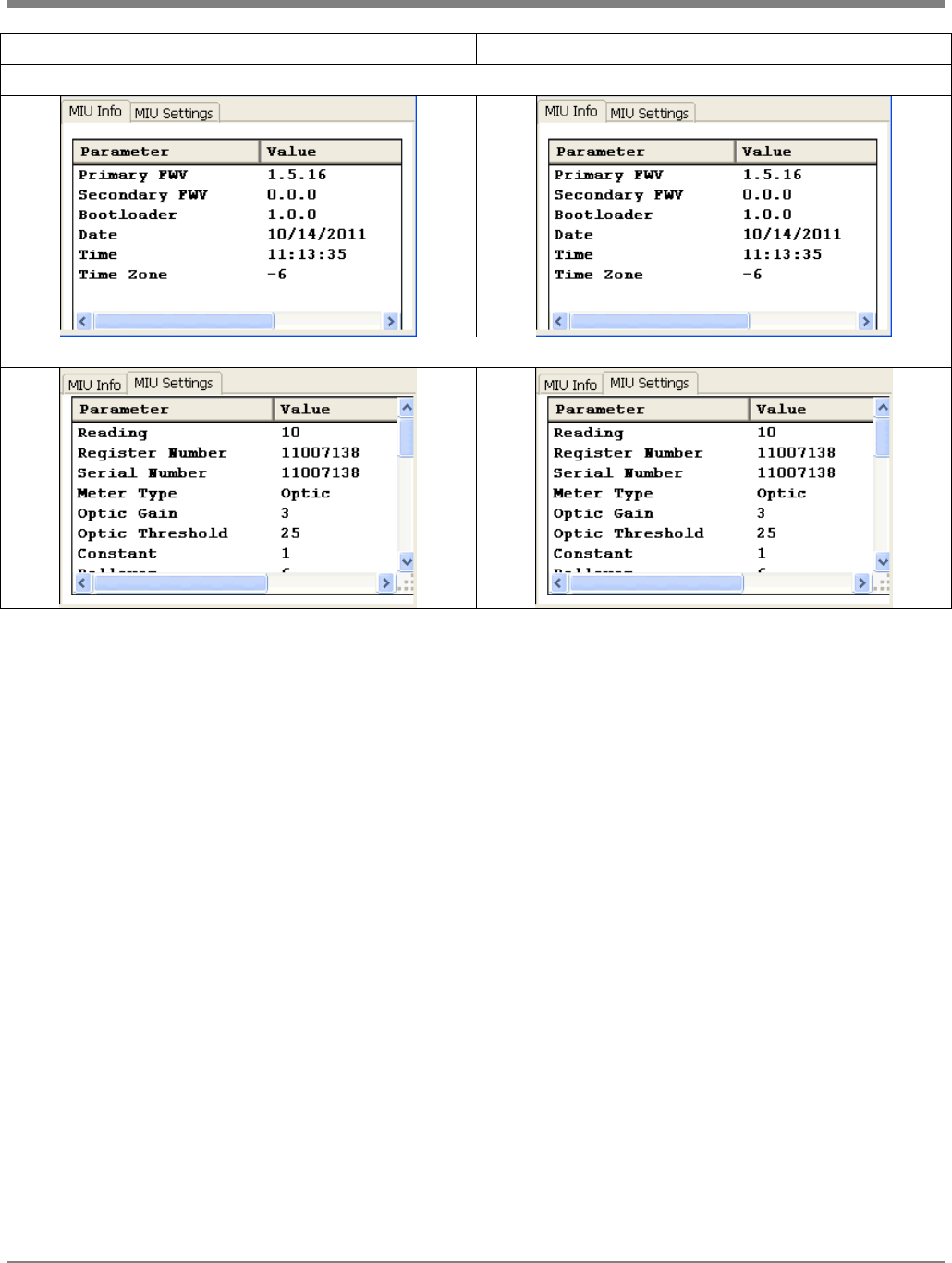
Datamatic, LTD. System Training Manual Version 08.24.12
- 32 - Confidential Datamatic, Ltd. 2012
Mesh Mode Non-Mesh Mode
MIU Info
MIU Settings
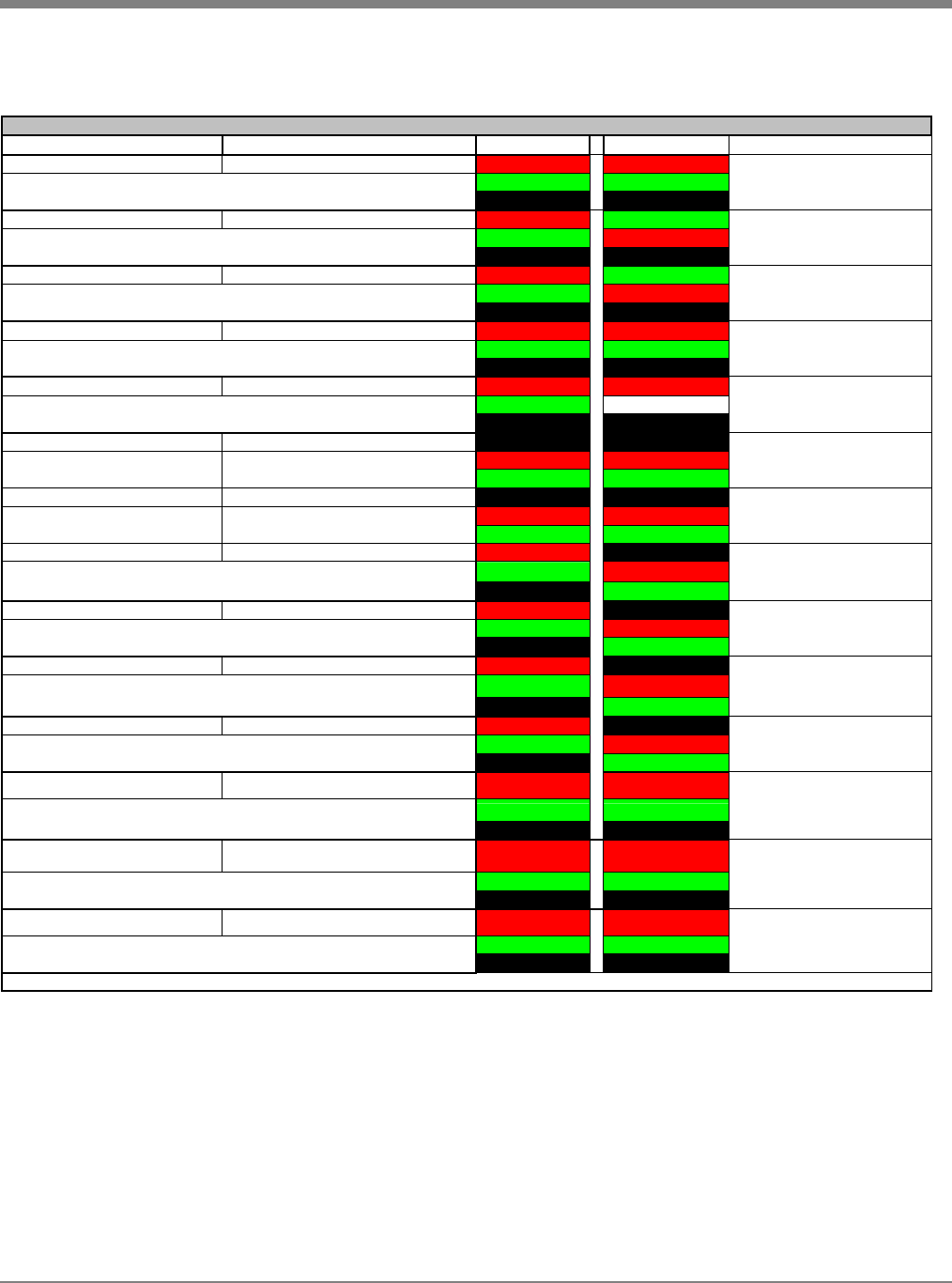
Datamatic, LTD. System Training Manual Version 08.24.12
- 33 - Confidential Datamatic, Ltd. 2012
Installing Wire-end MOSAIC FIREFLYs
Connect the wires with the MOSAIC FIREFLY and meter using the wiring scheme below:
If the meter you wish to use does not appear on this list, please contact your Datamatic Project Manager.
MOSAIC-Class FIREFLY ENCODED WIRING
Brand Model FF Wires Meter Wires Meter Type
Actaris Cyble Coder Red Red
Green Green
Black Black 3 or 17
ABB/AMCO/Kent Scancoder Red Green
Green Red
Black Black 2
AMCO InVision Red Green
Green Red
Black Black 3, 14, or 17
Badger ADE Red Red
Green Green
Black Black 3
Hersey Translator Red Red
Green White or Green
Black Black 16
Master BL Black Black
Red Red
Green Green 3
Metron Hawkeye OER Black Black
Red Red
Green Green 3
Neptune/Schlumberger ARB V Red Black
Green Red
Black Green
9 (4 digit)
10 (5 digit)
11 (6 digit)
Neptune/Schlumberger ARB VI PRO Red Black
Green Red
Black Green 15*
Neptune/Schlumberger AUTO Red Black
Green Red
Black Green
15*
Neptune E-coder Red Black
Green Red
Black Green 13 or 15
Sensus/Rockwell/Invensys SR II / ICE (TR-PL) Red Red
Green Green
Black Black
3
Sensus/Rockwell/Invensys Touchread/SR II (TR-PL) Red Red
Green Green
Black Black
1
Sensus/Rockwell/Invensys PMM/AMR System (TR-PL) Red Red
Green Green
Black Black
3
*Previously installed FIREFLYs may report a Meter Type of 12
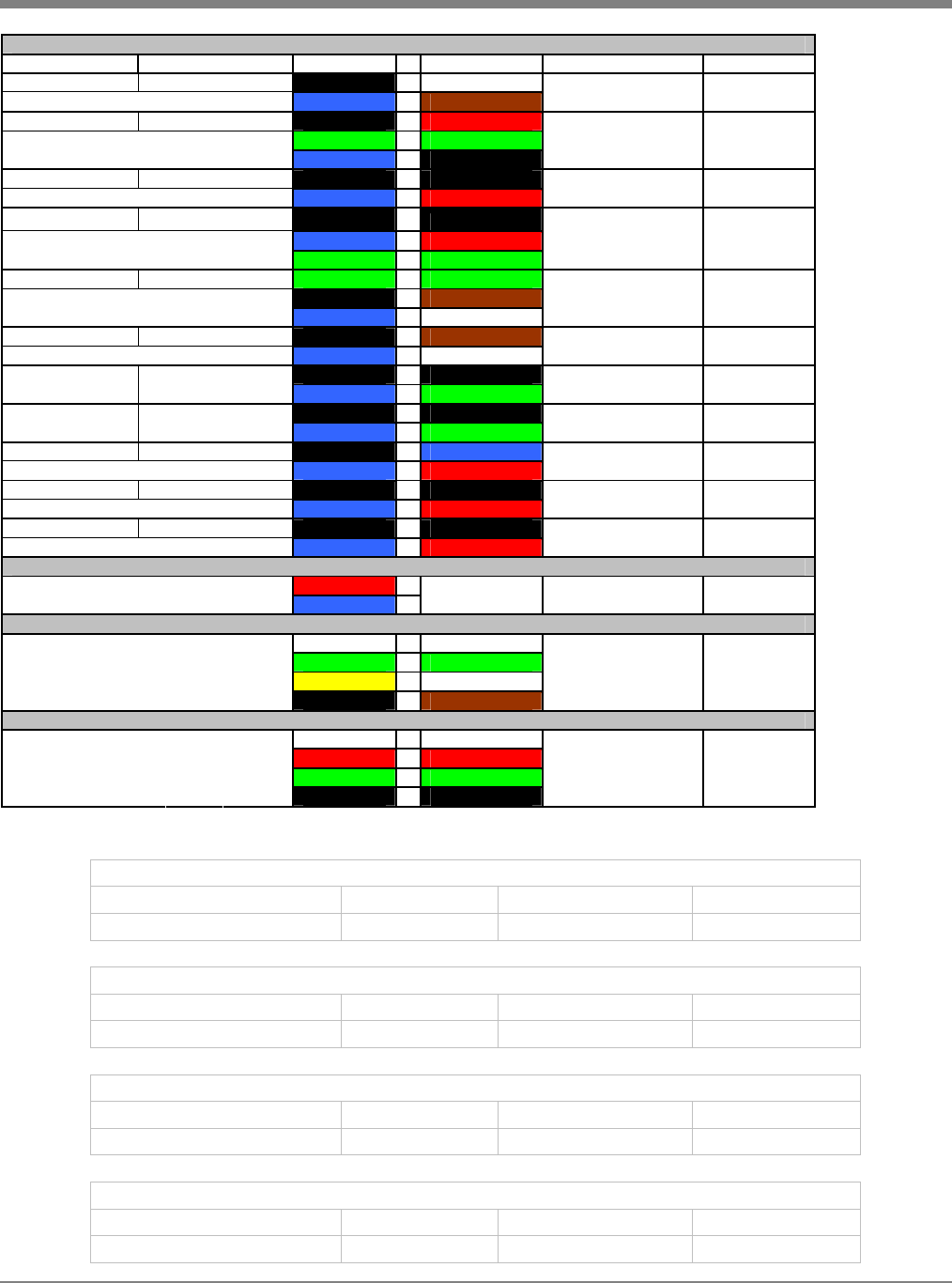
Datamatic, LTD. System Training Manual Version 08.24.12
- 34 - Confidential Datamatic, Ltd. 2012
MOSAIC-Class FIREFLY PULSE WIRING
Brand Model FF Wires Meter Wires Note Meter Type
Actaris Cyble Sensor Black White
Blue Brown FF Red and Green
shorted together 4
AMCO Digital Pulse Black Red
Green Green
Blue Black 5
Badger RTR Black Black
Blue Red FF Red and Green
shorted together 4
Badger RTR Black Black
(Pulse with tamper) Blue Red
Green Green 5
Corona Pulsar Green Green
(Pulse with tamper) Black Brown
Blue White 5
Corona Pulsar Black Brown
Blue White FF Red and Green
shorted together 4
Hendey HPM Black Black
Performance PMN 05 Nitro 1 Blue Green FF Red and Green
shorted together 4
Hendey PMN Black Black
Performance PMN 05 Nitro 1 Blue Green FF Red and Green
shorted together 4
Kent/Elster V100 Black Blue
Blue Red FF Red and Green
shorted together 4
Master Logical Switch Black Black
High Glass Blue Red FF Red and Green
shorted together 4
Master Pulse Black Black
Blue Red FF Red and Green
shorted together 4
MOSAIC-Class FIREFLY REPEATER WIRING
All models except D4000 & D4110 Red
Blue FF Red and Blue
shorted together 253
MOSAIC-Class FIREFLY to Remote Shutoff Valve WIRING
FF Wires RSV Wires
Green Green
Yellow White
Black Brown
FF Red and Blue
shorted together 19
MOSAIC-Class FIREFLY to PermaLog WIRING
FF Wires PLOG Wires
Red Red
Green Green
Black Black
3, 16, or 17
Schematics: Write in the Wire Color Combinations Below
MOSAIC FIREFLY
Meter
Schematics: Write in the Wire Color Combinations Below
MOSAIC FIREFLY
Meter
Schematics: Write in the Wire Color Combinations Below
MOSAIC FIREFLY
Meter
Schematics: Write in the Wire Color Combinations Below
MOSAIC FIREFLY
Meter
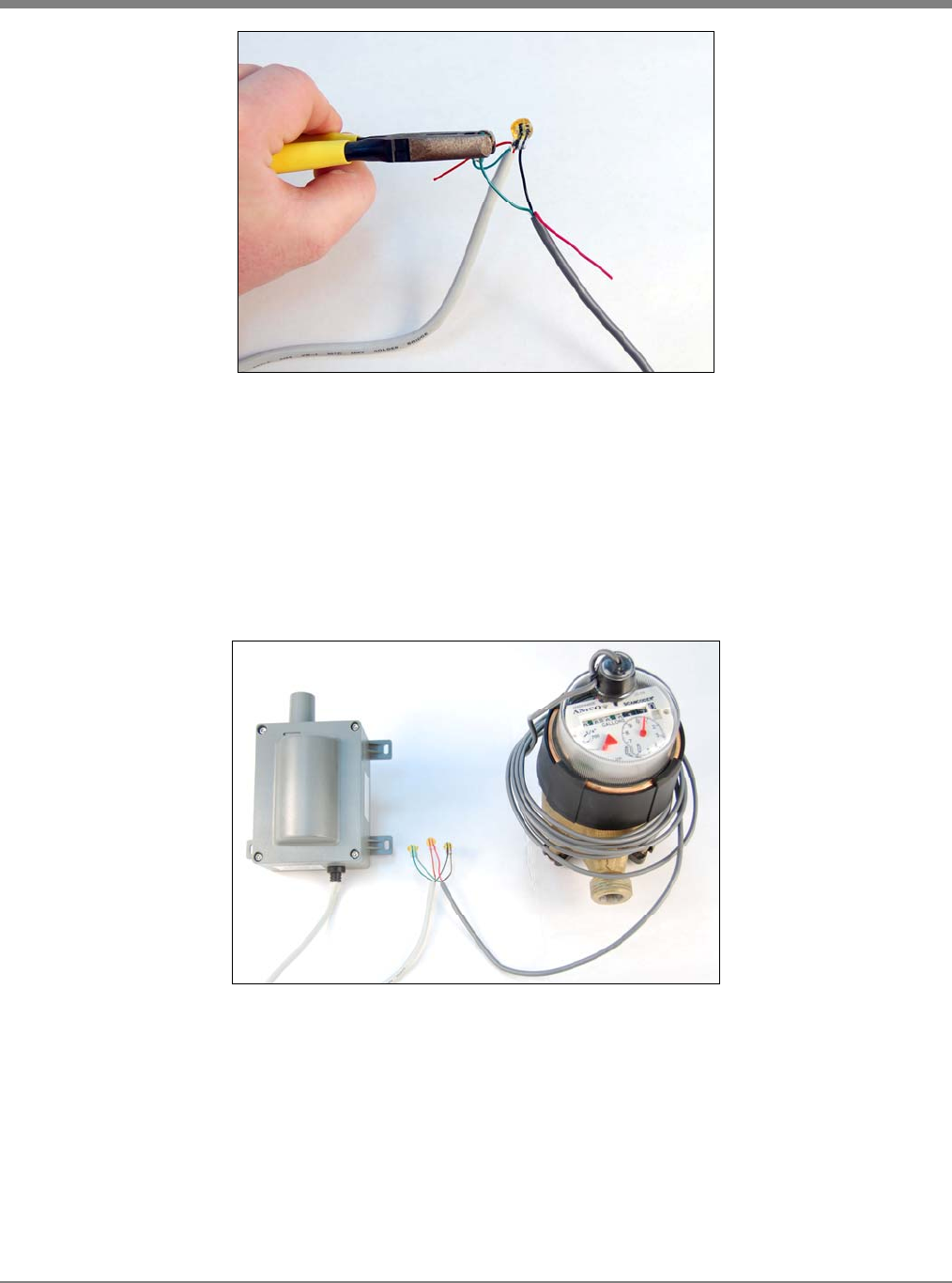
Datamatic, LTD. System Training Manual Version 08.24.12
- 35 - Confidential Datamatic, Ltd. 2012
Crimping UY connectors
Be careful not to nick any individual wires when removing the insulated covering from the wires.
Connect the wires using UY gel cap connectors. If the wires are stripped, cut off the stripped ends.
Wires must have un-stripped ends for use in gel cap connectors. Use the Klein crimping tool to secure
the gel cap connectors. Do not use standard pliers to crimp UY connectors.
Make sure wires are fully seated – pull gently to verify that there is a secure connection.
MOSAIC FIREFLY with UY gel cap connectors to register
Note: Once connected to the encoded register, test the MOSAIC FIREFLY connections by swiping the
magnet under the LED’s to activate the MOSAIC FIREFLY.
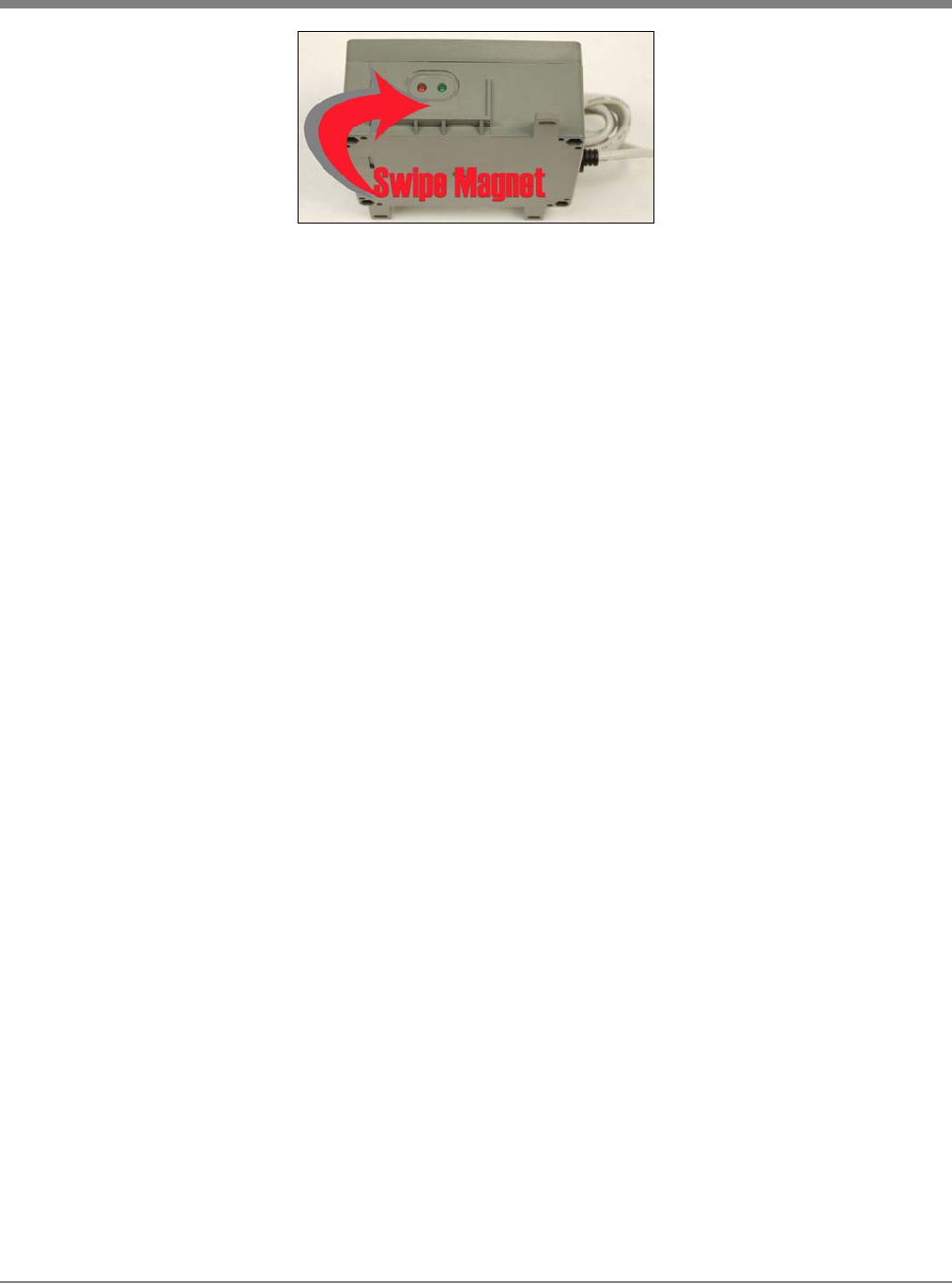
Datamatic, LTD. System Training Manual Version 08.24.12
- 36 - Confidential Datamatic, Ltd. 2012
After swiping, the MOSAIC FIREFLY will indicate a good connection to an encoded register by
displaying a solid red LED. Note, if the red LED does not go solid after attaching to an encoded register
the FIREFLY may not be connected correctly or the register cannot be read.
Pulse output registers do not provide instant feedback from the register after programming. A Read
Verification will need to be performed after installation to verify the meter is pulsing to the FIREFLY
properly. It is crucial to be sure the wires are connected properly prior to inserting them into the burial
pod.
After swiping, the MOSAIC FIREFLY will indicate a successful connection to a pulse register by
displaying a fast-blinking red LED. Insert the connections into the 3M burial pod.
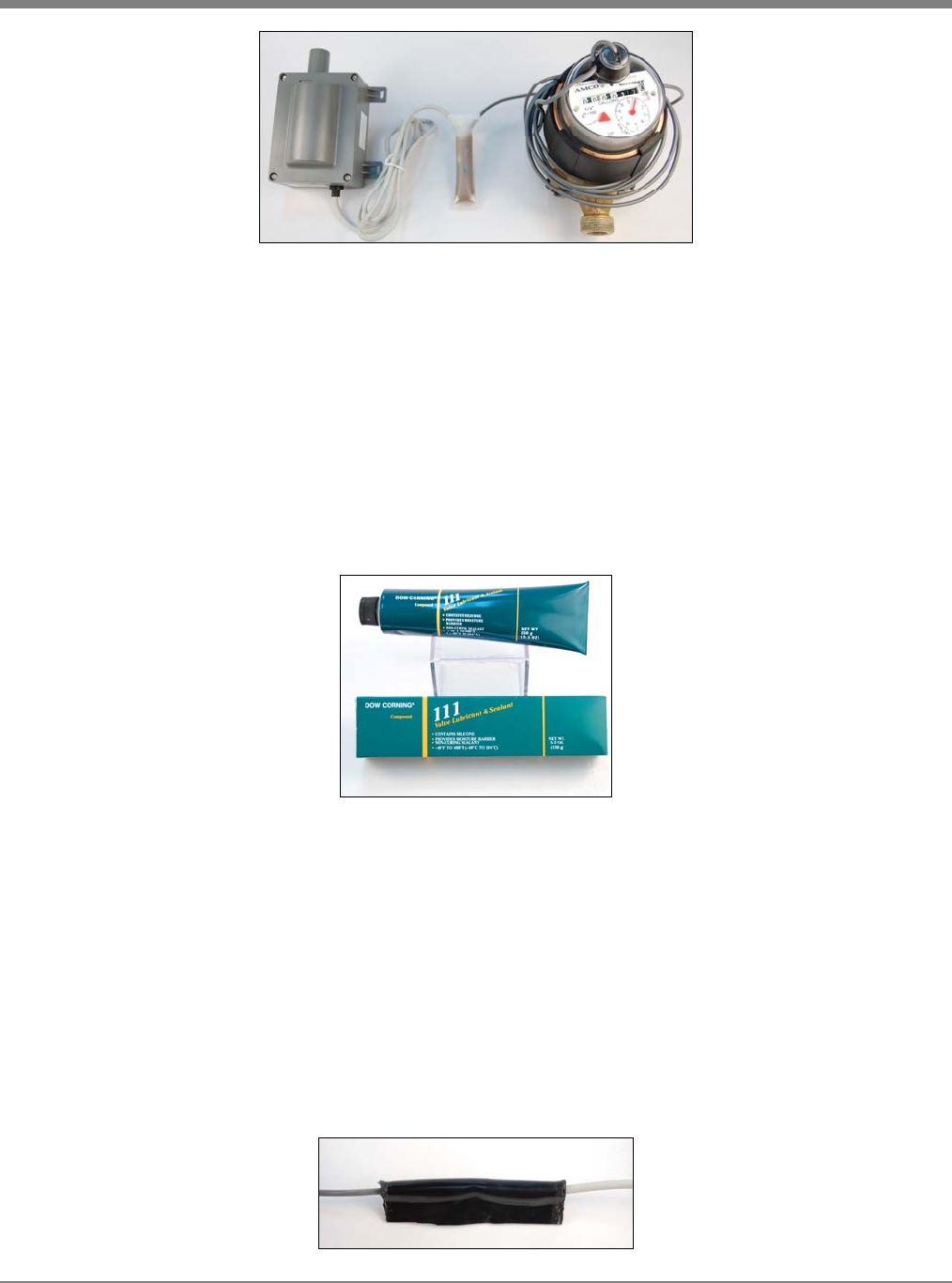
Datamatic, LTD. System Training Manual Version 08.24.12
- 37 - Confidential Datamatic, Ltd. 2012
MOSAIC FIREFLY with burial pod connecting to the register
Splice Methods
Water Pit Splice Method for Direct Register Connections:
• Strip the wires back.
• Cut excess wires and direct connect to meter according to wire connections guide per register
type.
• Fill the wire connection reservoir on the meter with DC-111.
Each register terminal and wire connection must be protected from moisture utilizing the Electrical
Insulating Compound Specified below:
DOW CORNING
MFG. Model # 111
Basement Splice:
• Space the connections out so that the Mastic Pad will cover the entire connection.
• The 3M Scotch Vinyl Mastic Pad can be cut so that one pad covers 2-3 installations depending
on the number of wires needed and type of connectors used.
• Be sure there is enough pad to completely cover the connections.
• Due to the nature of the Mastic Adhesive, this installation cannot be completed in temperatures
below 45 degrees Fahrenheit.
• Once the Mastic Adhesive is placed over the splice, it must be squeezed together and molded
around the splice to insure a watertight seal.
Mastic Pad
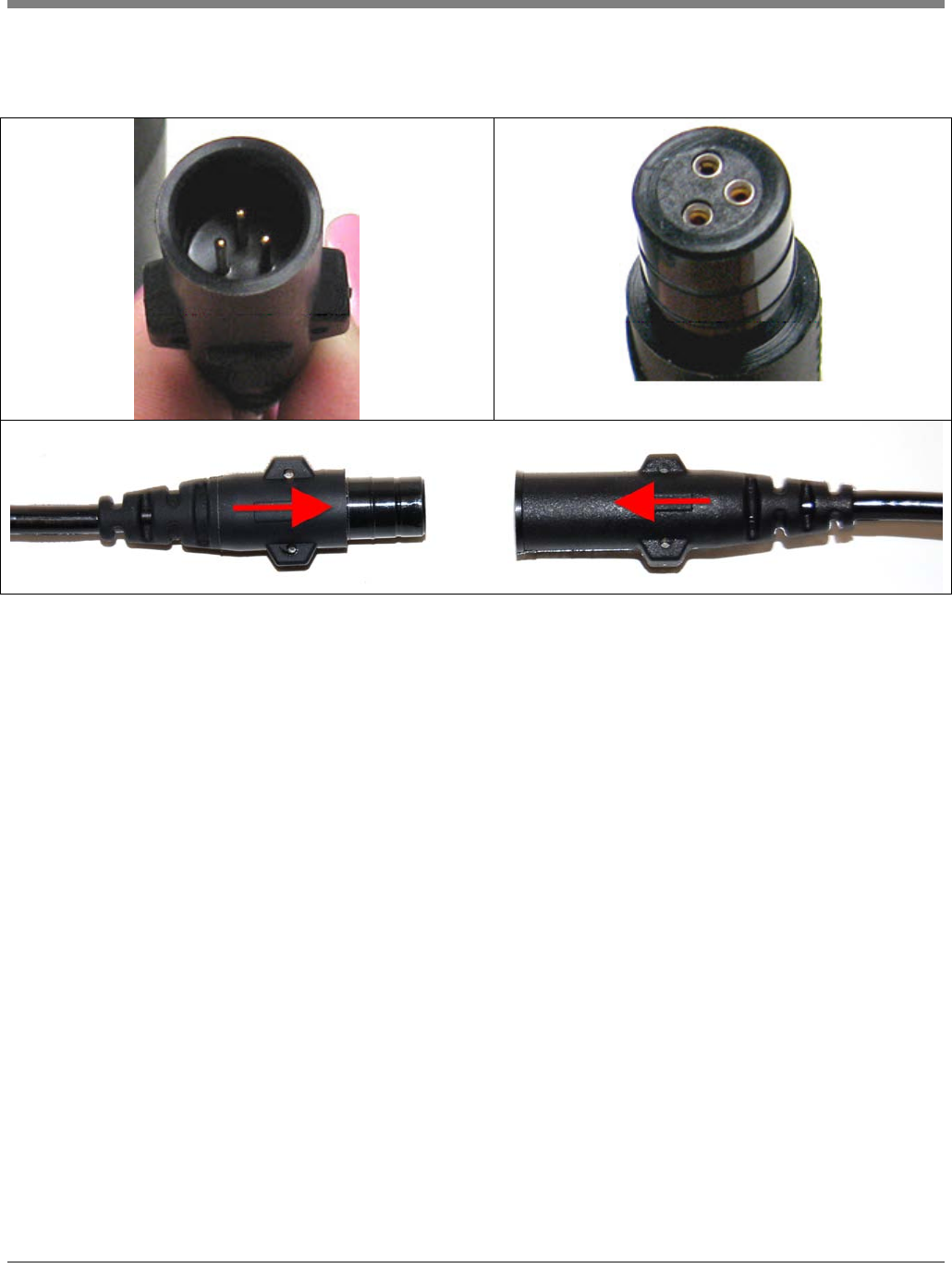
Datamatic, LTD. System Training Manual Version 08.24.12
- 38 - Confidential Datamatic, Ltd. 2012
Nicor Connections
Nicor-end FIREFLYs are connected to a Nicor-end register as follows:
Insert the pins from the FIREFLY's Nicor connector into the connector on the register side. Be careful
not to force the pins. Bent pins are not covered by the FIREFLY Warranty, so pay attention to proper
alignment to ensure a clean connection.
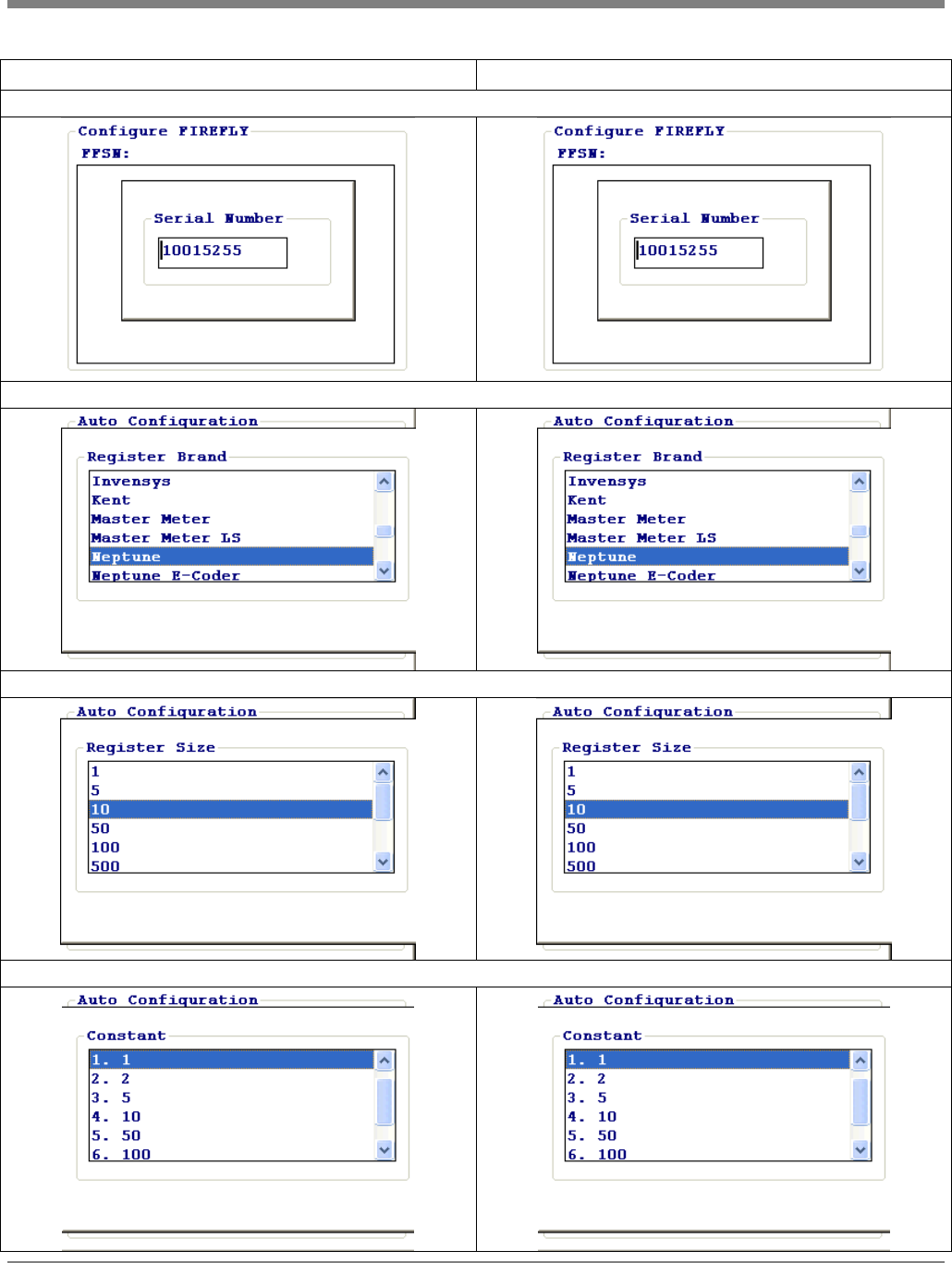
Datamatic, LTD. System Training Manual Version 08.24.12
- 39 - Confidential Datamatic, Ltd. 2012
Programming Wire-end MOSAIC FIREFLY
Mesh Mode Non-Mesh Mode
FFSN
Register Brand
Register Size
Constant
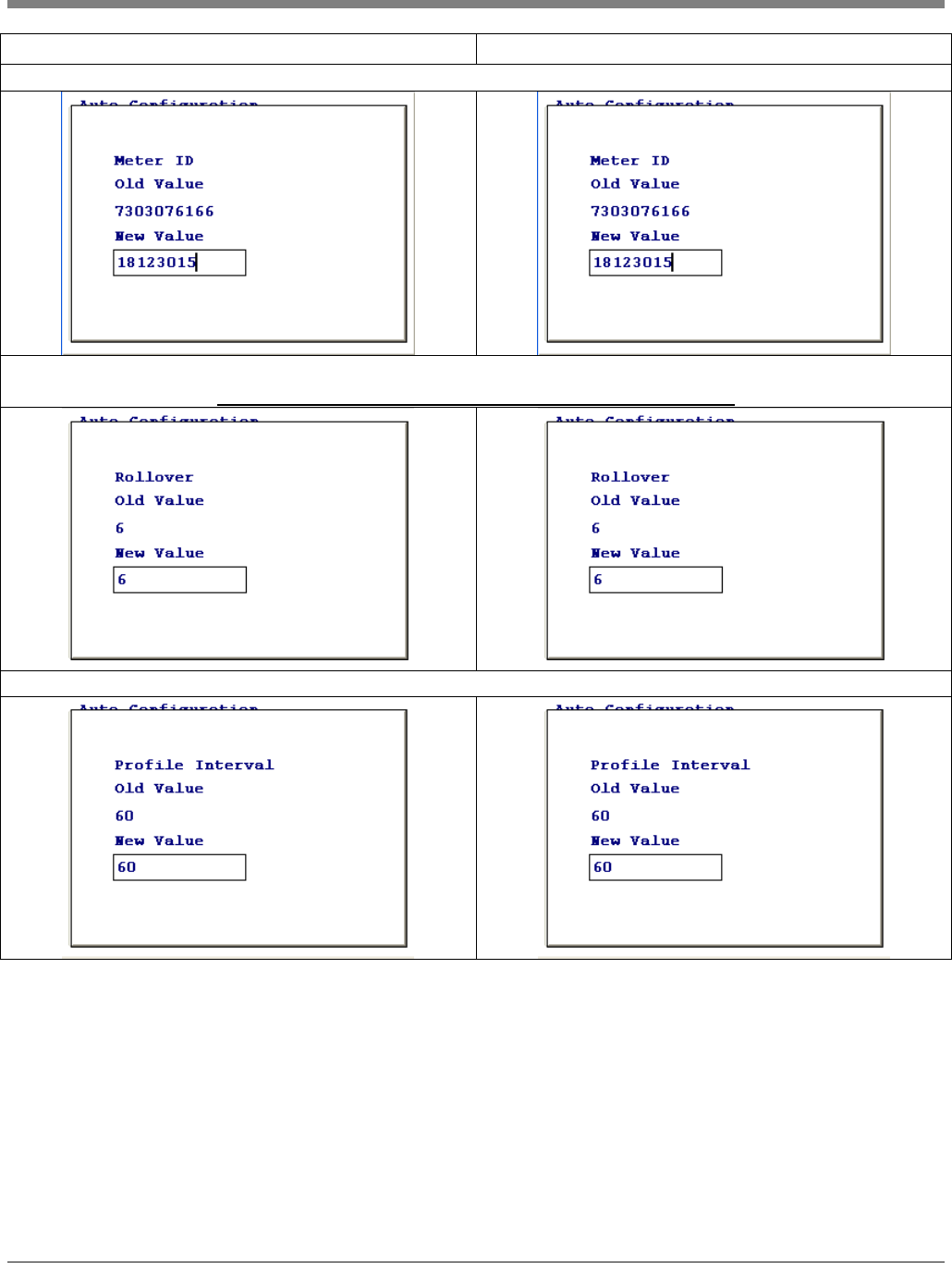
Datamatic, LTD. System Training Manual Version 08.24.12
- 40 - Confidential Datamatic, Ltd. 2012
Mesh Mode Non-Mesh Mode
Meter ID
Rollover
**NOTE: Rollover applies to pulse style meters ONLY**
Profile Interval
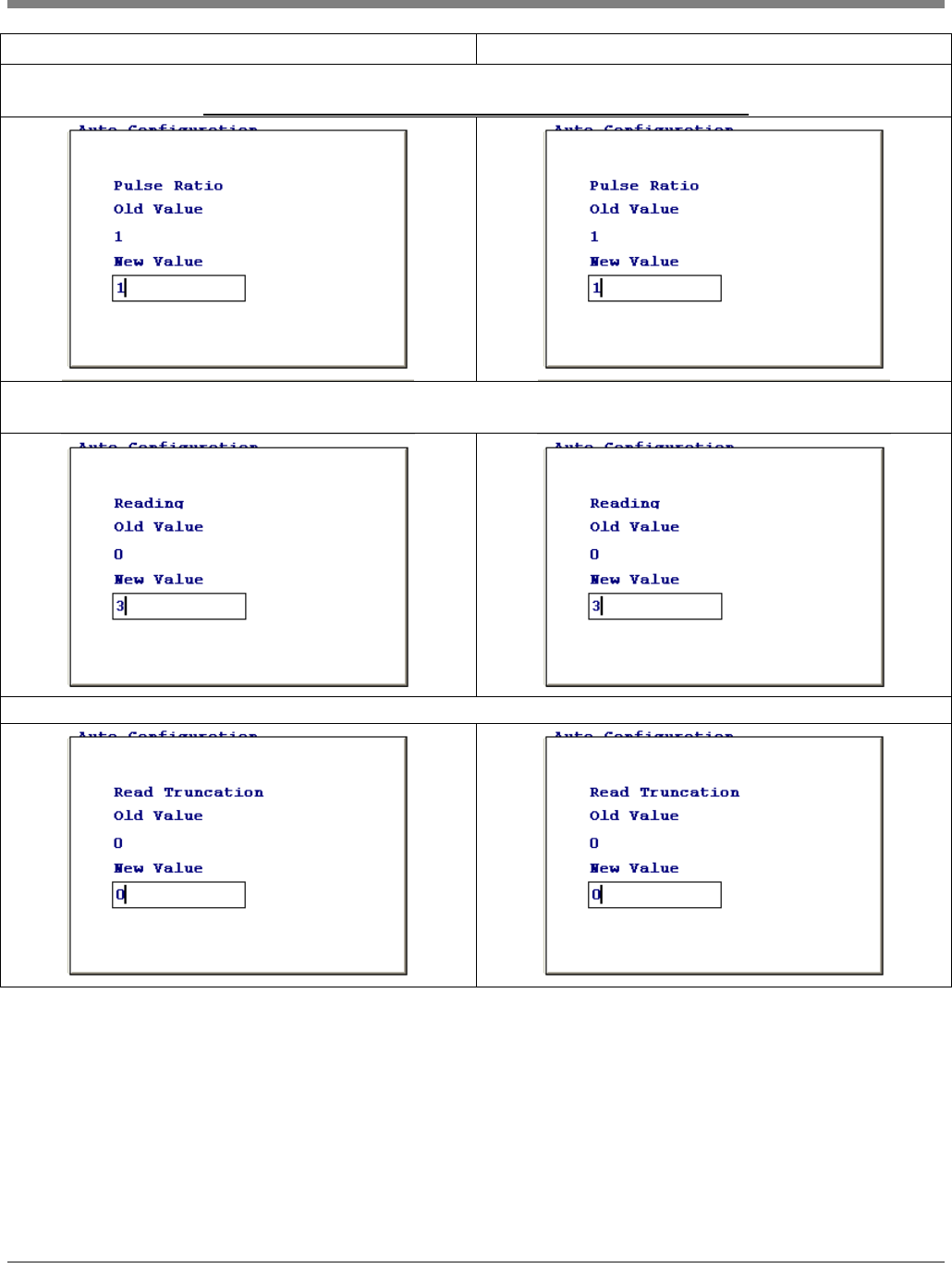
Datamatic, LTD. System Training Manual Version 08.24.12
- 41 - Confidential Datamatic, Ltd. 2012
Mesh Mode Non-Mesh Mode
Pulse Ratio
**NOTE: Pulse Ratio applies to pulse style meters ONLY**
Reading
Enter the meter reading, or press Esc to allow the encoder reading to post (for Encoded meters only).
Read Truncation
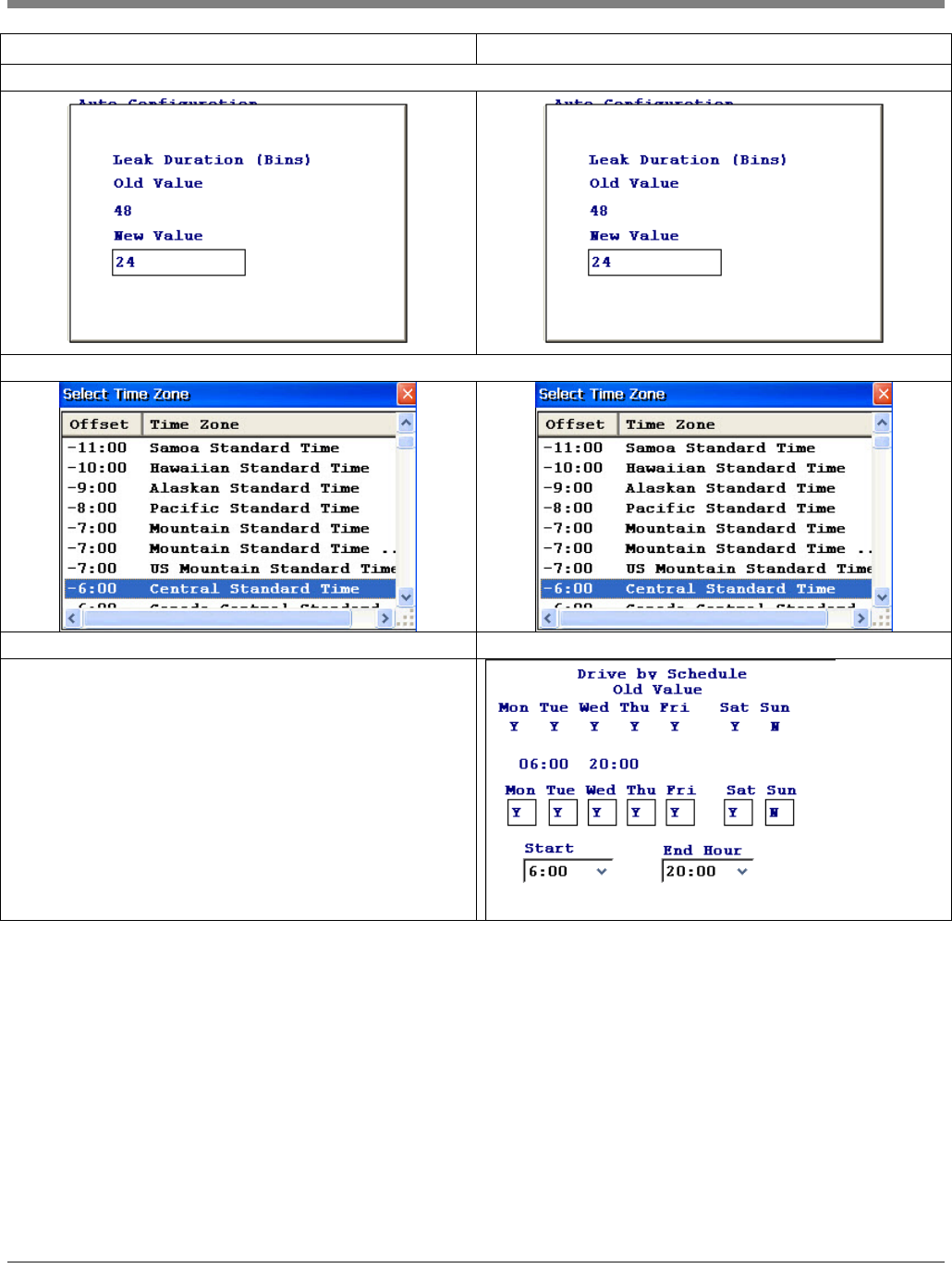
Datamatic, LTD. System Training Manual Version 08.24.12
- 42 - Confidential Datamatic, Ltd. 2012
Mesh Mode Non-Mesh Mode
Leak Duration (Bins)
Select Time Zone
Drive by Schedule
Drive by Schedule is not required for Mesh
FIREFLYs.
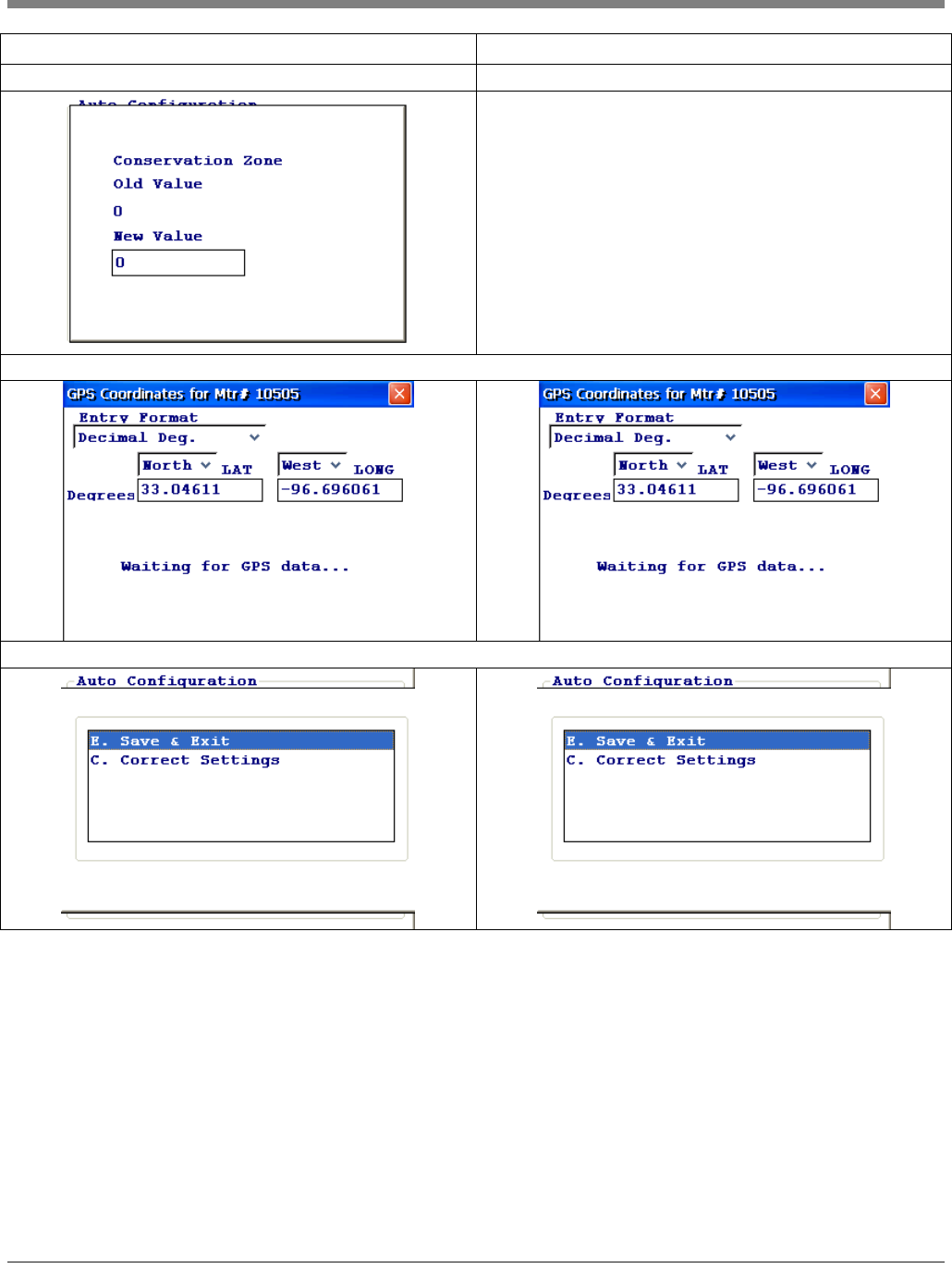
Datamatic, LTD. System Training Manual Version 08.24.12
- 43 - Confidential Datamatic, Ltd. 2012
Mesh Mode Non-Mesh Mode
Conservation Zone
Conservation Zone is a Mesh function at this time.
Please contact Datamatic Project Management to
discuss this option.
GPS Coordinates
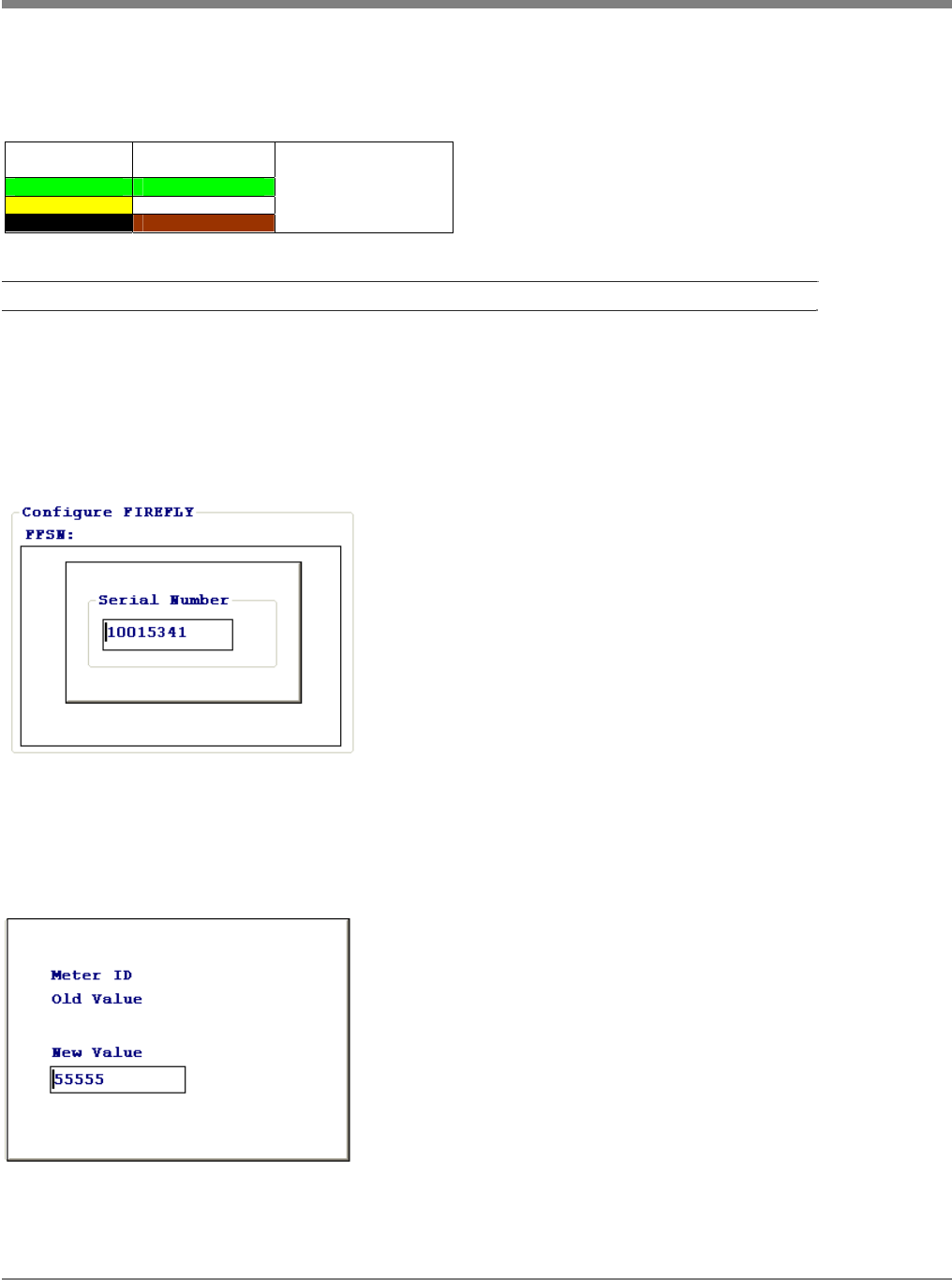
Datamatic, LTD. System Training Manual Version 08.24.12
- 44 - Confidential Datamatic, Ltd. 2012
Connecting and Programming the Remote Shutoff Valve
Connecting the Remote Shutoff Valve
Connect the RSV wires with the MOSAIC FIREFLY using the wiring scheme below:
FIREFLY Wire Remote Shutoff
Valve Wire
Green Green
Yellow White
Black Brown
FIREFLY
Blue
Red
Shorted together
See Installation Procedures section for detailed instructions and approved splicing methods.
NOTE: Remote Shutoff Valves should only be installed by a licensed plumber.
Programming the Remote Shutoff Valve
From the FIREFLY Menu, select option 3. Program by Parameter.
Enter FIREFLY Serial number and press Enter.
Select option 2. Meter ID. Verify that the Register/Meter number is correct that you are programming
into the FIREFLY:
The Meter ID can be up to 10 alphanumeric characters (16 characters may be used only if employing the
RS3 Import/Export record layouts).
Enter the Register/Meter (or FIREFLY Serial Number) number and press Enter.
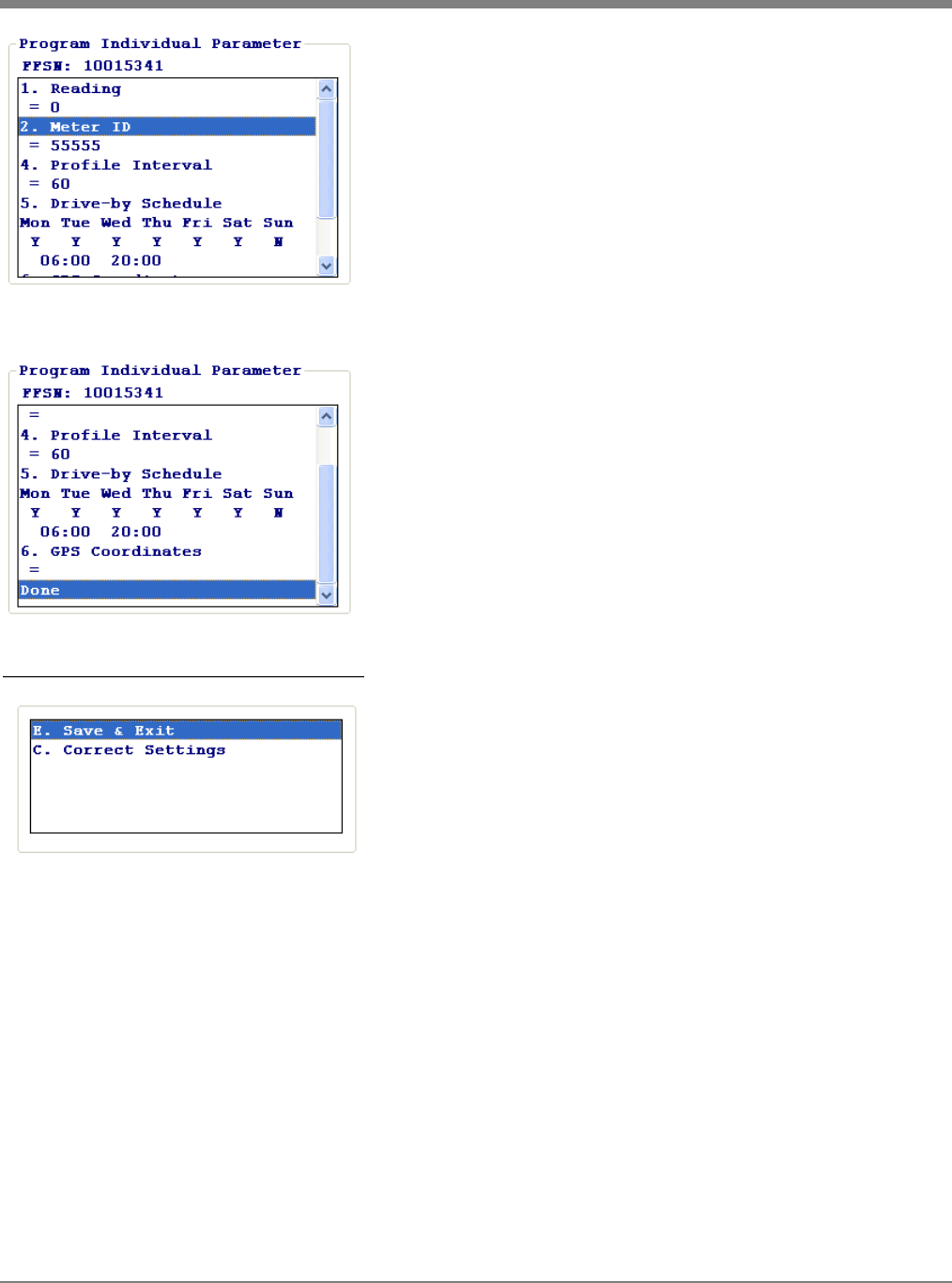
Datamatic, LTD. System Training Manual Version 08.24.12
- 45 - Confidential Datamatic, Ltd. 2012
Go to “Done” at the bottom of the screen and press Enter
Go to E. Save & Exit and press Enter
The software will return to the MIU Settings screen. Press “Enter” to be returned to the FIREFLY menu.
Press ESC to be returned to the account screen.
Press the ‘I’ Key to initialize the RF Receiver and read the FIREFLY.
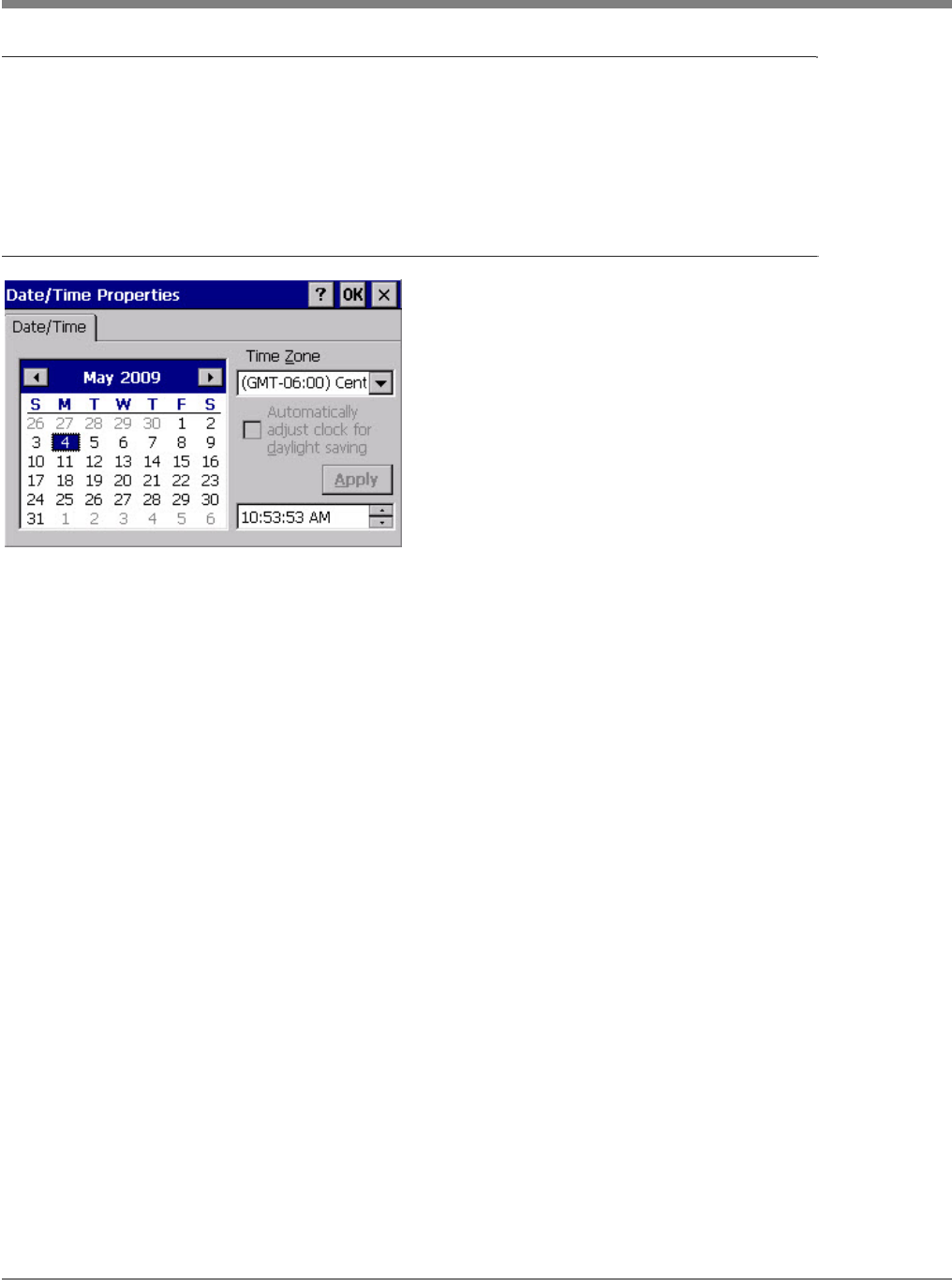
Datamatic, LTD. System Training Manual Version 08.24.12
- 46 - Confidential Datamatic, Ltd. 2012
NOTE FOR FIREFLYs IN NON-MESH MODE:
By default, all FIREFLYs are programmed with a default active window of 6:00 am to 8:00 pm, CST. You
must program the FIREFLY according the to instructions above in order to load it with the offset value
required for the FIREFLY to be active between 6:00 am and 8:00 pm in your local time zone.
Please verify that the time zone is correctly set on your ROADRUNER by accessing Control Panel via the
Windows desktop. Once in Control Panel, select View: Supervisor Mode. Enter the password ‘YIWT”
and press Enter. Select the Date / Time icon and use the drop down box to select your correct Time Zone
setting. Press Apply then OK (in the top right-hand corner) to save the settings.
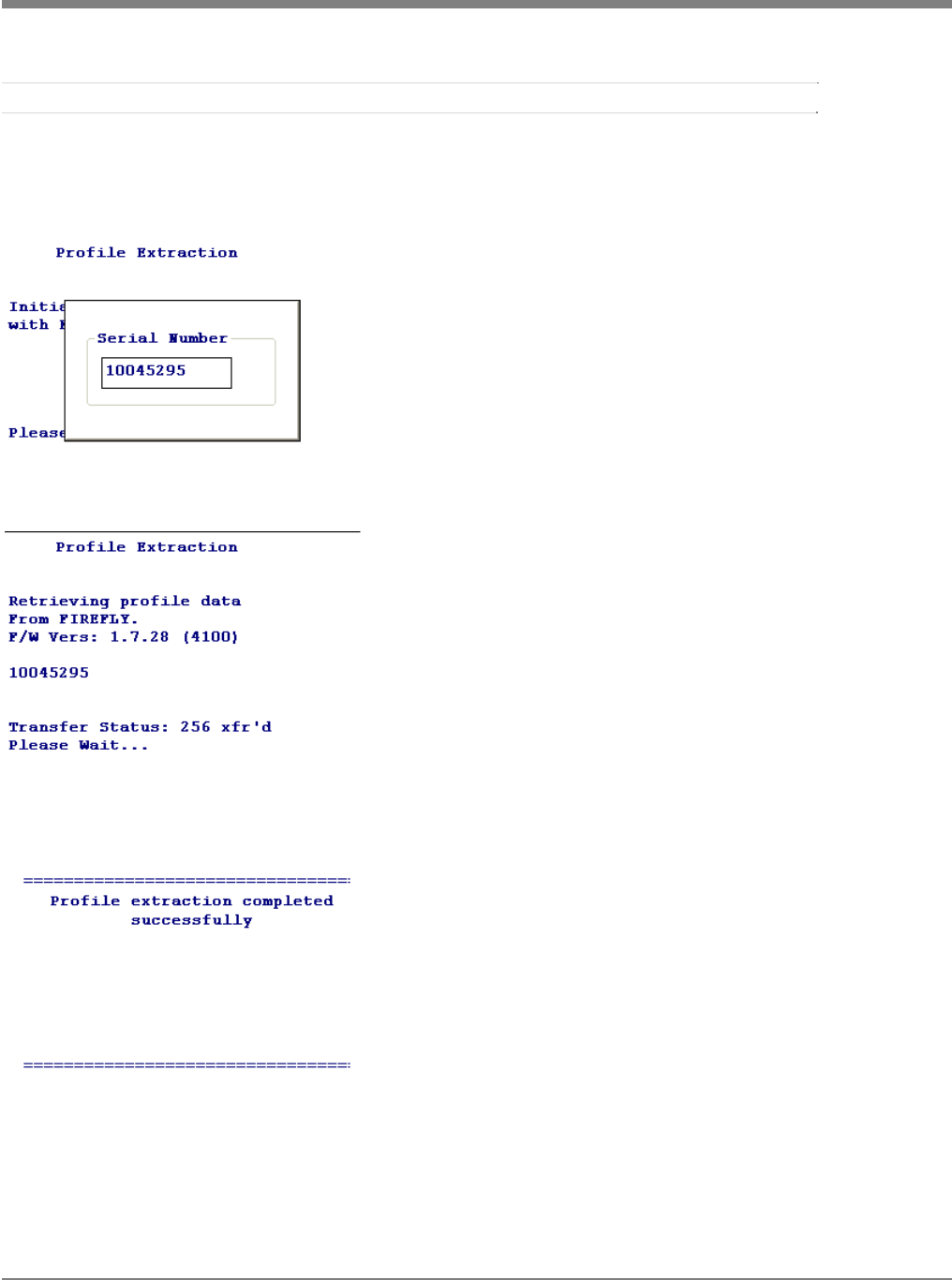
Datamatic, LTD. System Training Manual Version 08.24.12
- 47 - Confidential Datamatic, Ltd. 2012
Extract Profile Data
NOTE: Profile extraction is available for FIREFLYs in Non-Mesh Mode only.
From the FIREFLY Menu, select option 5. Extract Profile Data.
Enter the Serial Number of the FIREFLY you are extracting Profile data from.
During extraction, the following screen will display:
When profile data extraction is complete, the following screen will display:
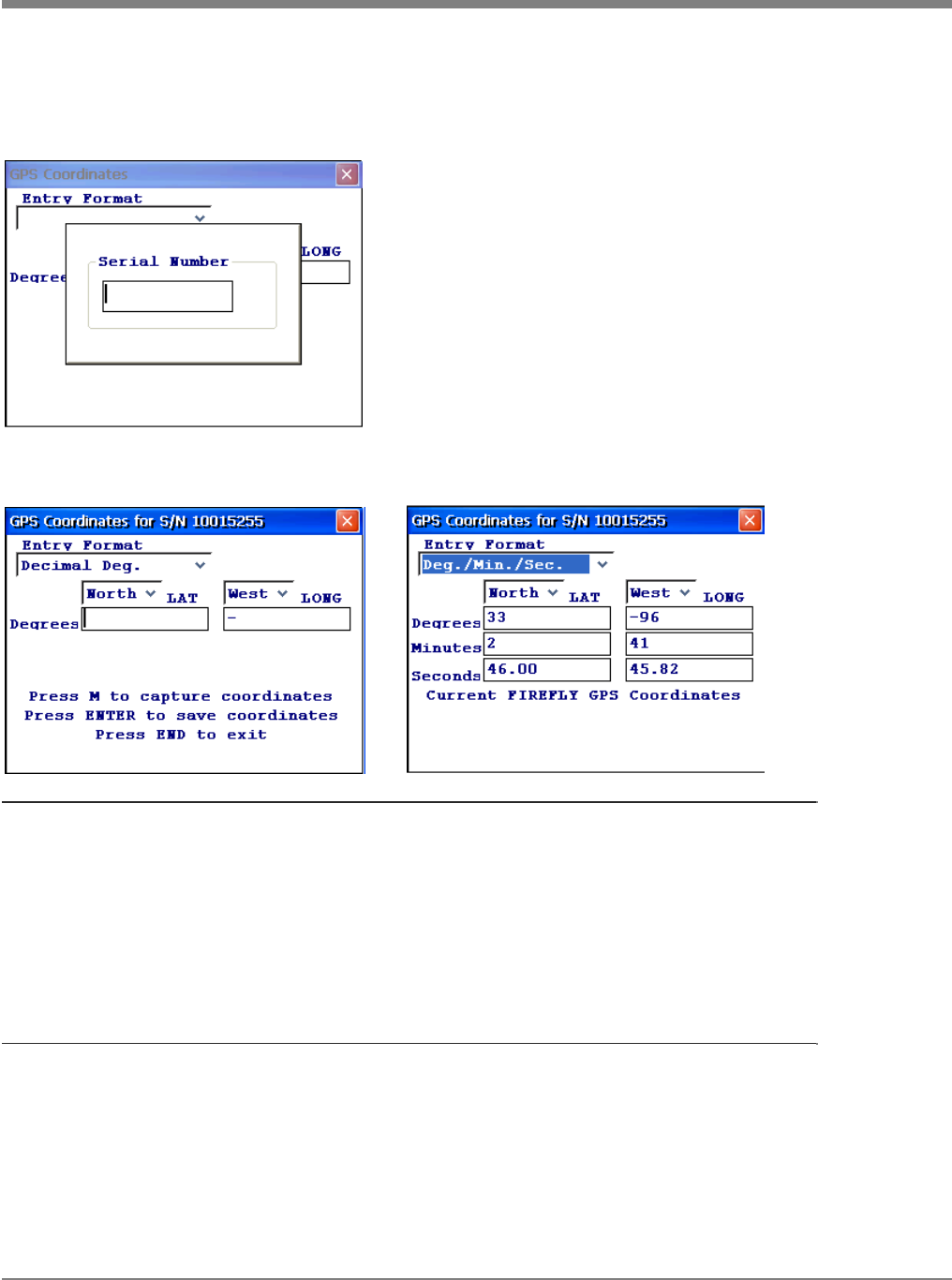
Datamatic, LTD. System Training Manual Version 08.24.12
- 48 - Confidential Datamatic, Ltd. 2012
Program GPS Coordinates
From the FIREFLY Menu, select option 7. Program GPS Coords.
Enter the FIREFLY or Gateway serial number.
Enter Latitude and Longitude and press Enter.
OR
NOTE: When using the software on the ROADRUNNER, GPS coordinates can be entered either
by Degrees/Minutes/Seconds, or by Decimal Degrees (select by using the drop-down in the Entry
Format dialog box. Please be certain that the GPS device you are using is on one of these two
formats when collecting the data.
For example, on an etrex Garmin GPS device the Decimal Degree collection option displays as
hddd.ddddd° and the Degrees/Minutes/Seconds collection option displays as hddd°mm’ss.s
Please be sure that you are entering in the same format into the ROADRUNNER as you are
viewing on your GPS device (such as a Garmin).
Press Enter to continue or End to return to the main menu.

Datamatic, LTD. System Training Manual Version 08.24.12
- 49 - Confidential Datamatic, Ltd. 2012
Options
From the FIREFLY Menu, select option 9. Options to set options for the ROADRUNNER.
1. FIREFLY Support Mode 1. Legacy Support
2. MOSAIC Support
2. Capture Data 1. Enable
2. Disable
3. Delta Warning Value
4. Truncation 1. Enable
2. Disable
5. Connection ID Method 1. Meter Number
2. Serial Number
3. User Selects
6. Radio Communication Mode 1. NON-MESH
2. MESH
7. GPS Format 1. Decimal
2. Degrees/Minutes/Seconds
8. GPS Longitude Location 1. Western Hemisphere
2. Eastern Hemisphere
9. GPS Latitude Location 1. Northern Hemisphere
2. Southern Hemisphere
A. Radio Data Mode 1. Binary
2. Text
B. Gas Read View 1. Cubic Feet
2. 100 Cubic Feet
C. Multi-Read Sleep Int. ______ Minutes
D. Firmware Update Method 1. TFTP
2. RLOAD = Default
E. Image File Naming Convention 1. Account Number
2. Meter Number
3. Address
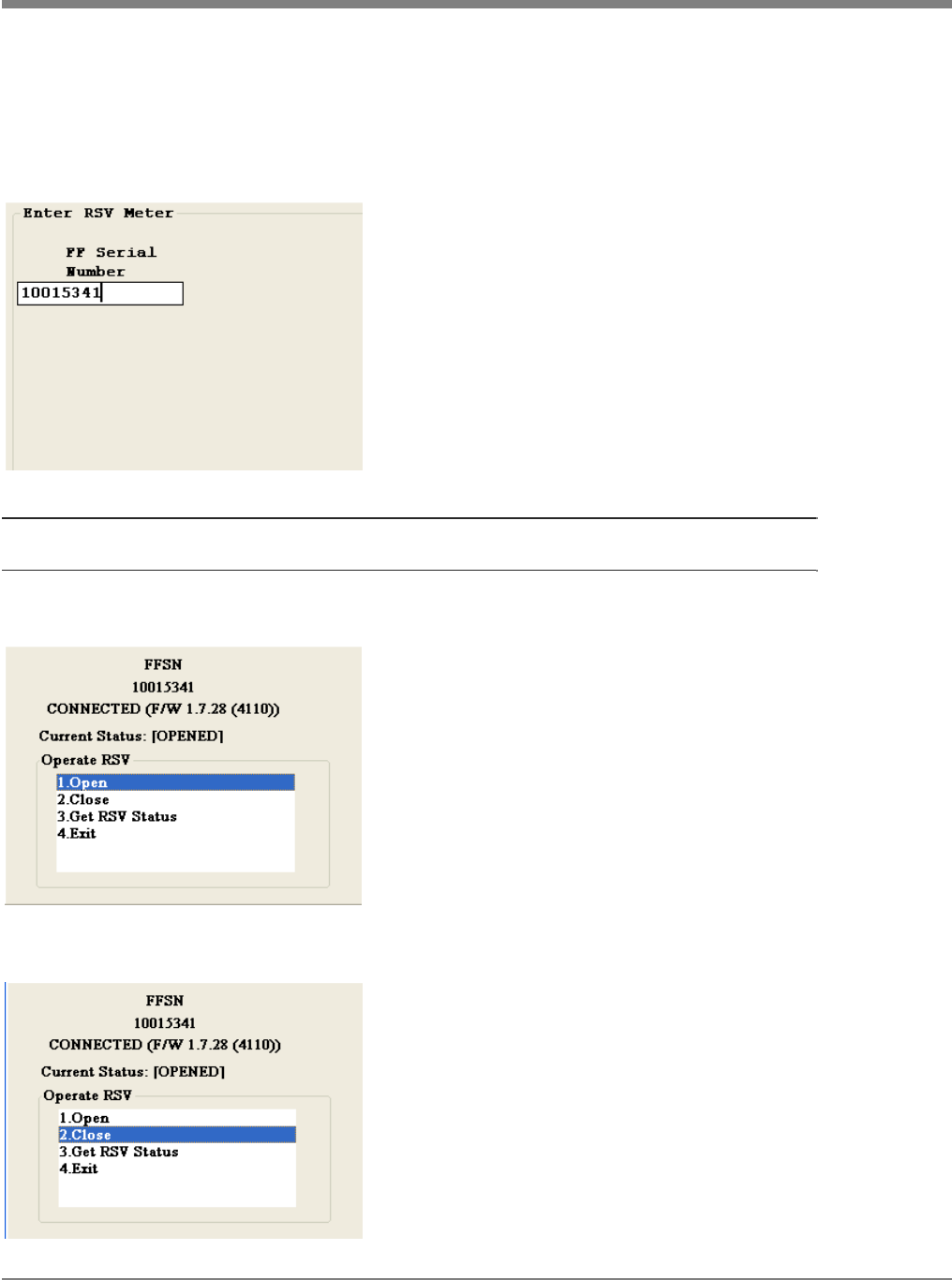
Datamatic, LTD. System Training Manual Version 08.24.12
- 50 - Confidential Datamatic, Ltd. 2012
Operate RSV
From the FIREFLY Menu, select option A. Operate RSV to program and control Remote Shutoff
Valves.
Enter FIREFLY Serial number and press Enter.
NOTE: When communicating with FIREFLYs in Mesh Mode, it is necessary to swipe the
FIREFLY with a magnet before initializing communications.
The RSV Control Menu will display indicating the serial number and current status of the RSV device.
Select the command you wish to execute.
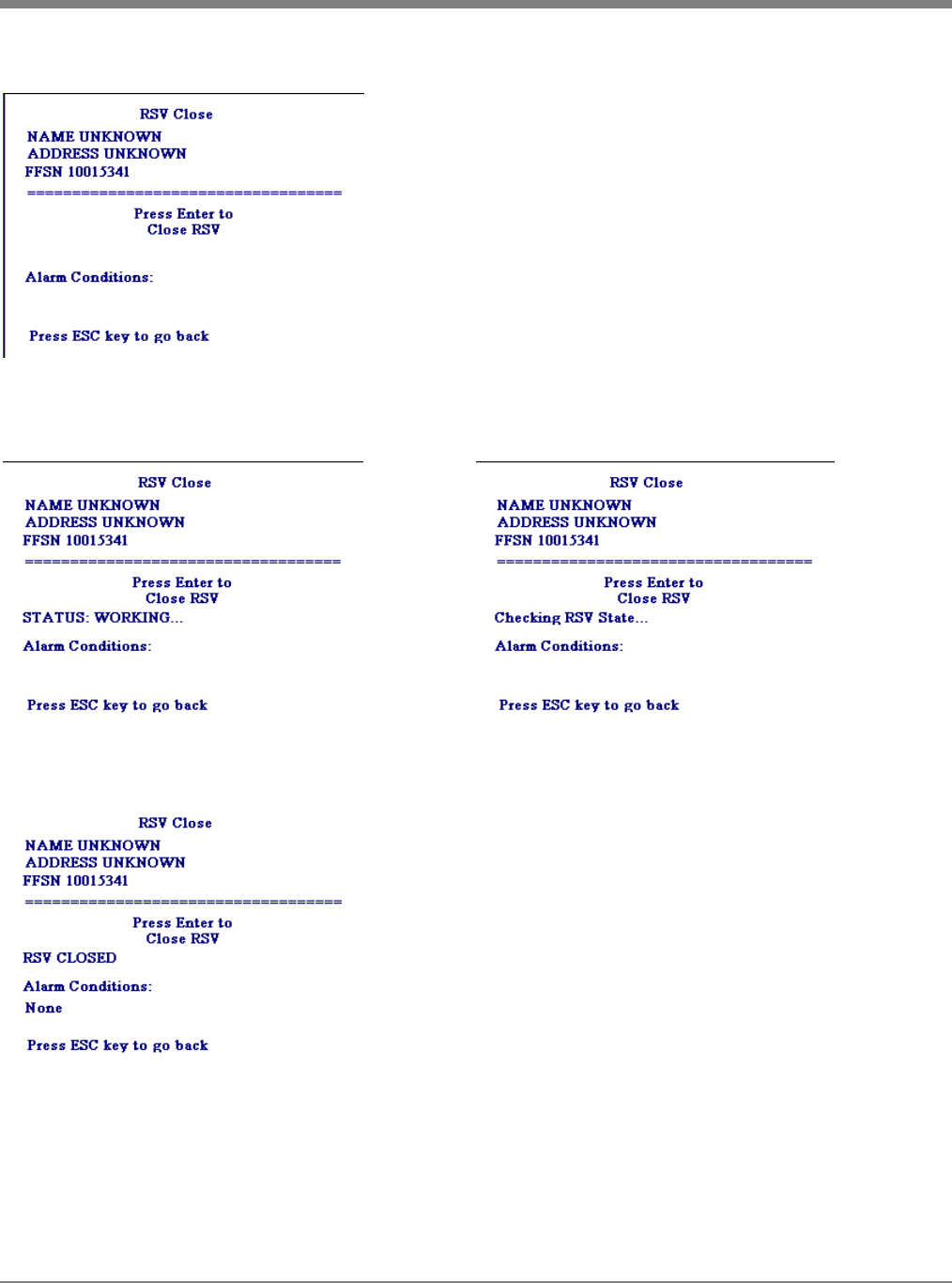
Datamatic, LTD. System Training Manual Version 08.24.12
- 51 - Confidential Datamatic, Ltd. 2012
Press “Enter” to execute the selected command.
“Status: WORKING” and “Checking RSV State” message indicate the ROADRUNNER is actively
communicating with the FIREFLY and RSV.
When a command is successfully completed, the ROADRUNNER will display a message indicating
success and the user will be prompted to “Press ESC to go back”.

Datamatic, LTD. System Training Manual Version 08.24.12
- 52 - Confidential Datamatic, Ltd. 2012
The alarm conditions that can be detected for the RSV are:
• Failed
• Stuck
• Low Battery
• Tamper
When the ‘Failed’ flag is reported, the software will display ‘Stuck’ since the valve is stuck in the wrong
position. It is possible that the FIREFLY can report one or more of these conditions. In the cases where
more than one condition is reported, commas will separate the conditions.
Once the FIREFLY reports a stuck valve, in order for that condition to be cleared, the valve must
successfully be cycled between opened, closed, and then opened again before it will clear the stuck
status.
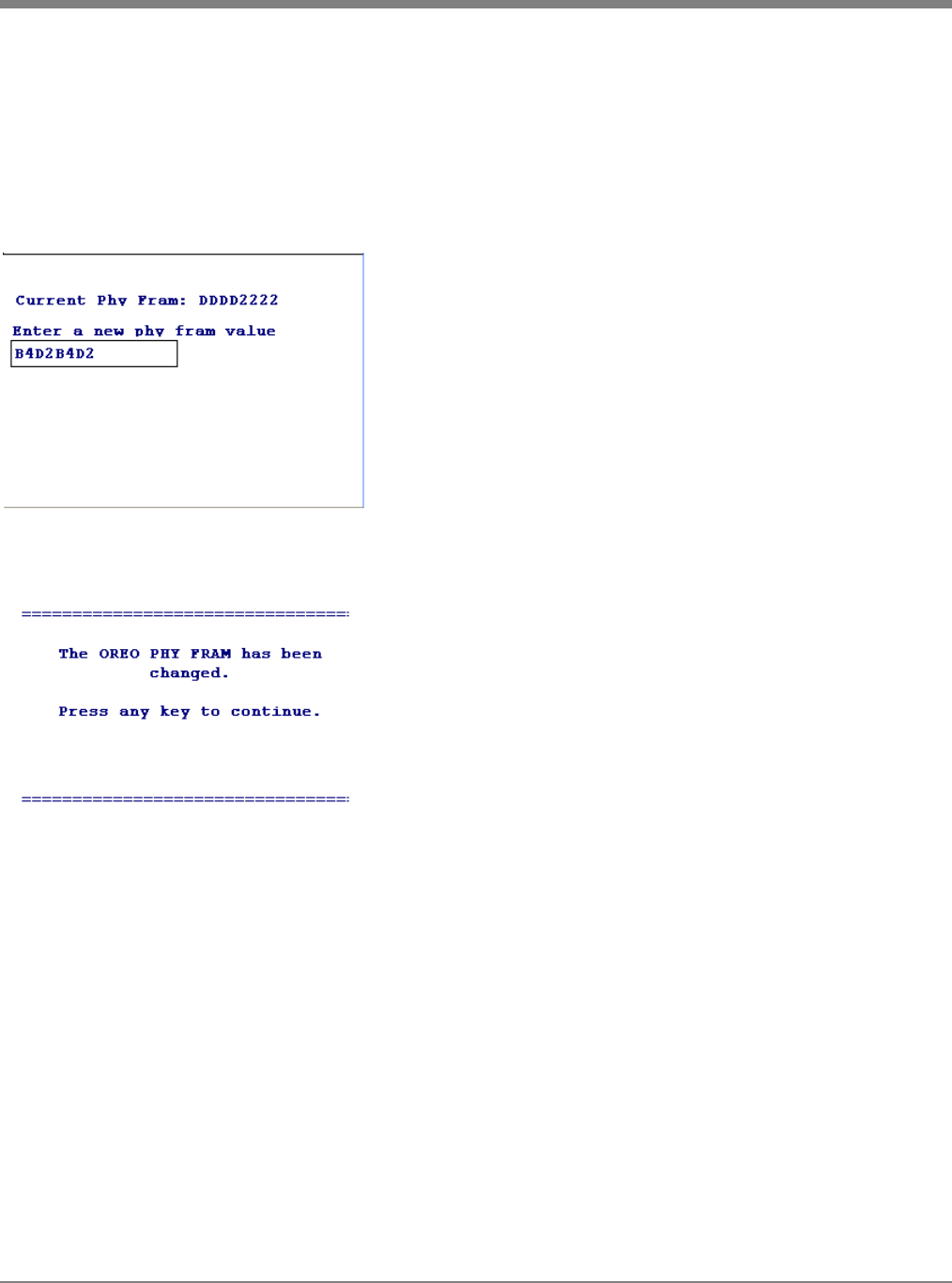
Datamatic, LTD. System Training Manual Version 08.24.12
- 53 - Confidential Datamatic, Ltd. 2012
Set Phy Fram
The Phy Fram is the setting the radio inside the ROADRUNNER uses to communicate with the
FIREFLY. The radio and FIREFLY must be on the same setting to communicate. The default Phy
Fram for all FIREFLYs is B4D2B4D2. If you are not sure what your phy fram value is, please contact
Datamatic Customer Support.
From the FIREFLY Menu, select option B. Set Phy Fram and enter the desired phy fram value.
Press Enter to update the phy fram value.
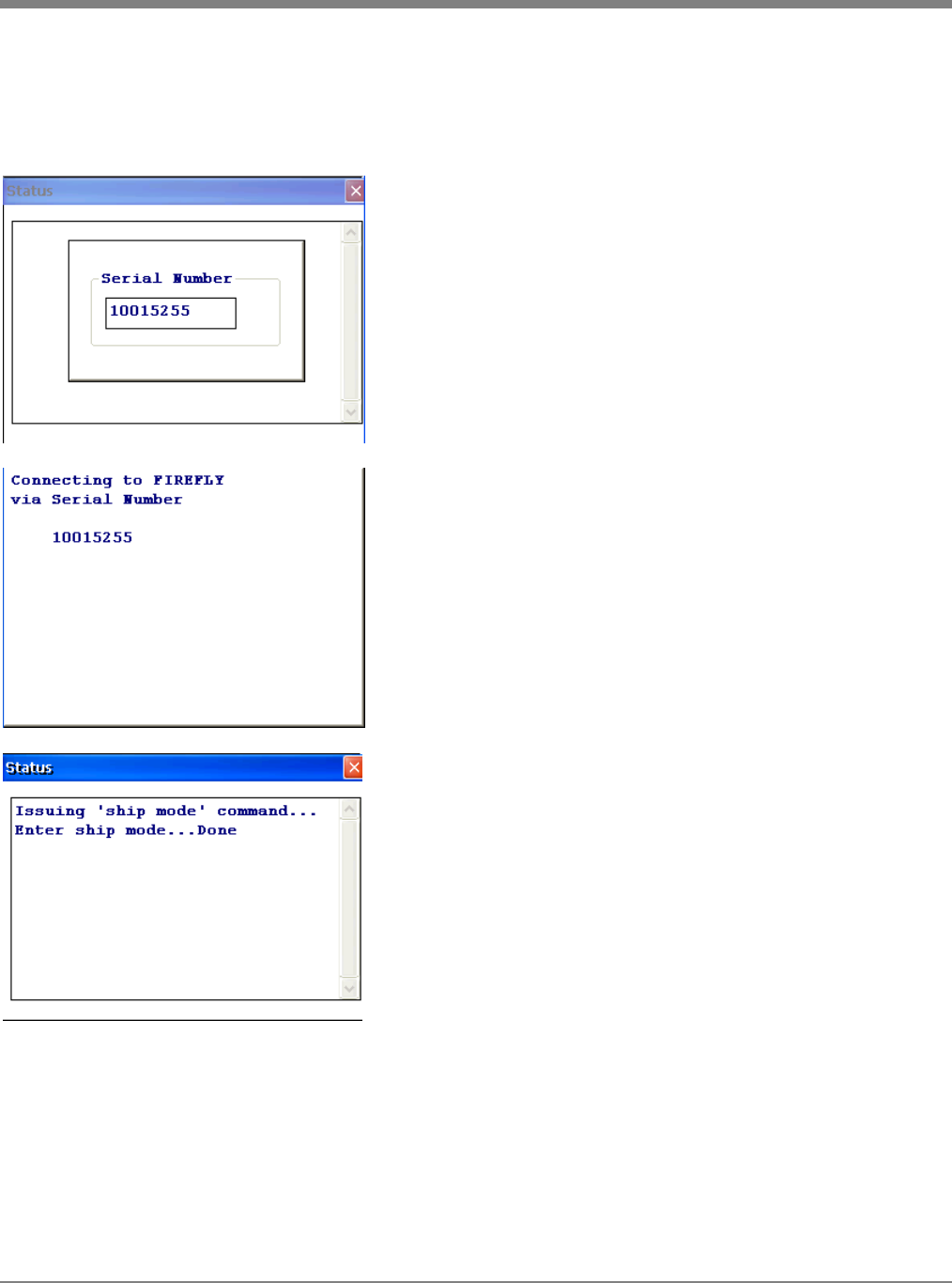
Datamatic, LTD. System Training Manual Version 08.24.12
- 54 - Confidential Datamatic, Ltd. 2012
Set FF To Ship Mode
From the FIREFLY Menu, select option D. Set FF To Ship Mode.
Enter the FIREFLY serial number and press Enter.
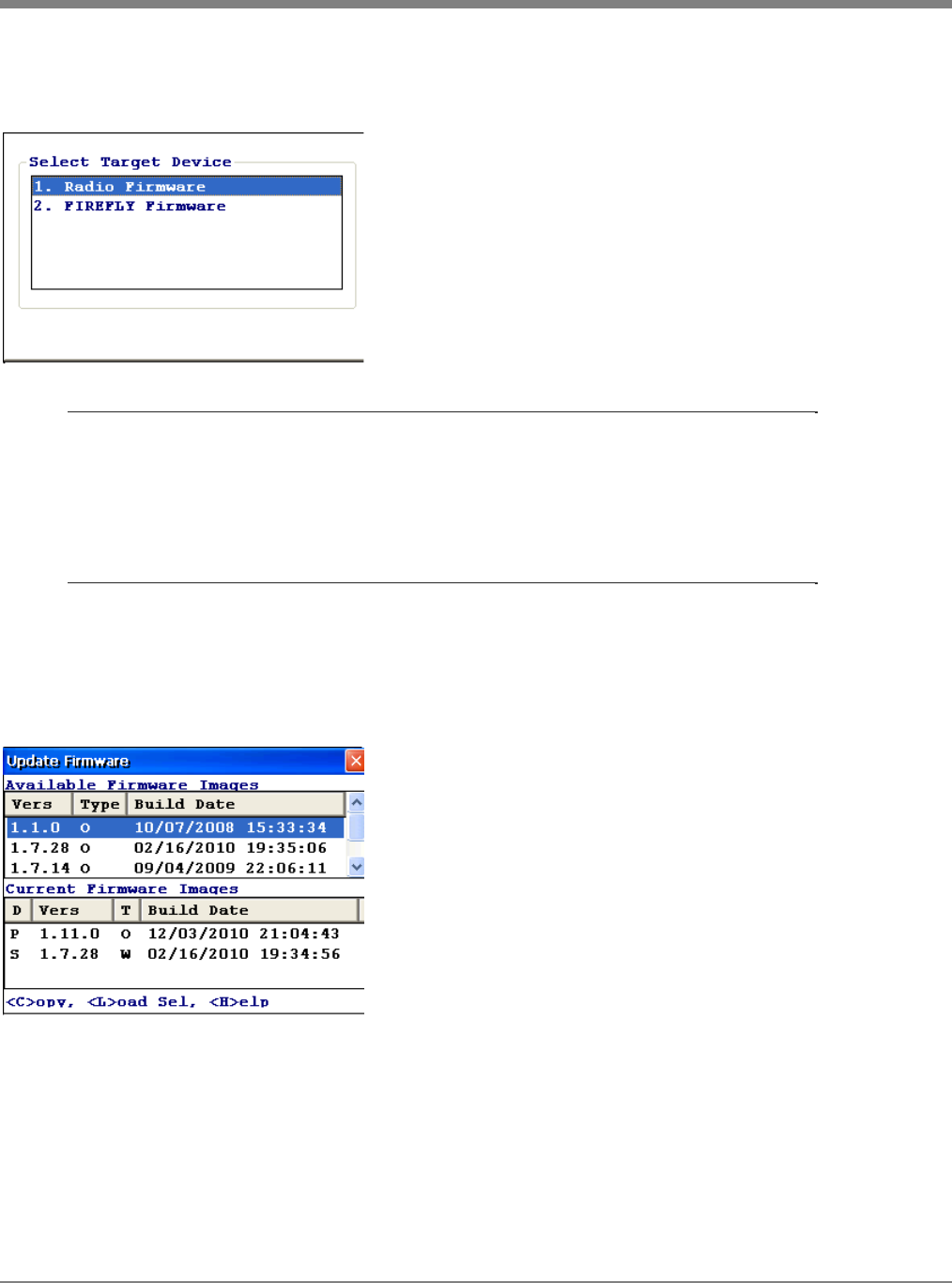
Datamatic, LTD. System Training Manual Version 08.24.12
- 55 - Confidential Datamatic, Ltd. 2012
Upgrade Firmware
From the FIREFLY Menu, select option F. Upgrade Firmware.
If the user is loading a firmware image from one type to another type, i.e. from Non-
Mesh to MESH or from MESH to Non-Mesh, if the image is being loaded into the
primary image location, the software will temporarily switch the radio mode to match the
new expected mode when the firmware image loading process has completed. This will
allow the software to verify that the image loaded correctly. When the user exits the
firmware loading dialogs, the software will switch the radio mode back to the original
settings (if necessary) prior to the firmware image loading operation.
Radio Firmware
Select option 1. Radio Firmware to update the OREO radio firmware.
The Update Firmware dialog box will list only OREO images. Select an image to send to the OREO
from the Available Firmware Images area at the top of the dialog box.
Press ‘L’ to load the selected firmware image to the radio. Select the target destination and press Enter.
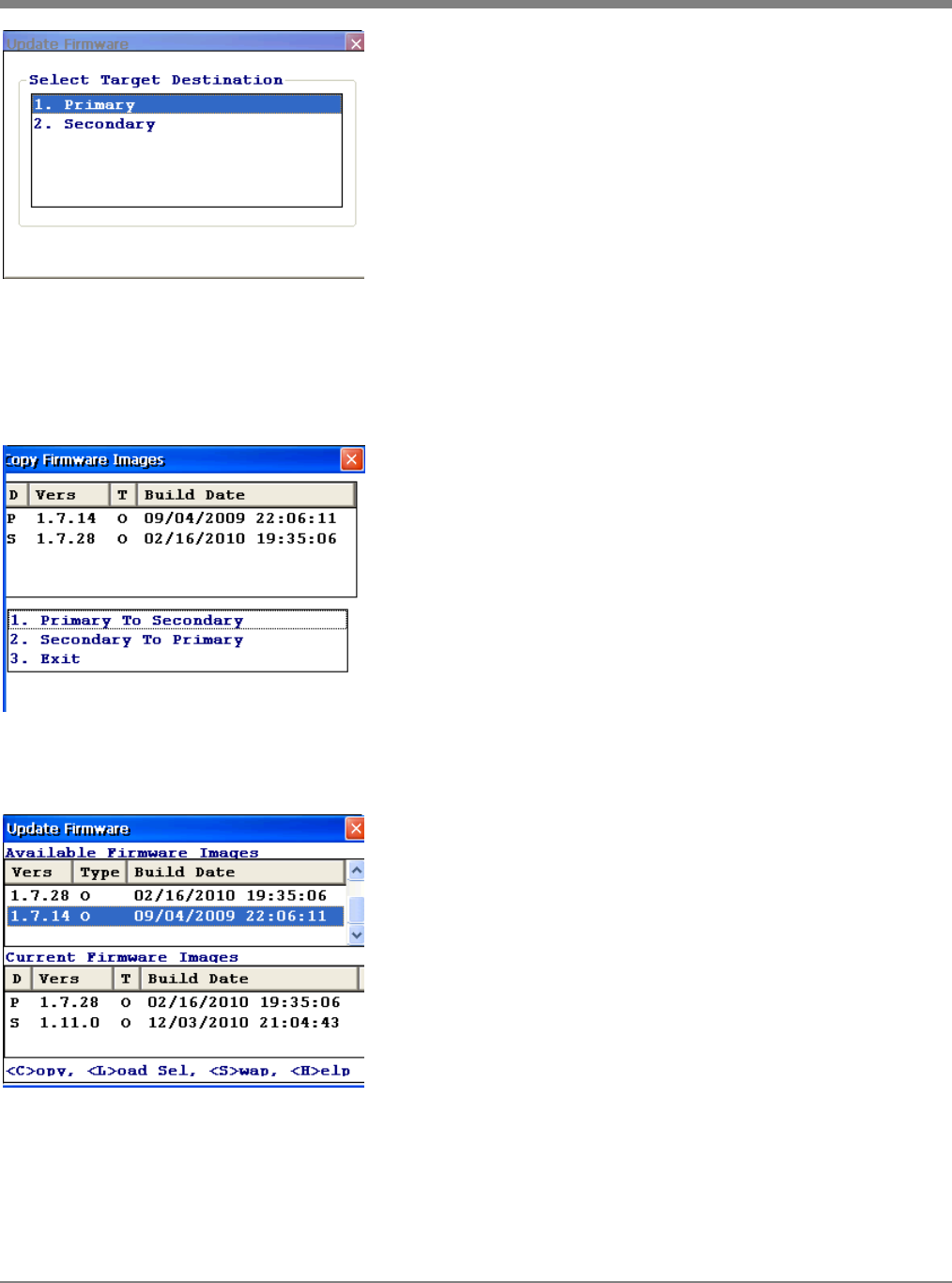
Datamatic, LTD. System Training Manual Version 08.24.12
- 56 - Confidential Datamatic, Ltd. 2012
Press ‘C’ to copy firmware currently loaded to the radio. Copy options are:
1. Primary to Secondary
2. Secondary to Primary
3. Exit
When OREO radio firmware is loaded to both the Primary and Secondary locations, and additional
option to “Swap” is available. Press ‘S’ to swap the Primary and Secondary firmware versions.
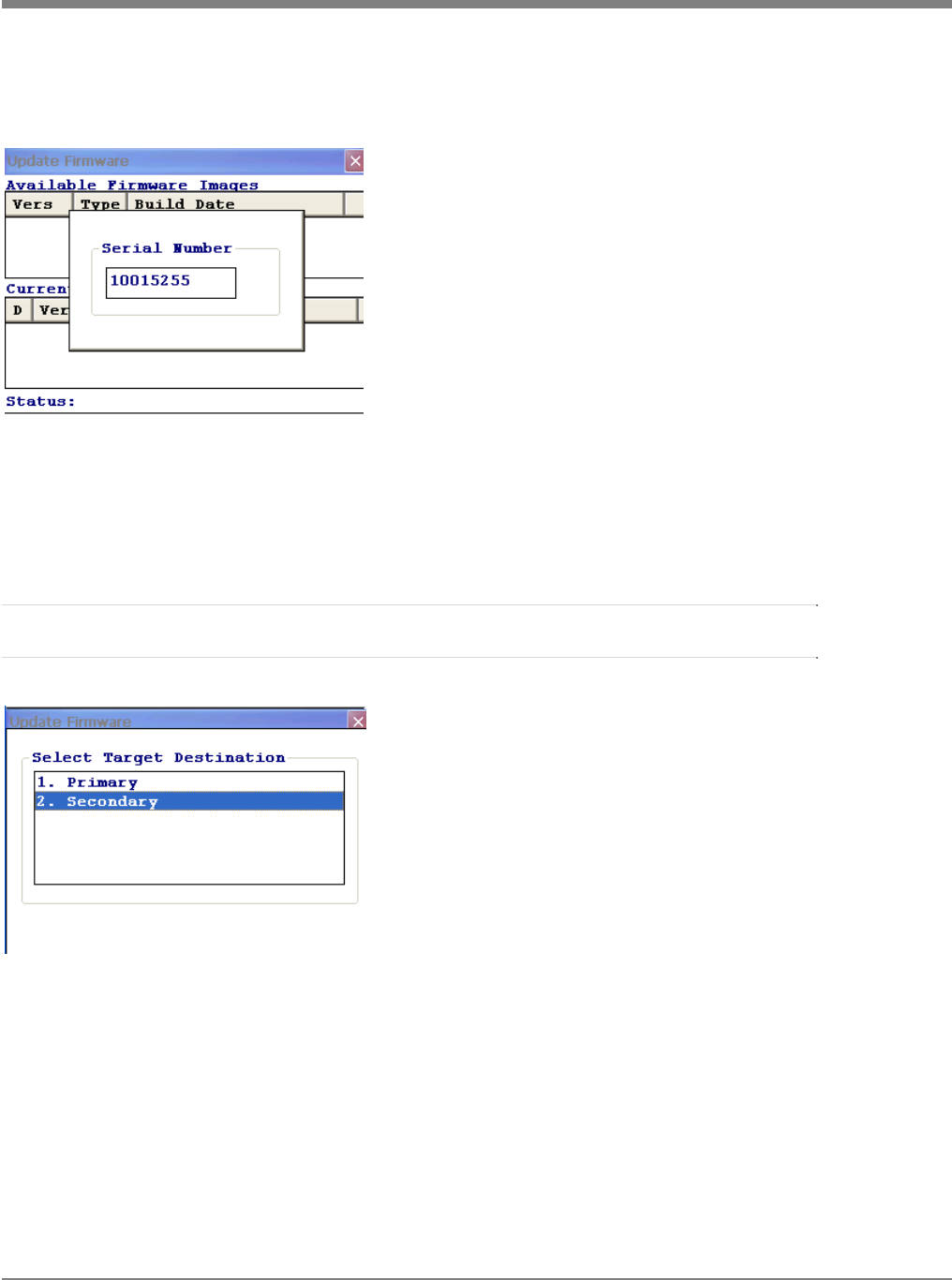
Datamatic, LTD. System Training Manual Version 08.24.12
- 57 - Confidential Datamatic, Ltd. 2012
FIREFLY Firmware
Select option 2. FIREFLY Firmware to update the FIREFLY firmware.
Enter the FIREFLY serial number and press “Enter”.
The Update Firmware dialog box will list “Available Firmware Images” at the top of the screen and
“Current Firmware Images” at the bottom of the screen. Select an image to send to the FIREFLY from
the Available Firmware Images area at the top of the screen.
Press ‘L’ to load the selected firmware image to the FIRELFY. Select the target destination and press
Enter.
NOTE: It is recommended to always load FIREFLY firmware to the Secondary location, then
swap to Primary.
Press ‘S’ to swap the Primary and Secondary firmware versions.
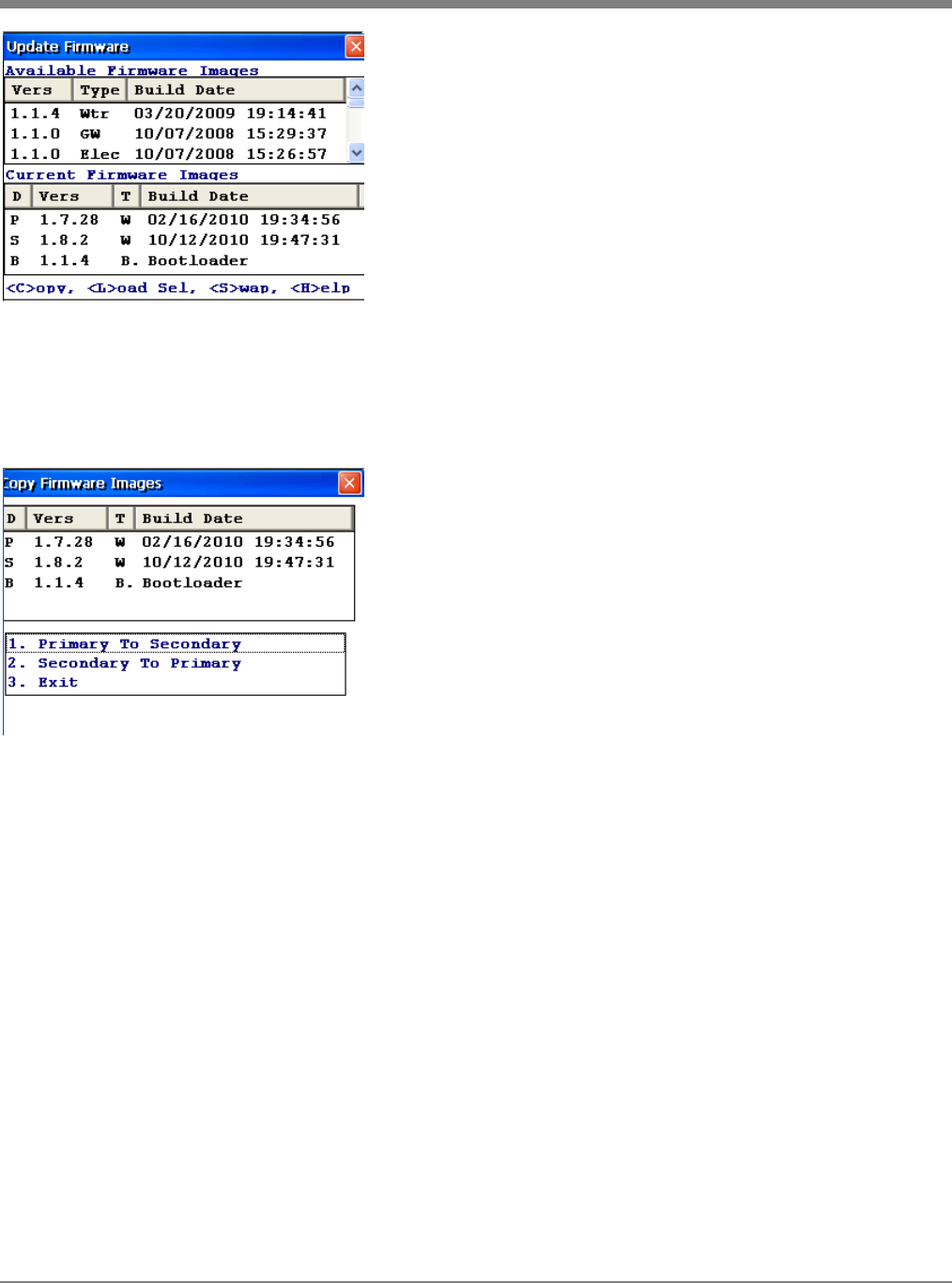
Datamatic, LTD. System Training Manual Version 08.24.12
- 58 - Confidential Datamatic, Ltd. 2012
Press ‘C’ to copy firmware currently loaded to the radio. Copy options are:
1. Primary to Secondary
2. Secondary to Primary
3. Exit

Datamatic, LTD. System Training Manual Version 08.24.12
- 59 - Confidential Datamatic, Ltd. 2012
Set FF Date/Time
From the FIREFLY Menu, select option G. Set FF Date/Time.
Enter the FIREFLY serial number and press Enter.
The ROADRUNNER will display the current ROADRUNNER time and the current FIREFLY time.
Press “Set Time” to apply the ROADRUNNER date/time to the FIREFLY. Press “Done” to quit.
Press “Enter” to return to the FIREFLY Menu.
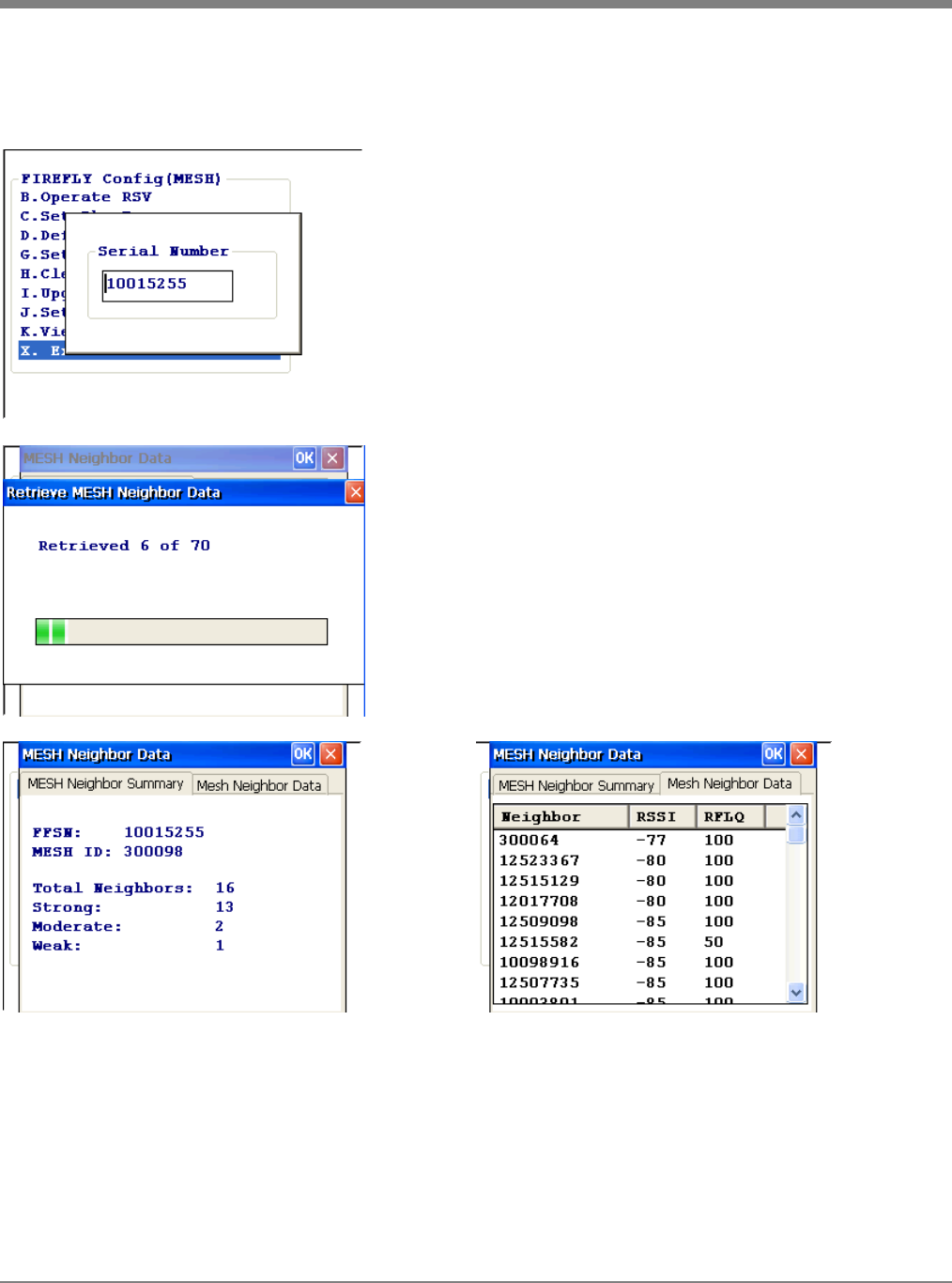
Datamatic, LTD. System Training Manual Version 08.24.12
- 60 - Confidential Datamatic, Ltd. 2012
View Mesh Neighbors
From the FIREFLY Menu, select option H. View MESH Neighbors.
Enter the FIREFLY serial number and press Enter.
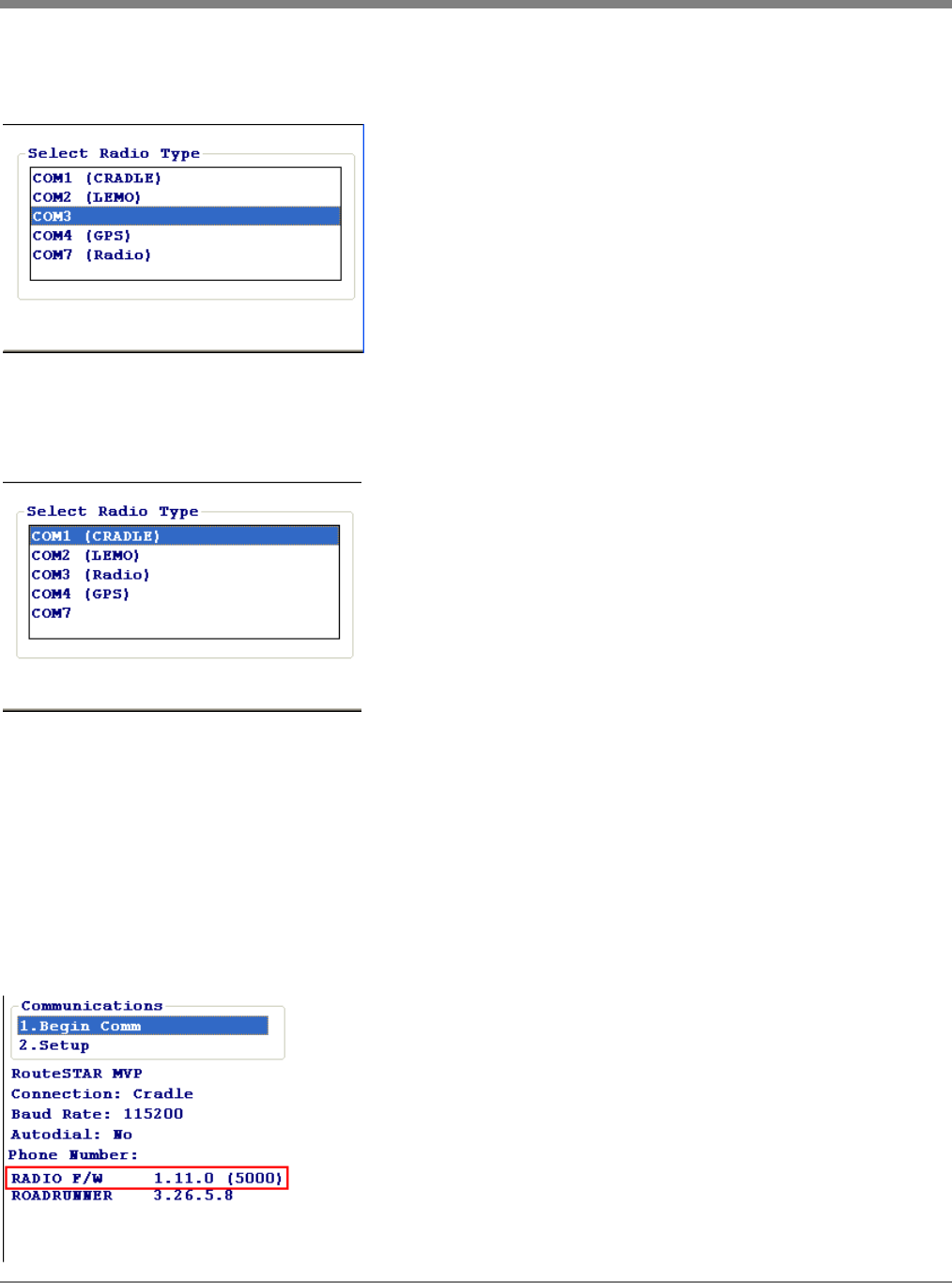
Datamatic, LTD. System Training Manual Version 08.24.12
- 61 - Confidential Datamatic, Ltd. 2012
Set Radio Port
From the FIREFLY Menu, select option I. Set Radio Port.
If the radio com port has not yet been detected, the following screen should display:
Arrow down to highlight Com 3 and press Enter. The software will attempt to detect the OREO radio
com port.
If the radio com port has been detected, the following screen should display:
In most cases, the Select Radio Type screen will display the following values:
1 = CRADLE
2 = LEMO
3 = Radio
4 = GPS
7 = USB
Another way to verify that the OREO radio com port has been detected by the software is to access the
Communications screen (press F3 from within a route) and the Radio F/W value should be displayed as
illustrated below:
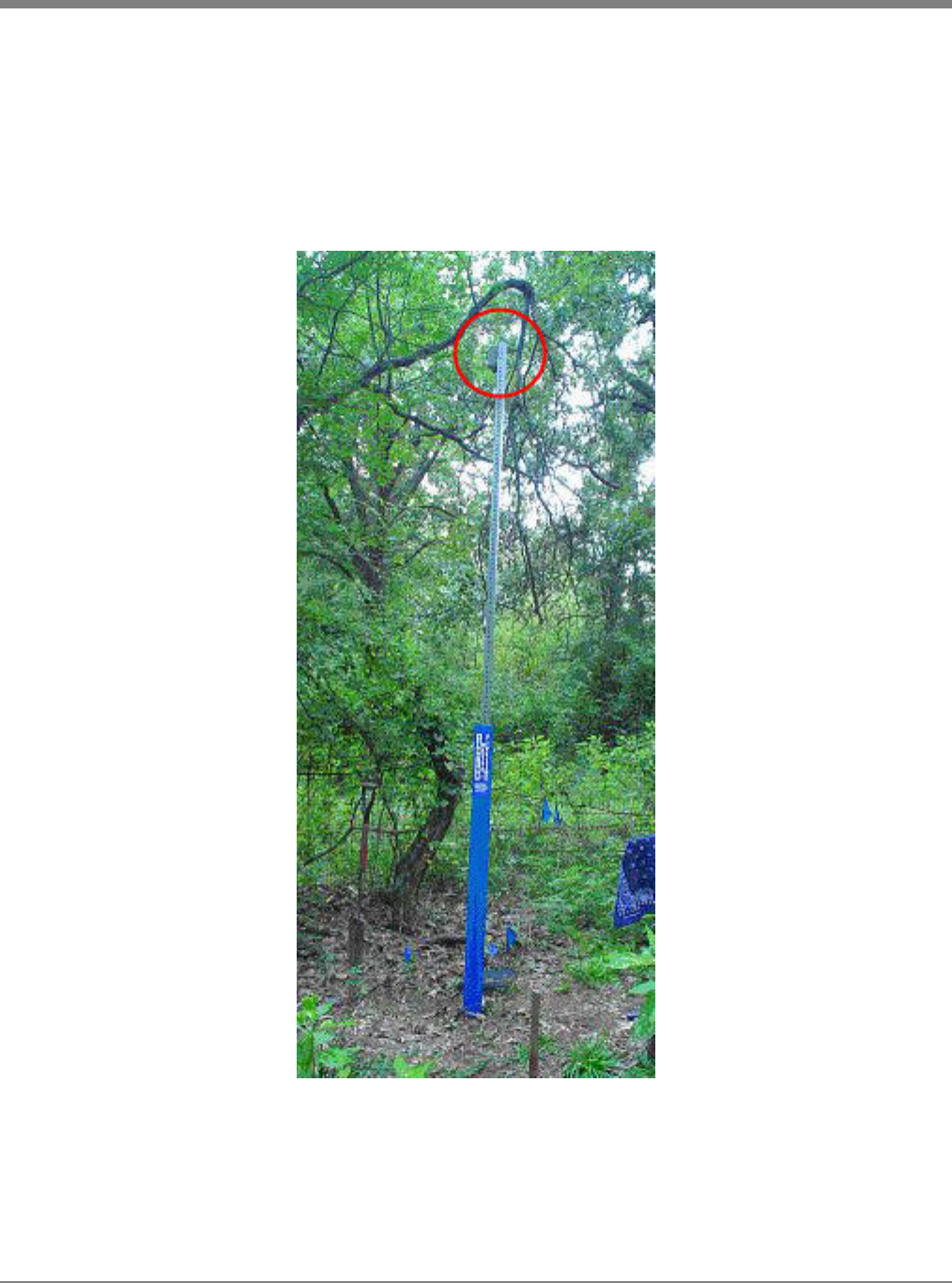
Datamatic, LTD. System Training Manual Version 08.24.12
- 62 - Confidential Datamatic, Ltd. 2012
Using a FIREFLY as a Repeater
You will need a repeater in situations where there is excess distance between installed units. Repeaters
help ‘lighten the load’ in passing data to the MOSAIC Gateway in dense installation areas and areas
with excessive RF obstructions.
• Wire red & blue together and swipe with the magnet to activate the MOSAIC FIREFLY as a
repeater.
Repeaters are ideally placed above ground with the antenna in a vertical position. When using
FIREFLYs as repeaters, they can be placed in pits, but a resulting loss of RF performance should be
anticipated. For best results and maximum coverage mount the repeater similar to the picture above.
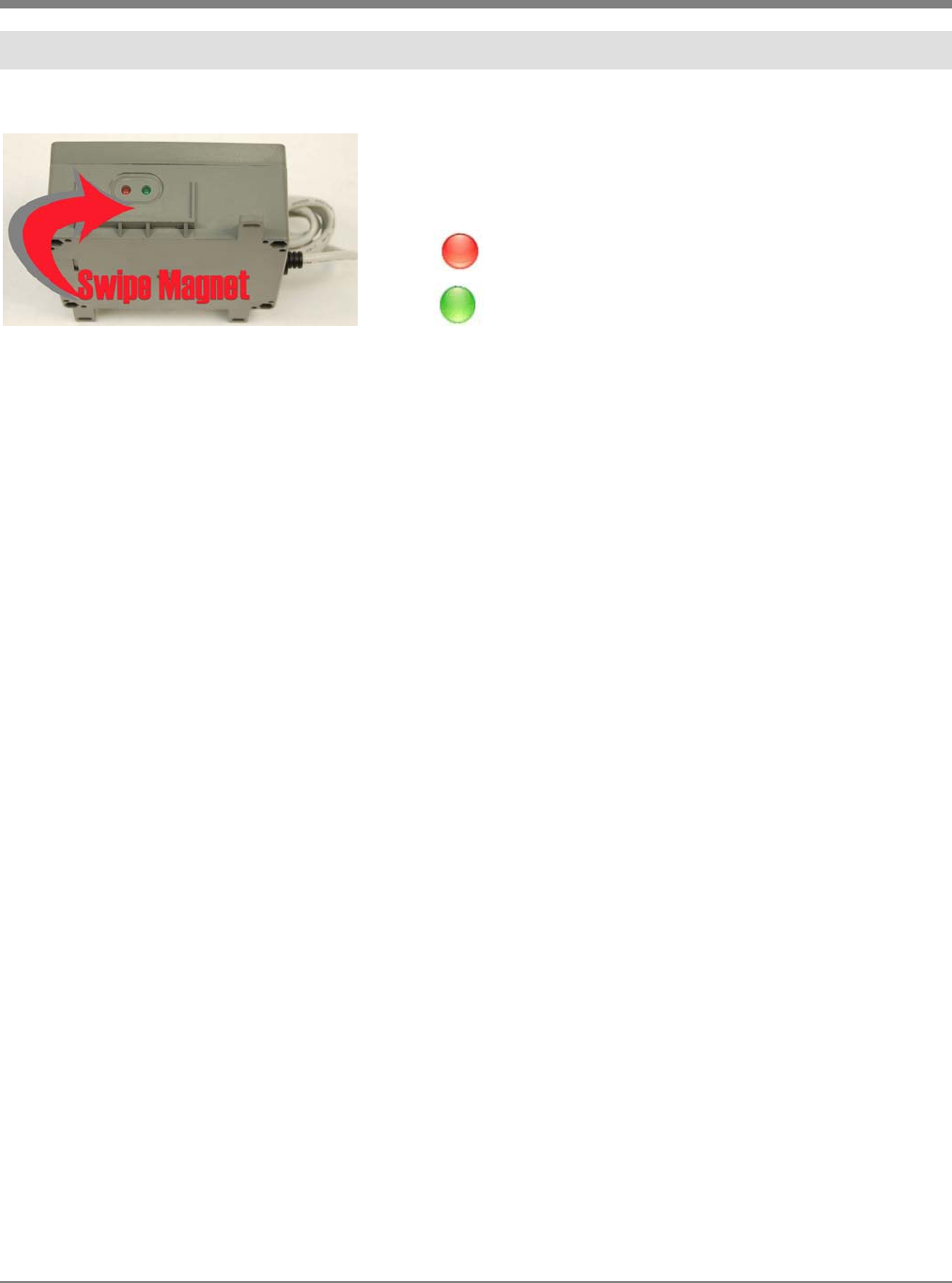
Datamatic, LTD. System Training Manual Version 08.24.12
- 63 - Confidential Datamatic, Ltd. 2012
Joining the MESH Network/LED Status
General LED Information
LED Key:
Slow blink = on and off once per second
Fast blink = on and off four times per second
= Meter Indicator
= Mesh Indicator
Swipe the magnet in the box area surrounding the lights. After a successful magnet swipe, the green
light will be solid for a very short period of time to confirm that the MOSAIC FIREFLY is initializing.
If the green light is fast blinking with no red light activity, there is a possibility that the real time clock
(RTC) has stopped and the FIREFLY will need to be returned via RMA.
A solid GREEN LED indicates that the MOSAIC FIREFLY has received a valid message from the
mesh. Confirmation that the MOSAIC FIREFLY has successfully transmitted to the mesh is indicated
by the appearance of the FF in the MOSAIC software.
Generally, in mesh mode the GREEN LED indicates the status of MOSAIC FIREFLY communications
with the mesh. The RED LED indicates the status of MOSAIC FIREFLY communications with the
meter.
After a certain amount of time, the LEDs will go out during normal operation. This is a power-save
mode. The MOSAIC FIREFLYs will be performing normally, but not exhibiting LED behavior. When
MOSAIC FIREFLYs are in “ship mode” they are literally turned off and can be reactivated by following
normal installation procedures.
MOSAIC FIREFLYs in non-mesh mode do not communicate via the mesh. The RED LED indicates
the status of the MOSIAC FIREFLY’s communications with the meter. The RED and GREEN LEDs
flash in unison every 5 seconds to indicate that the MOSIAC FIREFLY is functioning in non-mesh
mode.

Datamatic, LTD. System Training Manual Version 08.24.12
- 64 - Confidential Datamatic, Ltd. 2012
MOSAIC FIREFLYs Connected to an Encoded Meter (Mesh Mode)
After a successful initial swipe, the GREEN LED will flash slowly as the MOSAIC FIREFLY searches
for the mesh. When communication has been established with a node already connected to the mesh
(MOSAIC Gateway, Repeater or another MOSAIC FIREFLY) the GREEN LED will go solid.
Additionally, the RED LED will flash slowly until it detects the encoder. If the MOSAIC FIREFLY
successfully connects to the encoder, the RED LED will go solid.
If the RED LED flashes quickly, the MOSAIC FIREFLY has detected its connection to a meter, but has
not received an acknowledgement that verifies it is connected to a supported encoder. In this scenario,
the wires may not be connected correctly or the encoder may not be supported in the current MOSAIC
FIREFLY firmware.
If the RED LED flashes slowly, the MOSAIC FIREFLY is searching for an acknowledgement from a
meter, but has not received any. The MOSAIC FIREFLY will continue to wait for an
acknowledgement, but will eventually go into ship mode if none is received.
The MOSAIC FIREFLY is successfully connected to an encoded meter and the mesh when both the
GREEN and RED LEDs are solid.
MOSAIC FIREFLYs Connected to a Pulse Meter (Mesh Mode)
After a successful initial swipe, the RED LED will blink slowly until it detects a connection with a pulse
meter. NOTE: this happens very quickly.
Once the MOSAIC FIREFLY detects the connection to a pulse meter, the RED LED blinks quickly until
5 meter pulses are detected. Once 5 pulses are detected, the RED LED will go solid.
If the MOSAIC FRIEFLY is not wired correctly, the RED LED will continue blink slowly, or the
MOSAIC FIREFLY could go back into ship mode (meaning the RED LED will go off after the magnet
swipe).
MOSAIC Sensor-end FIREFLYs (Mesh Mode)
After a successful magnet swipe, the RED LED will blink slowly as the FIREFLY attempts to achieve
the Target Background. Once the RED LED begins a fast blink then goes solid, the FIREFLY has
achieved the target background.
Additionally, the GREEN LED will flash slowly as the MOSAIC FIREFLY searches for the mesh.
When communication has been established with a node already connected to the mesh (MOSAIC
Gateway, Repeater or another MOSAIC FIREFLY) the GREEN LED will go solid.
If both the RED LED and the GREEN LED blink slowly, then go off. The FIREFLY was unable to
achieve the target background. Reprogramming should be attempted.

Datamatic, LTD. System Training Manual Version 08.24.12
- 65 - Confidential Datamatic, Ltd. 2012
MOSAIC FIREFLYs as Repeaters (Mesh Mode)
When wired as a repeater, after a successful initial swipe, the RED LED will go solid and the GREEN
LED will flash slowly as the MOSAIC FIREFLY searches for the mesh. When communication has
been established with a node already connected to the mesh (MOSAIC Gateway, Repeater or another
MOSAIC FIREFLY) the GREEN LED will go solid.
MOSAIC FIREFLYs in Non-Mesh Mode
After a successful magnet swipe, the green light will be solid for a very short period of time to confirm
that the MOSAIC FIREFLY is initializing. There is no other GREEN LED behavior on MOSAIC
FIREFLYs in non-mesh mode until programming is complete. When MOSAIC FIREFLYs in non-mesh
mode are working correctly, the RED and GREED LEDs will flash in unison every 5 seconds.
MOSIAC FIREFLYs on Encoded Meters (Non-Mesh Mode)
After a successful initial swipe, the RED LED will flash slowly until it detects the encoder. If the
MOSAIC FIREFLY successfully connects to the encoder, the RED LED will go solid.
If the RED LED flashes quickly, the MOSAIC FIREFLY has detected its connection to a meter, but has
not received an acknowledgement that verifies it is connected to a supported encoder. In this scenario,
the wires may not be connected correctly or the encoder may not be supported in the current MOSAIC
FIREFLY firmware.
If the RED LED flashes slowly, the MOSAIC FIREFLY is searching for an acknowledgement from a
meter, but has not received any. The MOSAIC FIREFLY will continue to wait for an
acknowledgement, but will eventually go into ship mode if none is received.
MOSAIC FIREFLYs on Pulse Meters (Non-Mesh Mode)
After a successful initial swipe, the RED LED will blink slowly until it detects a connection with a pulse
meter. NOTE: this happens very quickly.
Once the MOSAIC FIREFLY detects the connection to a pulse meter, the RED LED blinks quickly until
5 meter pulses are detected. Once 5 pulses are detected, the RED LED will go solid.
If the MOSAIC FRIEFLY is not wired correctly, the RED LED will continue to blink slowly, or the
MOSAIC FIREFLY could go back into ship mode (meaning the RED LED will go off after the magnet
swipe).
MOSAIC FIREFLYs (D411X only) Connected to Remote Shutoff Valves
The Remote Shutoff Valve (RSV) controls a water valve remotely. The RSV is connected to a
FIREFLY. The ROADRUNNER or MOSAIC communicates to the FIREFLY to control the RSV. The
ROADRUNNER is able to control the RSV with or without a route loaded. There are 3 functions that
can be performed on a RSV; Open RSV, Close RSV, and get current status of RSV (Open or Closed).
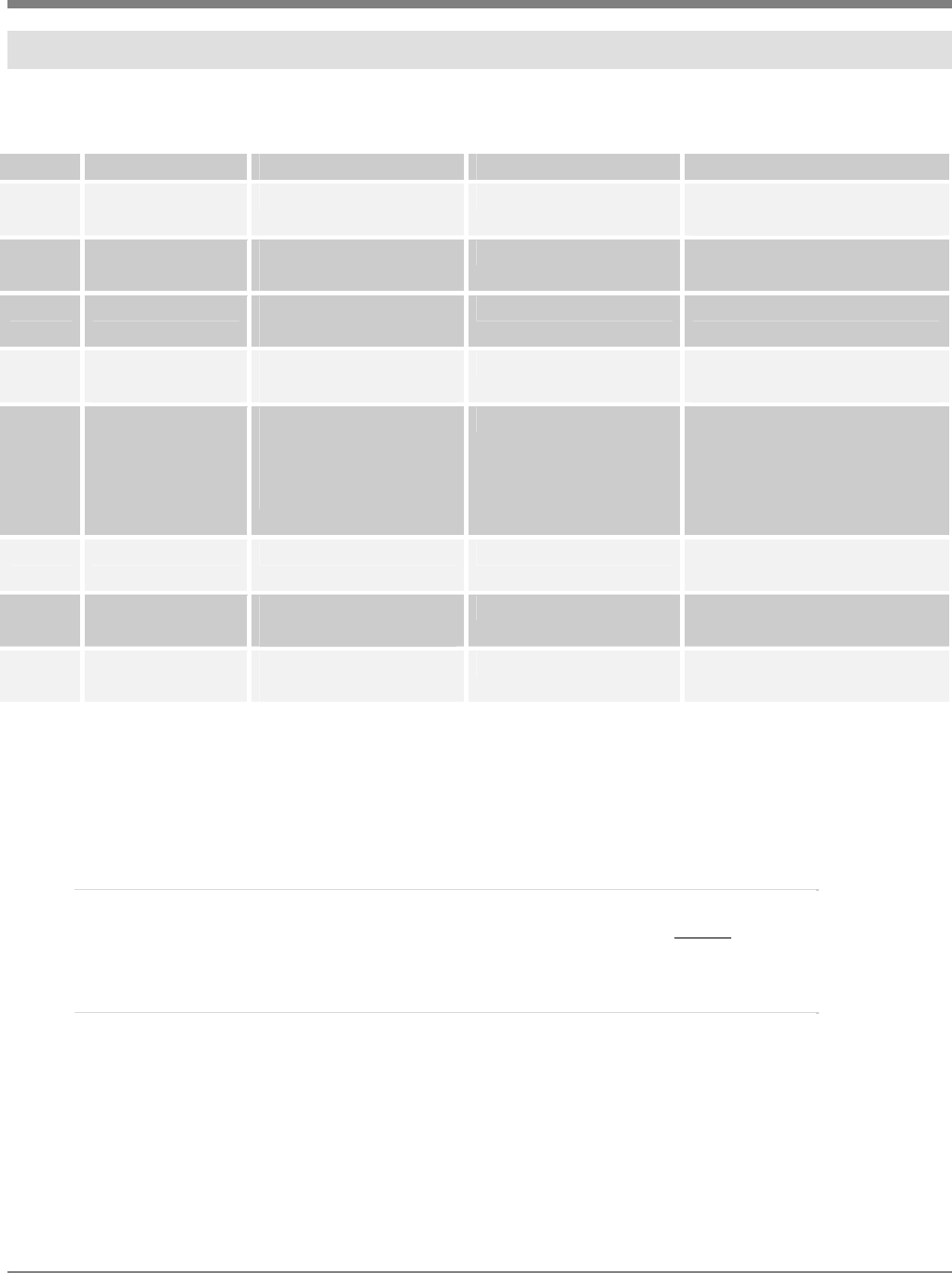
Datamatic, LTD. System Training Manual Version 08.24.12
- 66 - Confidential Datamatic, Ltd. 2012
Troubleshooting Procedures
MOSAIC FIREFLY Codes
Code Description Meaning Onsite visit Y or N? Steps To Resolve
BA10 Battery Battery is low Yes RMA for battery
replacement
Ta40 Tamper System recorded
En70 48 times Yes Perform Connection
Troubleshooting* below
Le60 Leak 25 hours of continual
consumption Yes Check for leak
EN70 Encoder Not
Read Did not receive
reading Yes Perform Connection
Troubleshooting* below
EN80 Encoder Invalid “Other” message.
System received
“garbled” data from
meter
No Should get a reading at
next scheduled reading
time. Check register if the
message is being
transmitted frequently.
MESH Mesh Alarm Hardware Alarm Yes Remove & Replace
immediately
Pr11 Primary Image Loading primary
image No Should not affect reading
Se13 Secondary
Image Loading secondary
image No Should not affect reading
Connection Troubleshooting
1. Check for physical damage to the MOSAIC FIREFLY wire.
2. Check for physical damage to the Register.
3. If possible, test the register head.
NOTE: Water FIREFLY Firmware Version 1.8.22 and greater will no longer re-auto
detect when mag swiped. Instead, the red LED behavior when encoders are not exiting
from ship mode has been modified. Now, slow blink red means ‘no communication
with encoder’ and fast blink red means ‘good encoder read.’ The LED functionality
when exiting out of ship mode and/or non-encoded registers remains the same.
4. If there is no physical damage detected resplice and reswipe the MOSAIC FIREFLY.
a. Repeat step several times if necessary.
b. If the red light goes solid, repot the MOSAIC FIREFLY and continue to monitor.
c. Request an RMA if the issue persists.
Unread Meters Troubleshooting
1. Research in the MOSAIC Software Interface to determine when the last read was and check for
possible patterns.

Datamatic, LTD. System Training Manual Version 08.24.12
- 67 - Confidential Datamatic, Ltd. 2012
2. If the MOSAIC FIREFLY is unable to join the network:
a. Verify that the MOSAIC FIREFLY is installed and mounted properly in the meter pit
b. Swipe the meter & refer to the LED Operational States for verification of functional
status Mesh (light will slow blink green). Go to the nearest neighboring MOSAIC
FIREFLY and swipe.
c. Check the unread MOSAIC FIREFLY for solid green light (this process can take several
attempts). Before swiping both units must be “asleep” (no LED lights) before attempting
to swipe again.
3. Continue monitoring in MOSAIC Software & replace unread MOSAIC FIREFLY if the issue
persists.
4. If after all troubleshooting is complete & you are unable to achieve a solid green light the
MOSAIC FIREFLY should be replaced.
a. If there is no LED response within 5 seconds of magnet swipe retry several times. If the
unit in question continues to be unresponsive it should be replaced.
Red Light is Not Solid After Installation
The MOSAIC FIREFLY has been wired but the red light never changes to solid upon installation.
1. Check the wire connections, it is likely there is a wiring problem.
2. Verify that the register head is working.
NOTE: When connected to a pulse meter, the red light will fast-blink until 5 pulses are received.
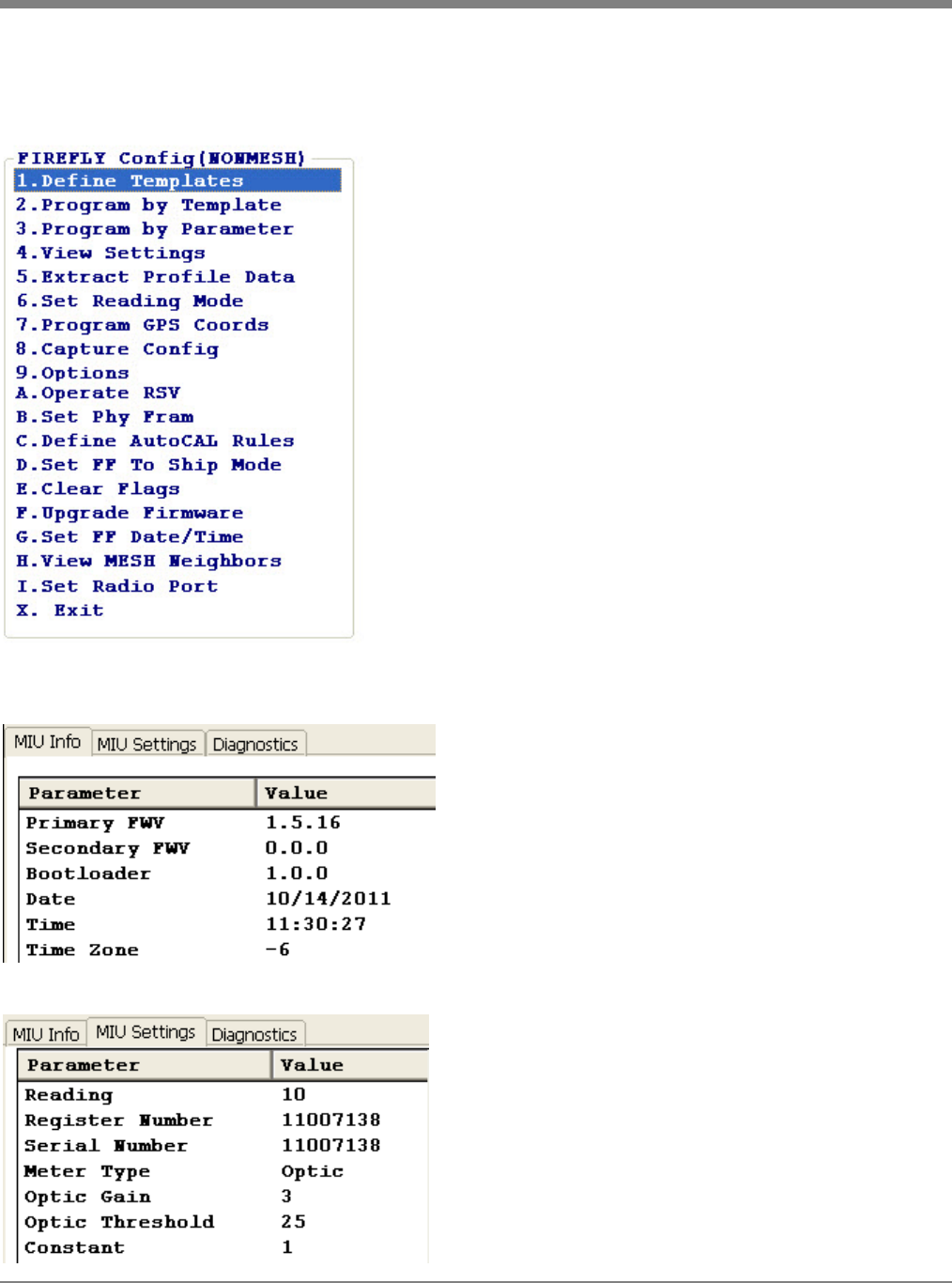
Datamatic, LTD. System Training Manual Version 08.24.12
- 68 - Confidential Datamatic, Ltd. 2012
Troubleshooting Sensor FIREFLYs
Press the FFMNU key (F5 key) bring up the MOSAIC FIREFLY Config Menu.
Select item 4 (View Settings) to display Current Settings of the FIREFLY.
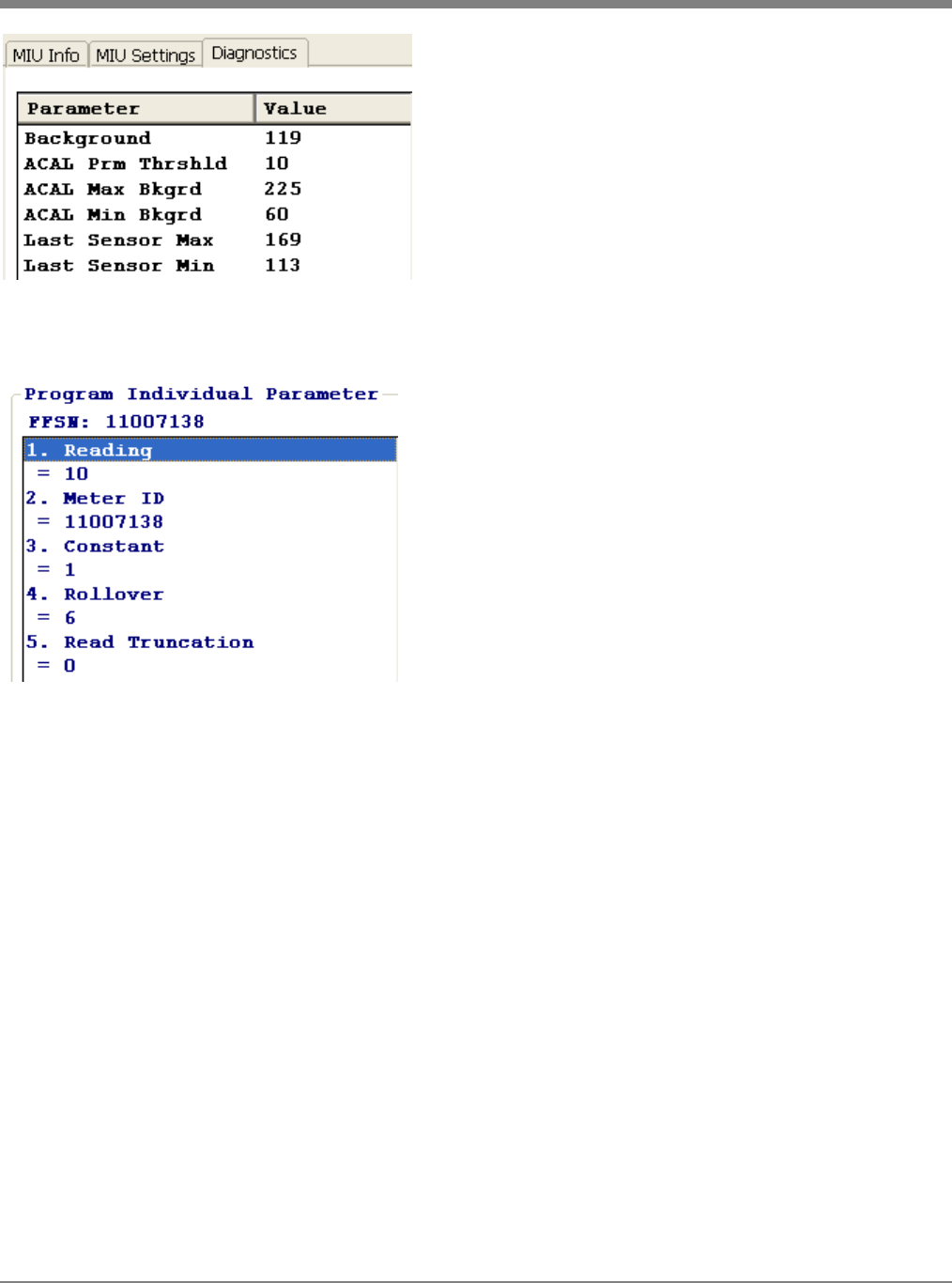
Datamatic, LTD. System Training Manual Version 08.24.12
- 69 - Confidential Datamatic, Ltd. 2012
Select item 3 (Program by Parameter) to view the Individual Parameters of the FIREFLY.

Datamatic, LTD. System Training Manual Version 08.24.12
- 70 - Confidential Datamatic, Ltd. 2012
Making Adjustments for Inaccurate Sensor-end FIREFLYs
Symptom By a small “Delta” <100
Over-counting Raise Threshold one level
Under-counting Drop Threshold one level
Manually Calibrating the Sensor-end FIREFLY
To manually calibrate the FIREFLY, access the Program Individual Parameters screen on the
ROADRUNNER.
• Check the Reading, and Optic Threshold parameters. Correct these values as needed. (Optic
Threshold range is 6 – 50.) Be sure the FIREFLY reading accurately matches the reading of the
meter.
• Check to make sure all other parameters were entered correctly.
• Select Done. This will update the parameters.
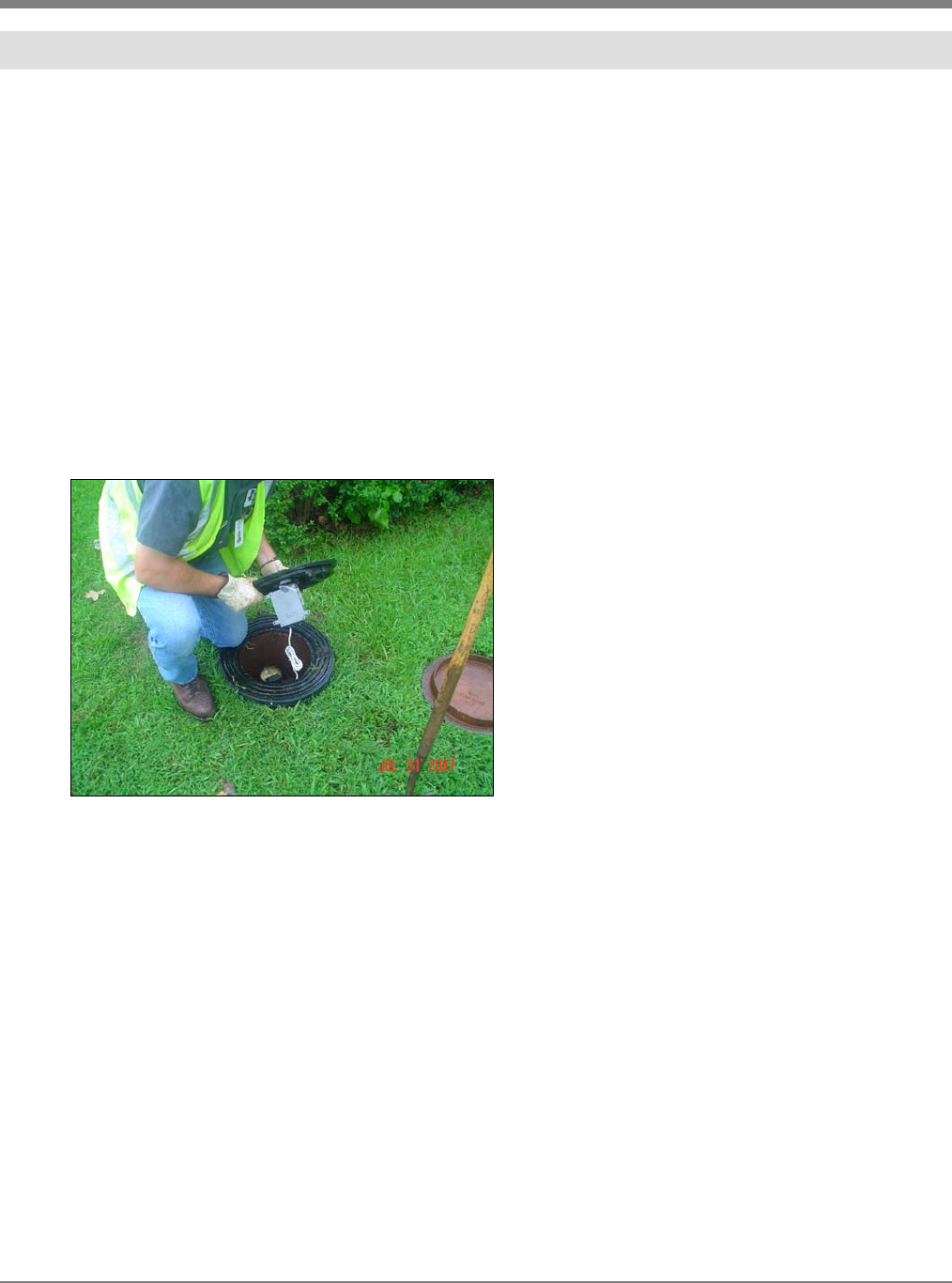
Datamatic, LTD. System Training Manual Version 08.24.12
- 71 - Confidential Datamatic, Ltd. 2012
Mounting the MOSAIC FIREFLY
Basic Install Information:
• Mount the MOSAIC FIREFLY in the meter box with the neck/antenna pointing up.
• Mounting can be accomplished by attaching the MOSAIC FIREFLY to a wall, stake, through the
hole in the meter box/vault lid, or with Lid Lock, adapter and spacers.
• When utilizing a Lid Lock, make certain to not over-tighten the MOSAIC FIREFLY within the
lock.
• Check for lid clearance; be sure to never rest the weight of the meter lid on the MOSAIC
FIREFLY.
• Secure the lid back on the pit.
Wall Mount / Basement Splice Mount
• Make sure the antenna points up.
• Secure the MOSAIC FIREFLY to the wall.
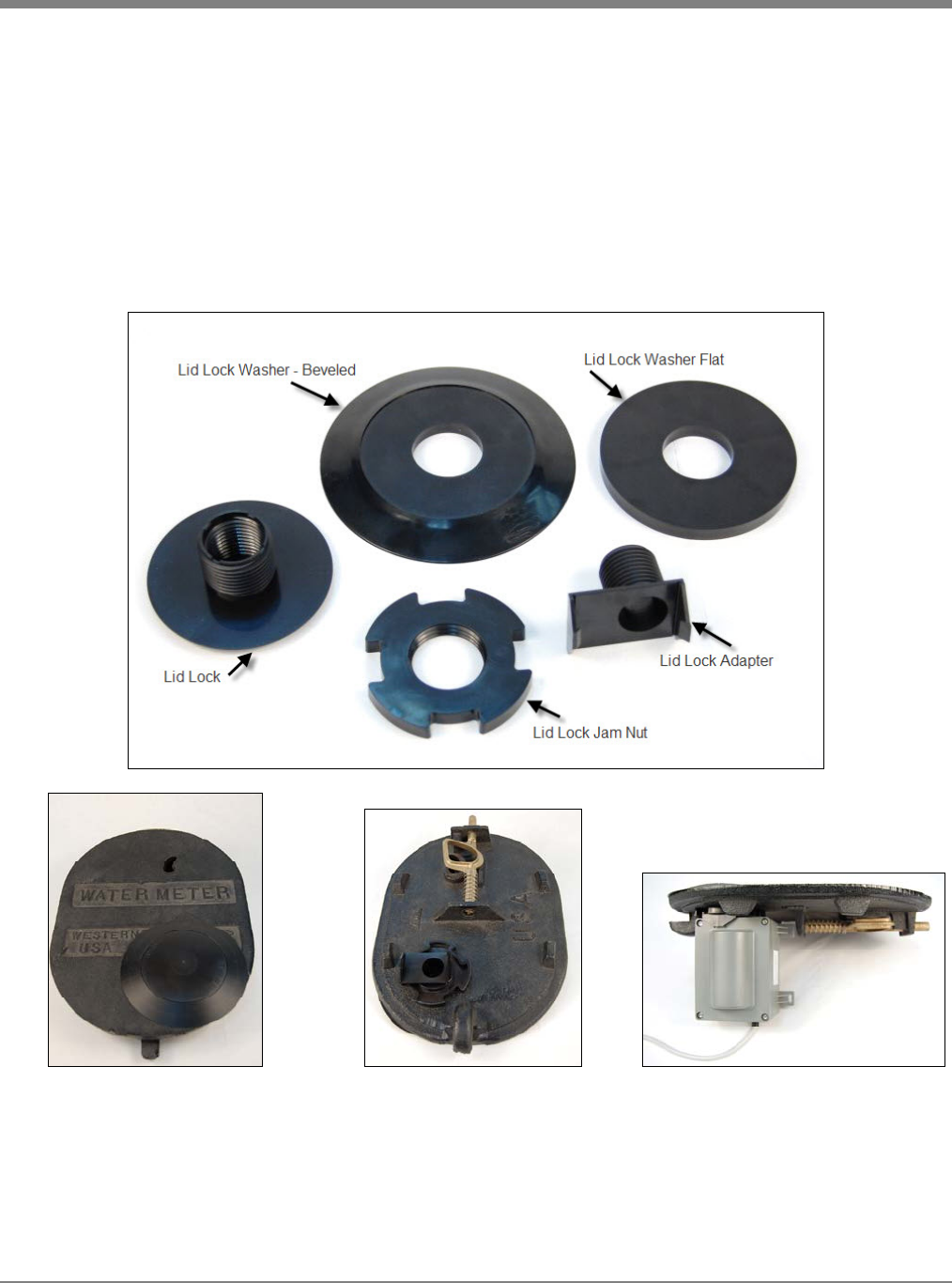
Datamatic, LTD. System Training Manual Version 08.24.12
- 72 - Confidential Datamatic, Ltd. 2012
Lid Lock Mount
• Verify that you have a Lid Lock Adapter Spacer Ring.
• Never rest the lid on the MOSAIC FIREFLY.
• Do not over tighten the lid lock.
• Both clips should be inserted fully into the MOSAIC FIREFLY.
Vault Mount
• Mount the MOSAIC FIREFLY as high as possible.

Datamatic, LTD. System Training Manual Version 08.24.12
- 73 - Confidential Datamatic, Ltd. 2012
FAQ’s
Can I use both MOSAIC Gateway backhaul types in a single installation?
Yes.
Will I see a difference as far as data collection between the two MOSAIC Gateway backhaul
configurations?
No, you will not see a difference.
Why would I need to use GPRS in an installation?
GPRS works well in areas where other types of backhaul coverage are not available.
How many MOSAIC FIREFLYs can mesh together?
Typically 1-24 MOSAIC FIREFLYs can communicate directly with each other. The minimum number
of MOSAIC FIREFLY connections needed to continue the mesh is 1. The total number of MOSAIC
FIREFLYs per MOSAIC Gateway is optimal at 750-850.
What is the output power of a MOSAIC FIREFLY?
Transmissions are rated at 250mW.
What is the range of a MOSAIC FIREFLY?
Above ground = approximately ¾ mile (line of sight). Pit mounted (through lid) = 500’ – 750’
(depending on lid material). Many variables affect range, including topography, meter lid material and
height of the MOSAIC Gateway.
Are the new MOSAIC FIREFLYs compatible with previous legacy FIREFLYs?
No, the transmission frequencies and messages scheme are different; thus a new radio is needed for
handheld, mobile and mesh readings.
Do the MOSAIC FIREFLYs read via the ROADRUNNER MOBILE product?
Yes, a mobile reading mode is available with the same hardware used for Mesh reading.
Will I need different MOSAIC FIREFLYS for Mesh and Mobile functionality?
No, the same hardware used for mobile mode will work with both.
How do I program an MOSAIC FIREFLY?
MOSAIC FIREFLYs are programmed via 2-way radio communications from a handheld programmer.
New schedules, profile requests and firmware are also loaded via the Mesh.
What does your handheld programming tool look like?
The handheld programmer is a Datamatic, LTD ROADRUNNER CX unit with a MOSAIC 2-way radio.

Datamatic, LTD. System Training Manual Version 08.24.12
- 74 - Confidential Datamatic, Ltd. 2012
What is the battery life for the MOSAIC FIREFLY?
When run at a 20 minute mesh interval, 10 plus years.
Is the battery pack replaceable?
Yes, the battery pack can be replaced at Datamatic.
What frequency does the MOSAIC product use?
We use a Frequency Hopping Spread Spectrum (FHSS) over the 902-928 MHz band. 50 separate
frequencies are utilized.
Do you use a licensed frequency?
The radio frequency that Datamatic, LTD uses operates on the ISM band, which is unlicensed.
Does your product provide profiling?
Yes the battery operated MOSAIC FIREFLYS have 320 days of hourly profile data on board.
How do you get the profiling?
Profile data is extracted in two ways, the MOSAIC FIREFLY can be programmed via the mesh to
send an hourly profile packet along with its midnight read, or you can use the RR programmer to
extract the profile data on demand (in development). Keep in mind that requesting profile data over
the Mesh in large quantities will take time and network resources.
How often do I get reads via the Mesh?
Battery powered MOSAIC FIREFLYs send in daily readings by default, with the ability to send in
up to hourly.
Is the system 2-way?
Yes, the MOSAIC FIREFLYS can send data and receive commands from the MOSAIC Gateway,
which in turn communicates with the back office utility. MOSAIC FIREFLYs can also
communicate 2-way with a handheld programmer.
What can I do with the 2-way functionality?
Update schedules, configurations, extract profile or other data, and more. Communications can be
broadcast to an entire Mesh or directed to an individual MOSAIC FIREFLY.
Does the MOSAIC system have repeaters?
Yes, low cost repeaters are utilized to bridge the gap between distant MOSAIC FIREFLYs to reduce
network congestion at unavoidable Mesh network bottlenecks or to reduce latency.
How do the MOSAIC FIREFLY repeaters work?
Each MOSAIC FIREFLY already acts as a repeater. Units wired and dedicated as a MOSAIC
FIREFLY repeater utilize the same firmware but do not read a meter and therefore only repeat
readings upstream that they receive.

Datamatic, LTD. System Training Manual Version 08.24.12
- 75 - Confidential Datamatic, Ltd. 2012
What is the MOSAIC FIREFLY repeater battery life?
It works similar to that of a MOSAIC FIREFLY.
Do you support cellular backhaul from the MOSAIC Gateway?
Yes, via GPRS only at this time.
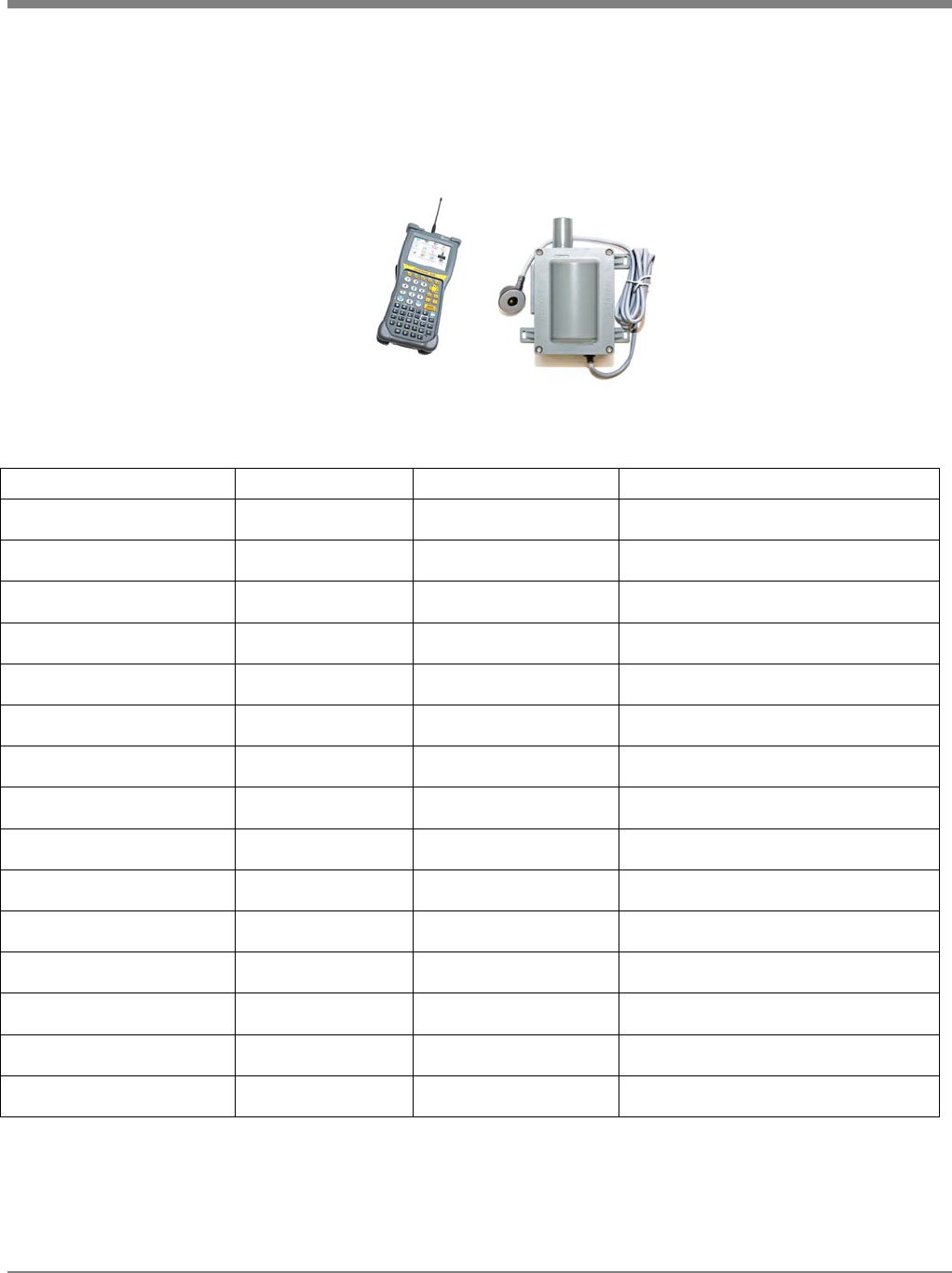
Datamatic, LTD. System Training Manual Version 08.24.12
- 76 - Confidential Datamatic, Ltd. 2012
Appendix A
ROADRUNNER CX with
Sensor-end FF in Mesh Mode
FIREFLY Template for_________________________________
Parameter Prompt Type Value Suggested Value
1. Reading Normal Normal Depends on meter/billing units
2. Meter ID Normal Normal Normal
3. Constant Default Depends on meter/billing units
4. Rollover Default Depends on meter/billing units
5. Read Truncation N/A
6. Target Background Default 100
7. Optic Read Delay Default 5
8. Profile Interval N/A
9. Primer Threshold Default 10
A. Leak Duration (Bins) Default 24
B. Time Zone
C. GPS Coordinates
D. Desired Firmware
E. Conservation Zone
X. Save and Exit Save Your Template
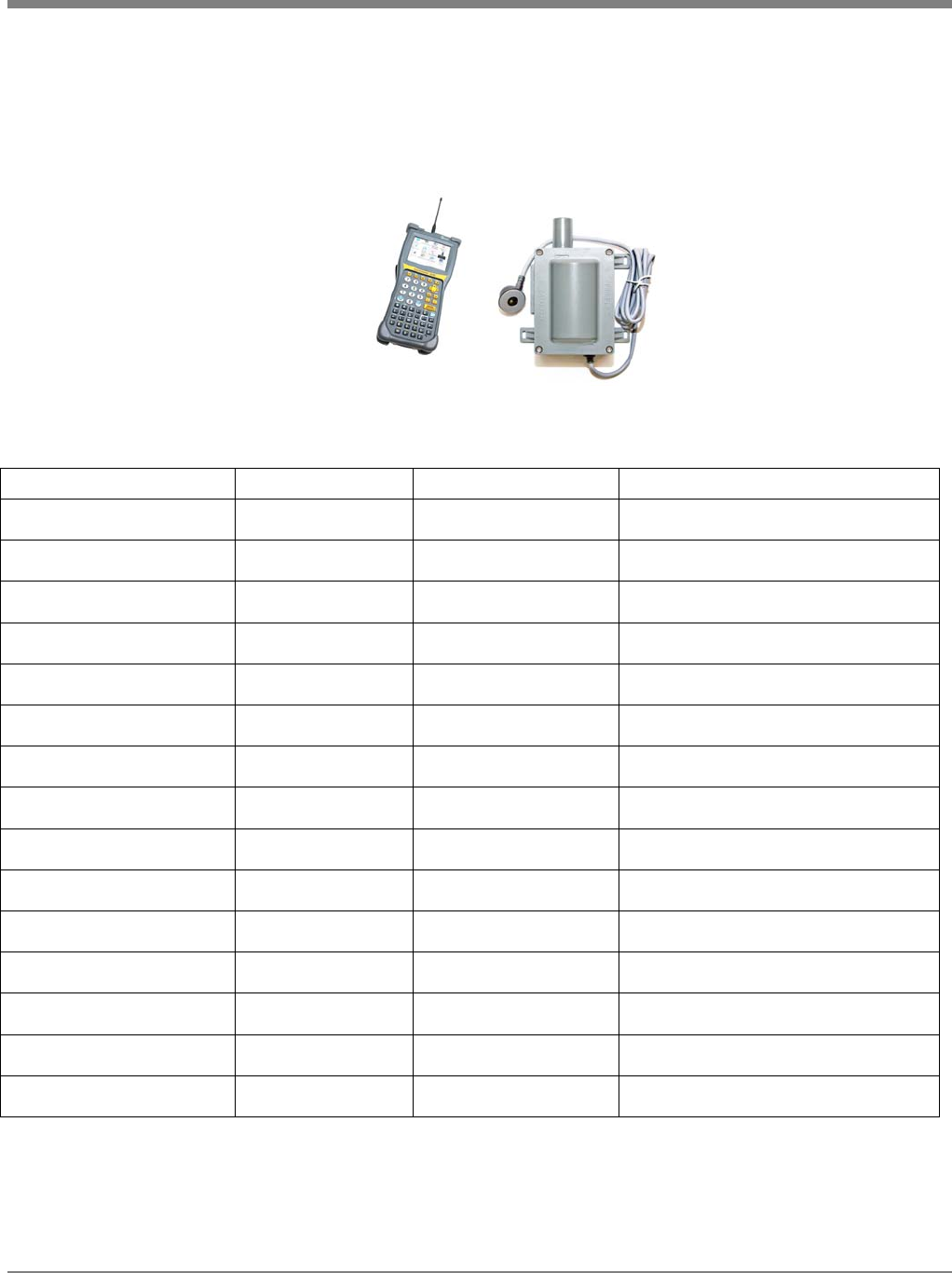
Datamatic, LTD. System Training Manual Version 08.24.12
- 77 - Confidential Datamatic, Ltd. 2012
Appendix B
ROADRUNNER CX with
Sensor-end FF in Non-Mesh Mode
FIREFLY Template for_________________________________
Parameter Prompt Type Value Suggested Value
1. Reading Normal Normal Depends on meter/billing units
2. Meter ID Normal Normal Normal
3. Constant Default Depends on meter/billing units
4. Rollover Default Depends on meter/billing units
5. Read Truncation Default Depends on meter/billing units
6. Target Background Default 100
7. Optic Read Delay Default 5
8. Profile Interval Default 60
9. Primer Threshold Default 10
A. Leak Duration (Bins) Default 24
B. Time Zone
C. Drive-by Schedule
D. GPS Coordinates
E. Desired Firmware
X. Save and Exit Save Your Template
*The schedule defined as the default value in the Template will be used
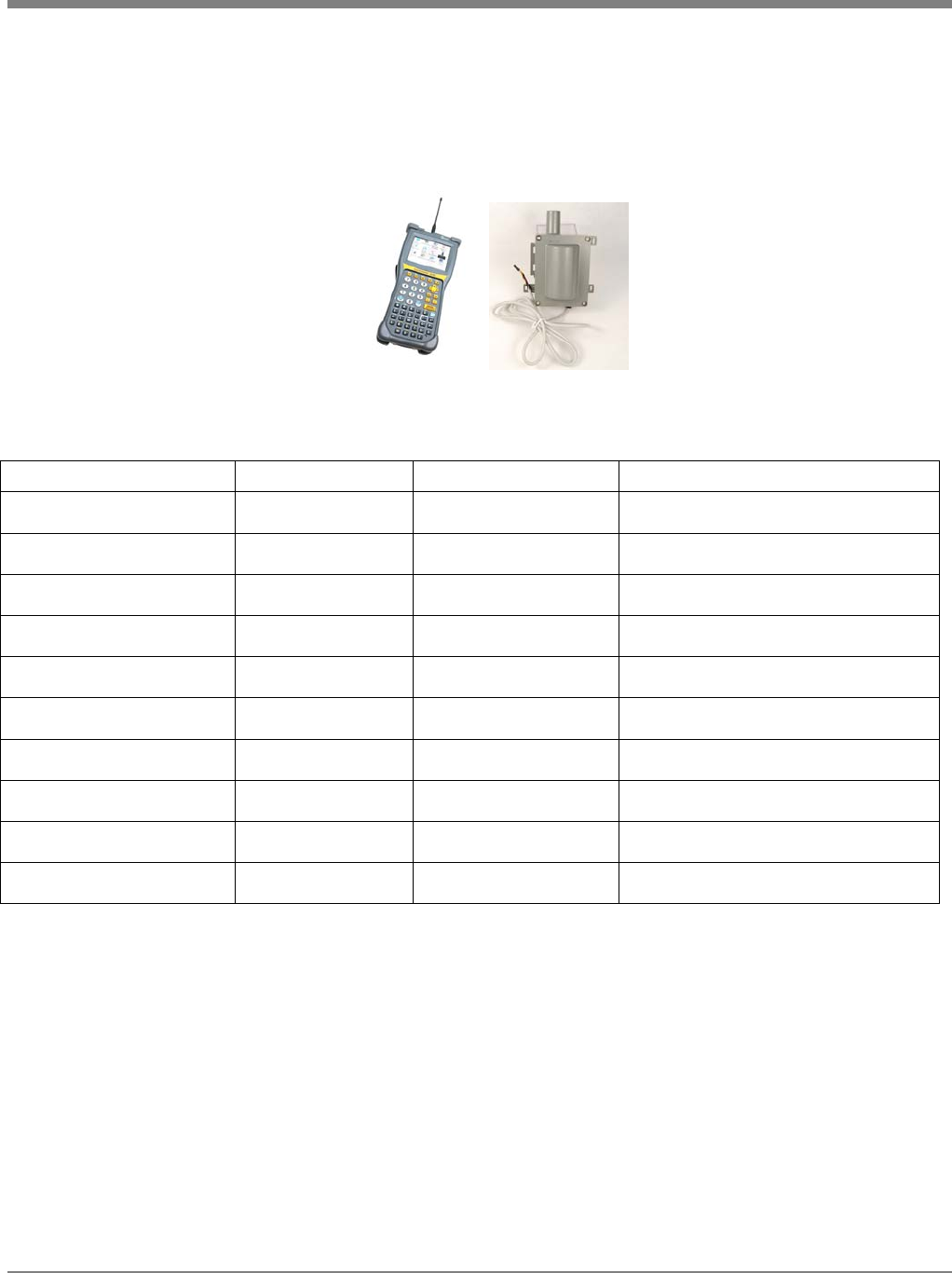
Datamatic, LTD. System Training Manual Version 08.24.12
- 78 - Confidential Datamatic, Ltd. 2012
Appendix C
ROADRUNNER CX with
Wire-end FF in Mesh Mode on Encoded Meter
FIREFLY Template for_________________________________
Parameter Prompt Type Value Suggested Value
1. Meter ID Normal Normal Normal
2. Constant Default Depends on meter/billing units
3. Read Truncation N/A
4. Profile Interval N/A
5. Leak Duration (Bins) Default 24
6. Time Zone
7. GPS Coordinates
8. Desired Firmware
9. Conservation Zone
X. Save and Exit Save Your Template
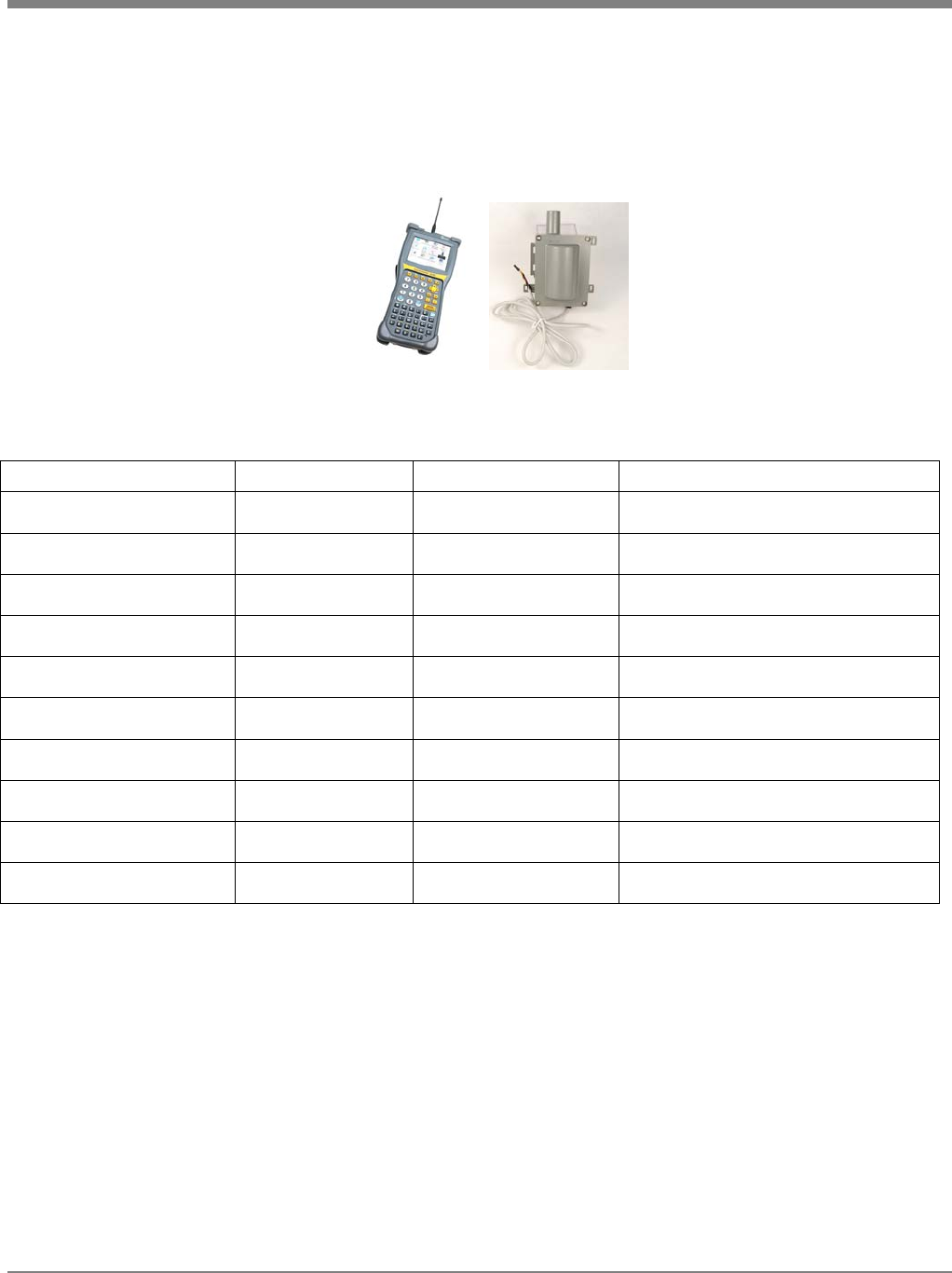
Datamatic, LTD. System Training Manual Version 08.24.12
- 79 - Confidential Datamatic, Ltd. 2012
Appendix D
ROADRUNNER CX with
Wire-end FF in Non-Mesh Mode on Encoded Meter
FIREFLY Template for_________________________________
Parameter Prompt Type Value Suggested Value
1. Meter ID Normal Normal Normal
2. Constant Default Depends on meter/billing units
3. Read Truncation Default Depends on meter/billing units
4. Profile Interval Default 60
5. Leak Duration (Bins) Default 24
6. Time Zone
7. Drive-by Schedule
8. GPS Coordinates
9. Desired Firmware
X. Save and Exit Save Your Template
*The schedule defined as the default value in the Template will be used
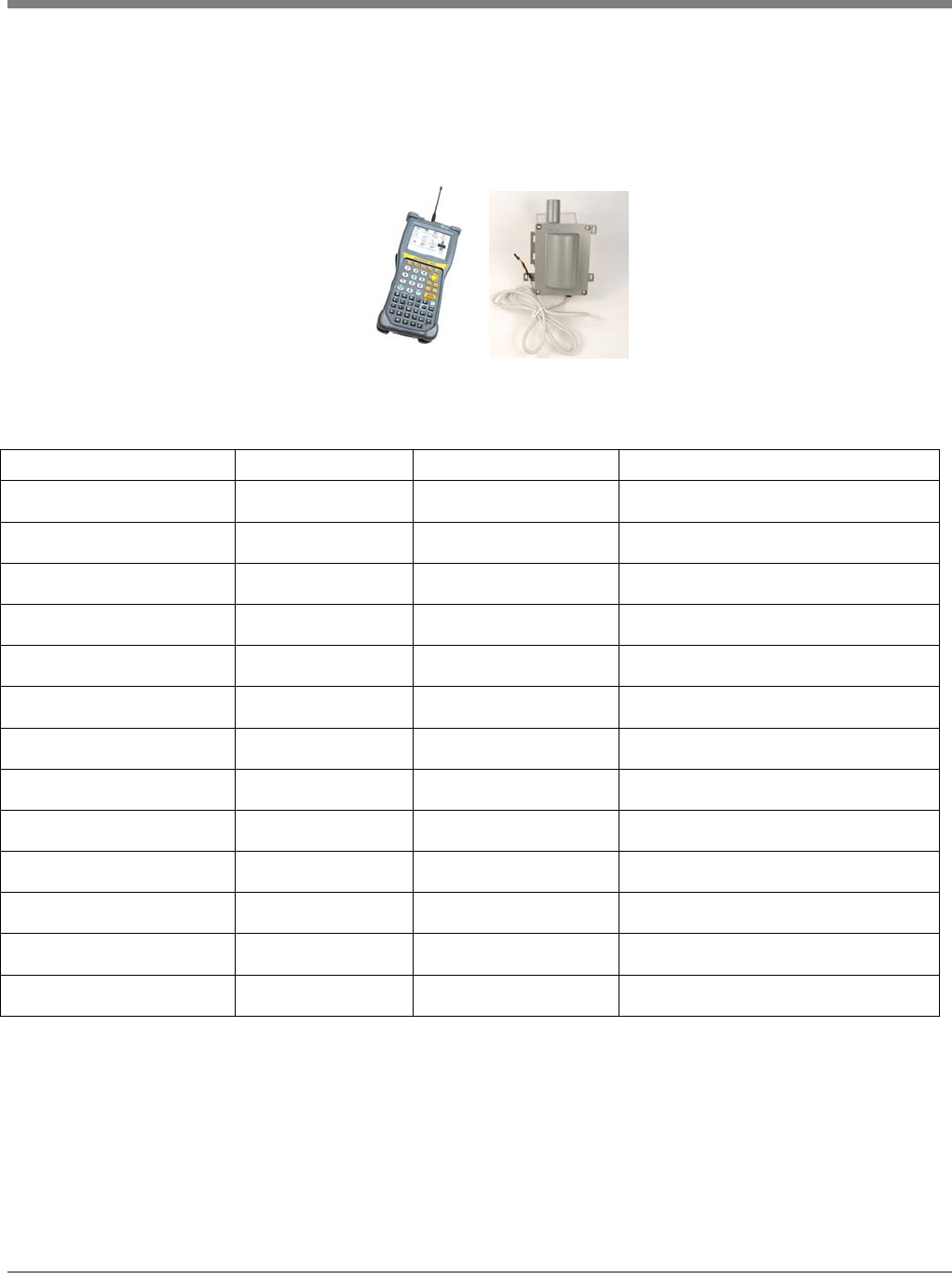
Datamatic, LTD. System Training Manual Version 08.24.12
- 80 - Confidential Datamatic, Ltd. 2012
Appendix E
ROADRUNNER CX with
Wire-end FF in Mesh Mode on Pulse Meter
FIREFLY Template for_________________________________
Parameter Prompt Type Value Suggested Value
1. Reading Normal Normal Depends on meter/billing units
2. Meter ID Normal Normal Normal
3. Constant Default Depends on meter/billing units
4. Rollover Default Depends on meter/billing units
5. Read Truncation N/A
6. Profile Interval N/A
7. Leak Duration (Bins) Default 24
8. Pulse Ratio
9. GPS Coordinates
A. Time Zone
B. Desired Firmware
C. Conservation Zone
X. Save and Exit Save Your Template
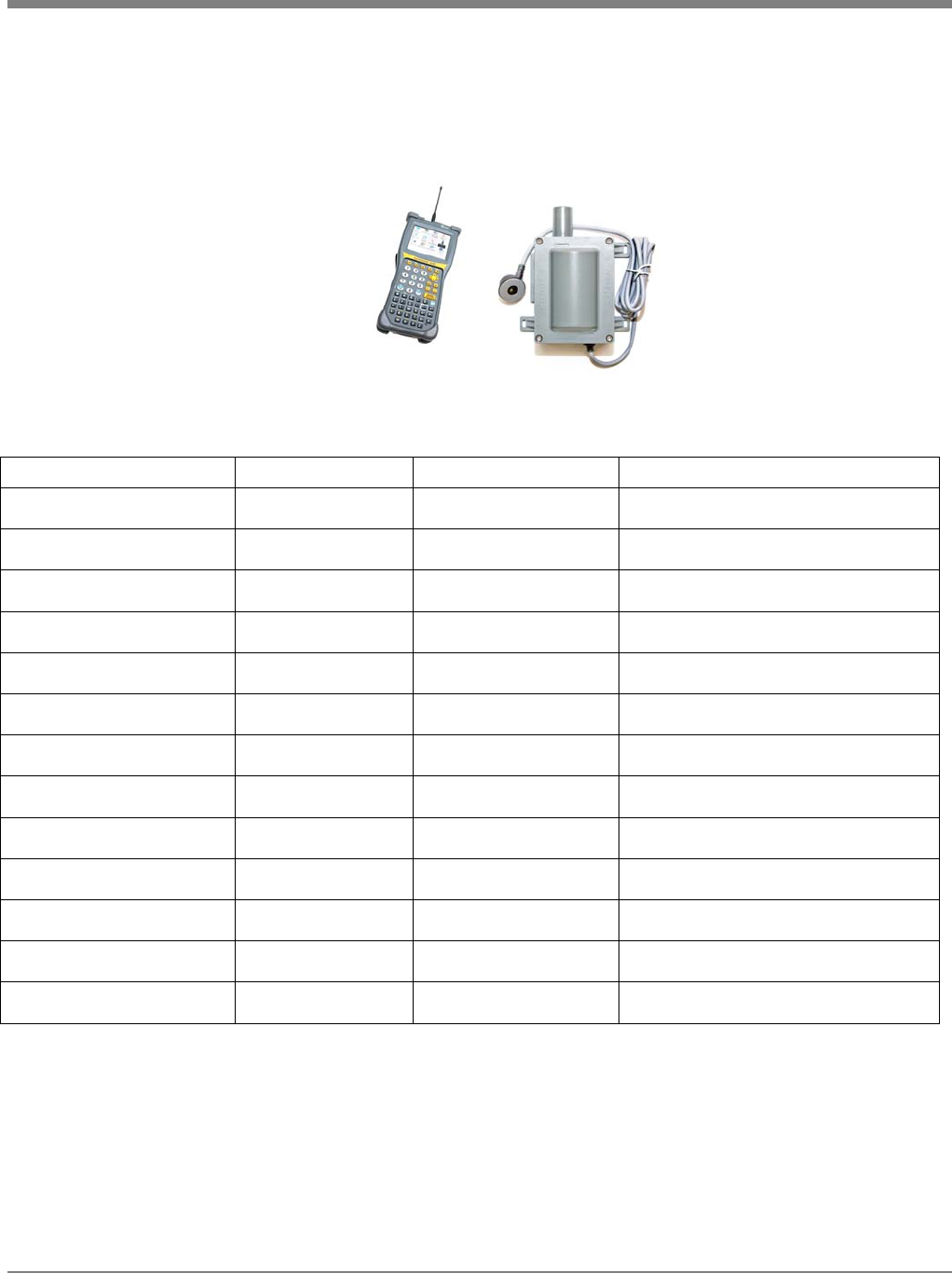
Datamatic, LTD. System Training Manual Version 08.24.12
- 81 - Confidential Datamatic, Ltd. 2012
Appendix F
ROADRUNNER CX with
Wire-end FF in Non-Mesh Mode on a Pulse Meter
FIREFLY Template for_________________________________
Parameter Prompt Type Value Suggested Value
1. Reading Normal Normal Depends on meter/billing units
2. Meter ID Normal Normal Normal
3. Constant Default Depends on meter/billing units
4. Rollover Default Depends on meter/billing units
5. Read Truncation Default Depends on meter/billing units
6. Profile Interval Default 60
7. Leak Duration (Bins) Default 24
8. Pulse Ratio
9. GPS Coordinates
A. Time Zone
B. Drive-by Schedule
C. Desired Firmware
X. Save and Exit Save Your Template
*The schedule defined as the default value in the Template will be used

Datamatic, LTD. System Training Manual Version 08.24.12
- 82 - Confidential Datamatic, Ltd. 2012
Appendix G
The ROADRUNNER software provides Hot Keys to perform certain functions. Please see below for
the current list.
FNCTN (blue key) + C = Change communication mode
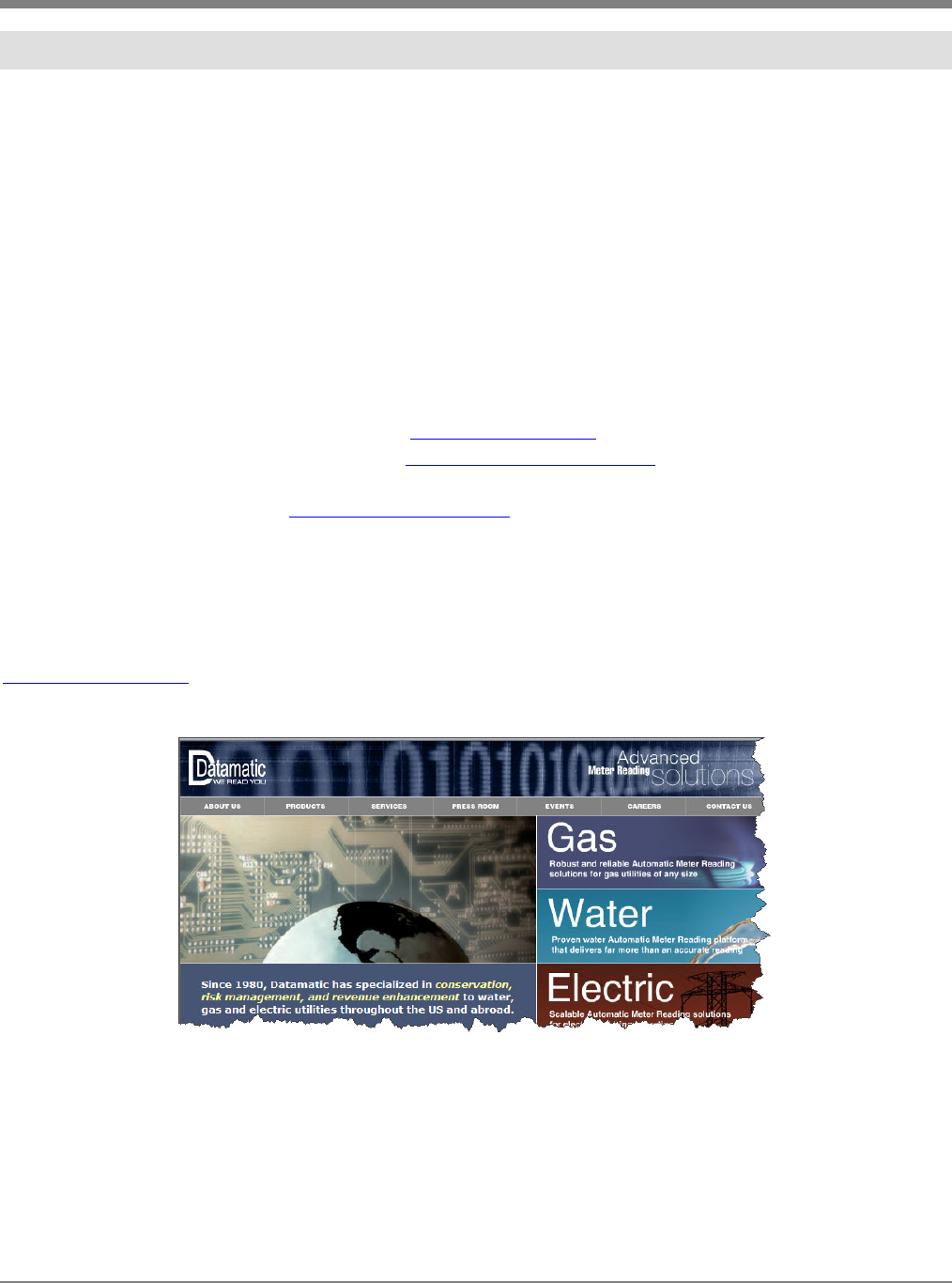
Datamatic, LTD. System Training Manual Version 08.24.12
- 83 - Confidential Datamatic, Ltd. 2012
Contacting Datamatic
Support
Datamatic offers the following benefits to its customers under the terms of a Maintenance Agreement.
24-hour telephone support
In-house depot hardware repairs
Software updates
System Support during Business Hours
Support for your Datamatic system can be accomplished by:
1. Visiting the Datamatic website at www.datamatic.com
2. Visiting the MOSAIC website at www.datamaticmosaic.com (MOSAIC customers only –
with login password)
3. Sending an email to support@datamatic.com
4. Contacting Customer Support at 888-326-5032
Datamatic Website – Customer Support
To access the Datamatic Customer Support web page, use your browser (e.g. Internet Explorer) and visit
www.datamatic.com. Put your mouse cursor over “Services” located in the top banner area, then click
on “>>Support” in the drop down box as shown below:
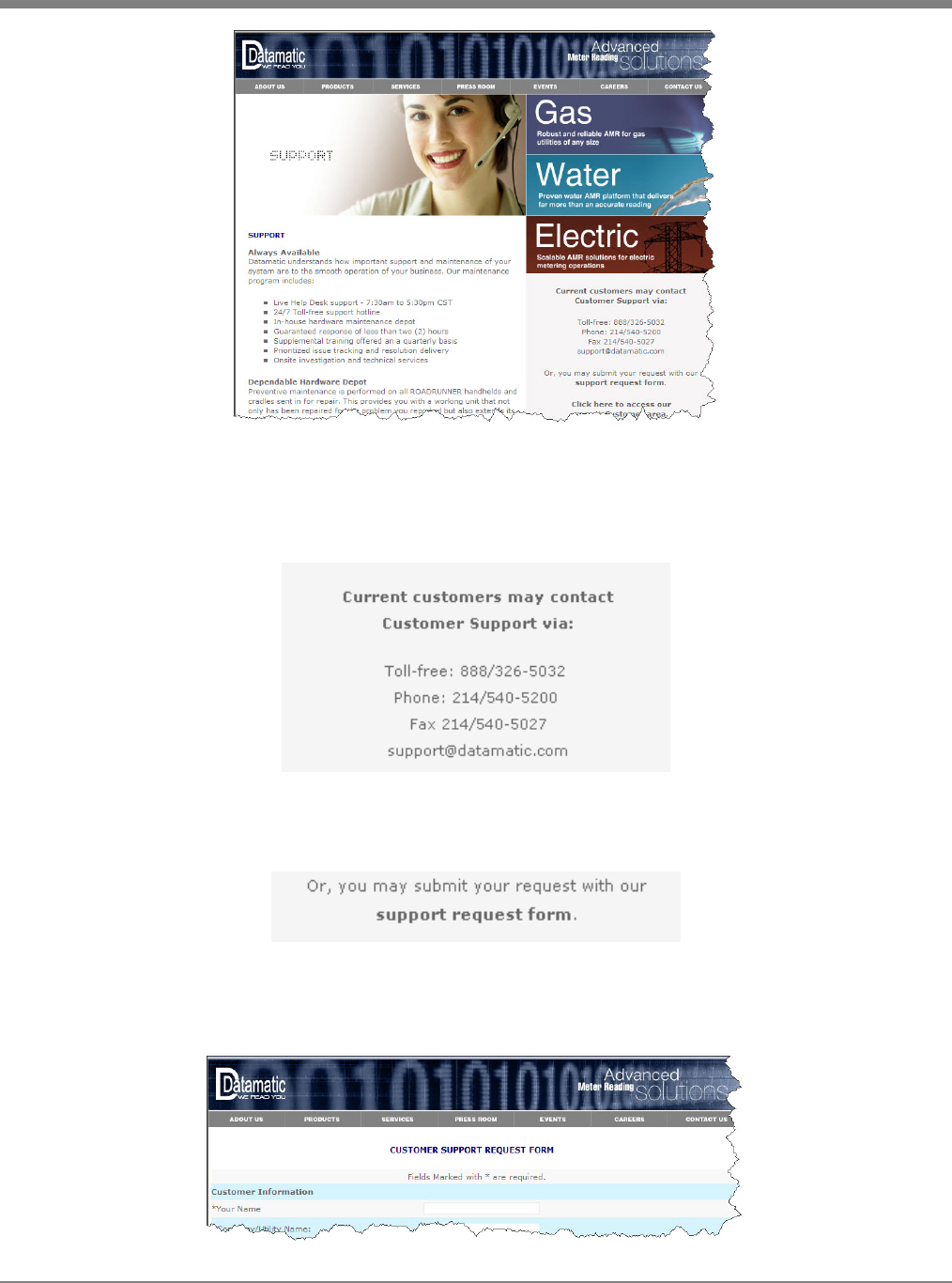
Datamatic, LTD. System Training Manual Version 08.24.12
- 84 - Confidential Datamatic, Ltd. 2012
For the timeliest response, contact Customer Support at (888) 326-5032 between 7:30am and 5:30pm
CST, Monday thru Friday, excluding holidays. If you call after hours, you can leave a message and a
representative will be notified. In this case, you will be contacted within two (2) hours. Do not use
email or form-based support requests for emergency issues.
On the Datamatic Customer Support web page, you will find a Support Request Form link (pictured
below).
Click this for non-emergency issues. Fill out and submit the Support Request Form (pictured below)
and you will receive a response back from Customer Support within one business day.
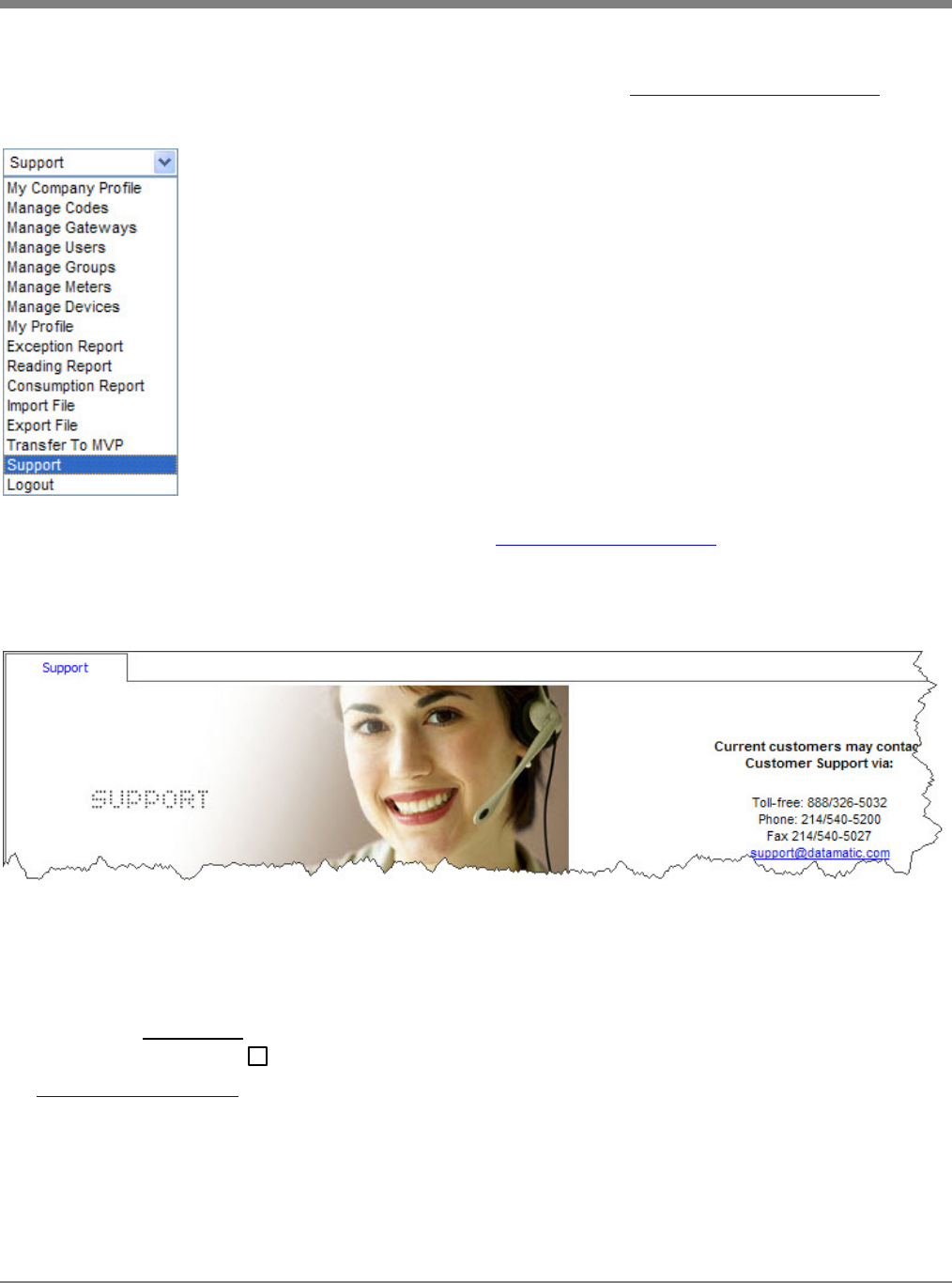
Datamatic, LTD. System Training Manual Version 08.24.12
- 85 - Confidential Datamatic, Ltd. 2012
MOSAIC Website – Customer Support
You must have a login for access to the Datamatic MOSAIC website www.datamaticmosaic.com . Once
logged in, use the Go To: master navigation menu to access the ‘Support’ page.
From the MOSAIC Support page you can click on the support@datamatic.com link to send an email.
Or dial the Toll-free number to contact Datamatic Customer Support. From the MOSAIC Support
page, you can also download the latest User Guides and Software Release Notes for the MOSAIC
Software and FIREFLYs:
System Support after Business Hours
Customers requiring assistance after Datamatic business hours can leave a message for the
appropriate group. Emergency assistance is available 24 hours a day.
If this is an emergency and can’t wait for the next business day, call the 888-326-5032 phone
number and then Press 2 to leave an emergency message. You always have the option to email
support@datamatic.com and your request will be processed the following business day. If paging,
please leave your name, number, and message at the prompt to page a Customer Support
Representative.
A customer support representative should return your call within 2 hours.
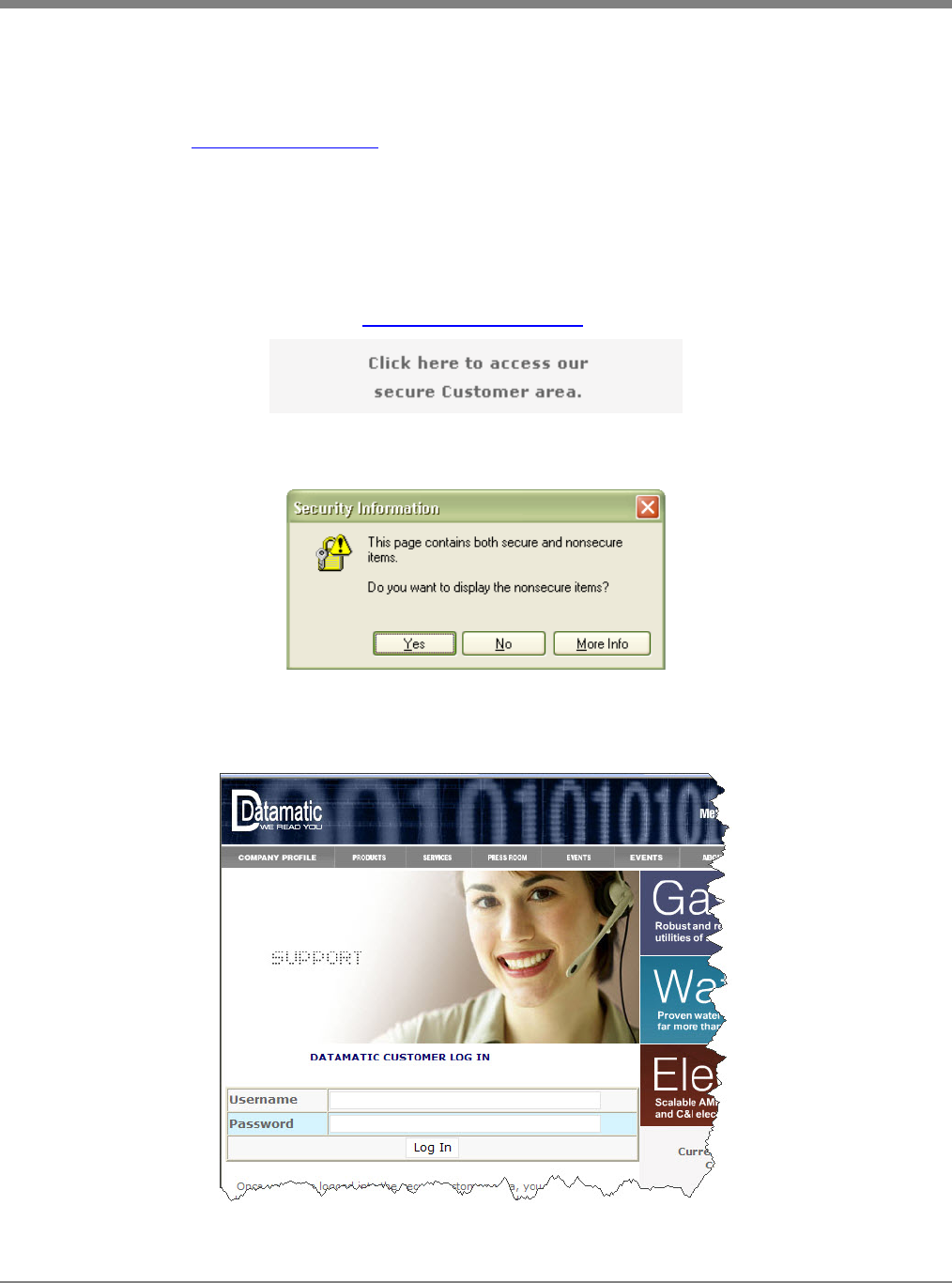
Datamatic, LTD. System Training Manual Version 08.24.12
- 86 - Confidential Datamatic, Ltd. 2012
Consumables
To order consumables for your ROADRUNNER handheld devices (e.g. batteries, hand straps, etc.) or
field installation supplies for your FIREFLYs, then you can best accomplish this through our Customer-
only support page at www.datamatic.com. Note that this requires a user name and password, so you will
need to contact Customer Support at 888-326-5032 the first time.
Go to the Services >> Support page and click on the “Secure Customer Area” link in the lower right
hand corner.
Enter your username and password. If you have trouble or need a new login, then contact Customer
Support at 888-326-5032 or email us at support@datamatic.com.
After clicking on this link you will be taken to the secure customer area. Click “Yes” in the message
below.
You will be taken to a page that looks similar to the one below, and you will be able to access these
options after you have used your supplied username and password.
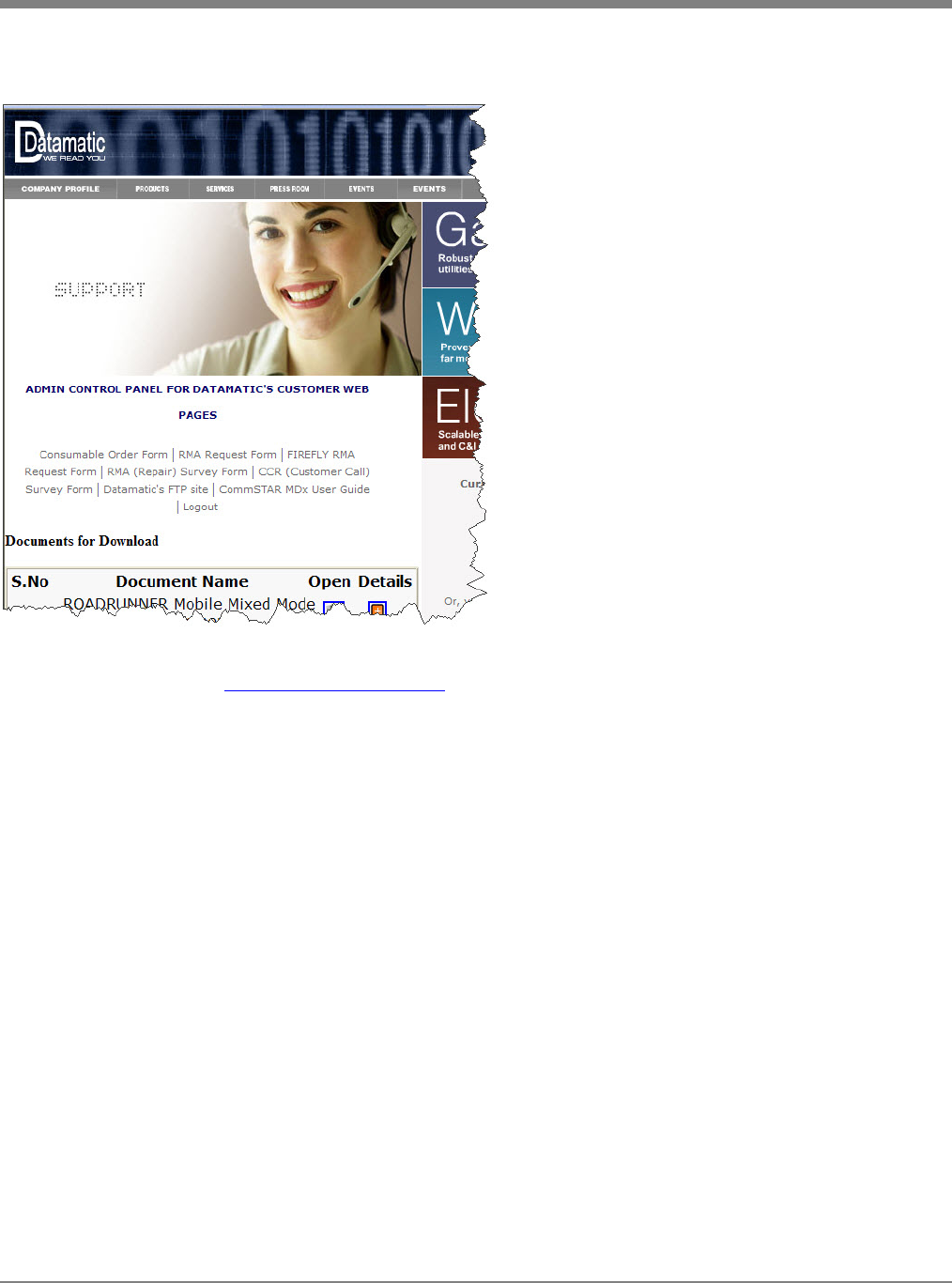
Datamatic, LTD. System Training Manual Version 08.24.12
- 87 - Confidential Datamatic, Ltd. 2012
After a successful login, you will have access to the Consumable Order Form, RMA Request Form, and
FIREFLY RMA Request Form.
Select the Consumable Order Form link and fill in all required fields to submit your Consumable Order.
An email will be sent to support@datamatic.com and a Datamatic representative will contact you.
Datamatic requires a Purchase Order number and/or a signed Sales Quote to process the order.
Unfortunately, Datamatic does not accept credit cards.

Datamatic, LTD. System Training Manual Version 08.24.12
- 88 - Confidential Datamatic, Ltd. 2012
Return Material Authorizations (RMAs)
Non-FIREFLY RMA Request Form
All equipment identified within your Maintenance Agreement can be returned to Datamatic for
maintenance and/or repair. Typical equipment included in this category includes ROADRUNNER
handhelds and cradles. Check your Maintenance Agreement to be sure. This equipment is maintained
and repaired by Datamatic on a best efforts basis. Below is a sample of what might be included and
excluded:
• Inclusions – Datamatic shall keep the Hardware and Software in good working order.
Maintenance services shall include:
A. Preventive Hardware maintenance as is generally provided by the equipment manufacturers.
B. Software maintenance, including providing Licensee with such revisions in the Software as
Datamatic generally makes available to licensees of the Software at no charge; and
C. Remedial maintenance of both the Hardware and Software
• Exclusions – Maintenance and repair services shall not apply to the following:
A. FIREFLY Meter Interface Units, Batteries, straps, power supplies, carrying cases, cabinets
and mounting equipment or any other consumable supply item.
B. Electrical work external to the Hardware or maintenance of accessories, alterations,
attachments, or other devices not furnished by Datamatic
C. Repair of damages or increases in telephone support or service time caused by accident,
transportation, neglect, misuse, Purchaser’s employee turnover or alterations (which shall
include, but not be limited to, any deviation from circuit or structural machine design as
provided by Datamatic)
D. Repair or damages or increases in telephone support or service time attributable to the use of
the System for purposes for other than which it was designed
E. Furnishing supplies or accessories; painting or refinishing the Hardware or furnishing
material therefore; making specification changes or performing services connected with
relocation of machines; or adding or removing accessories, attachments or other devices
F. Software upgrades, releases, enhancements, functionality or products that Datamatic
separately licenses or charges for outside of Support and Maintenance.
If there is physical damage or trauma to any ROADRUNNER equipment there will be a $150.00
damage assessment fee required in advance of any analysis or repair. In these cases, repairs will be done
on a time and materials basis and a Purchase Order is required to proceed in all cases.
The Non FIREFLY RMA Request Form allows you to submit an electronic RMA request for
ROADRUNNERs, cradles, etc. Fill in all required fields to submit your RMA request:
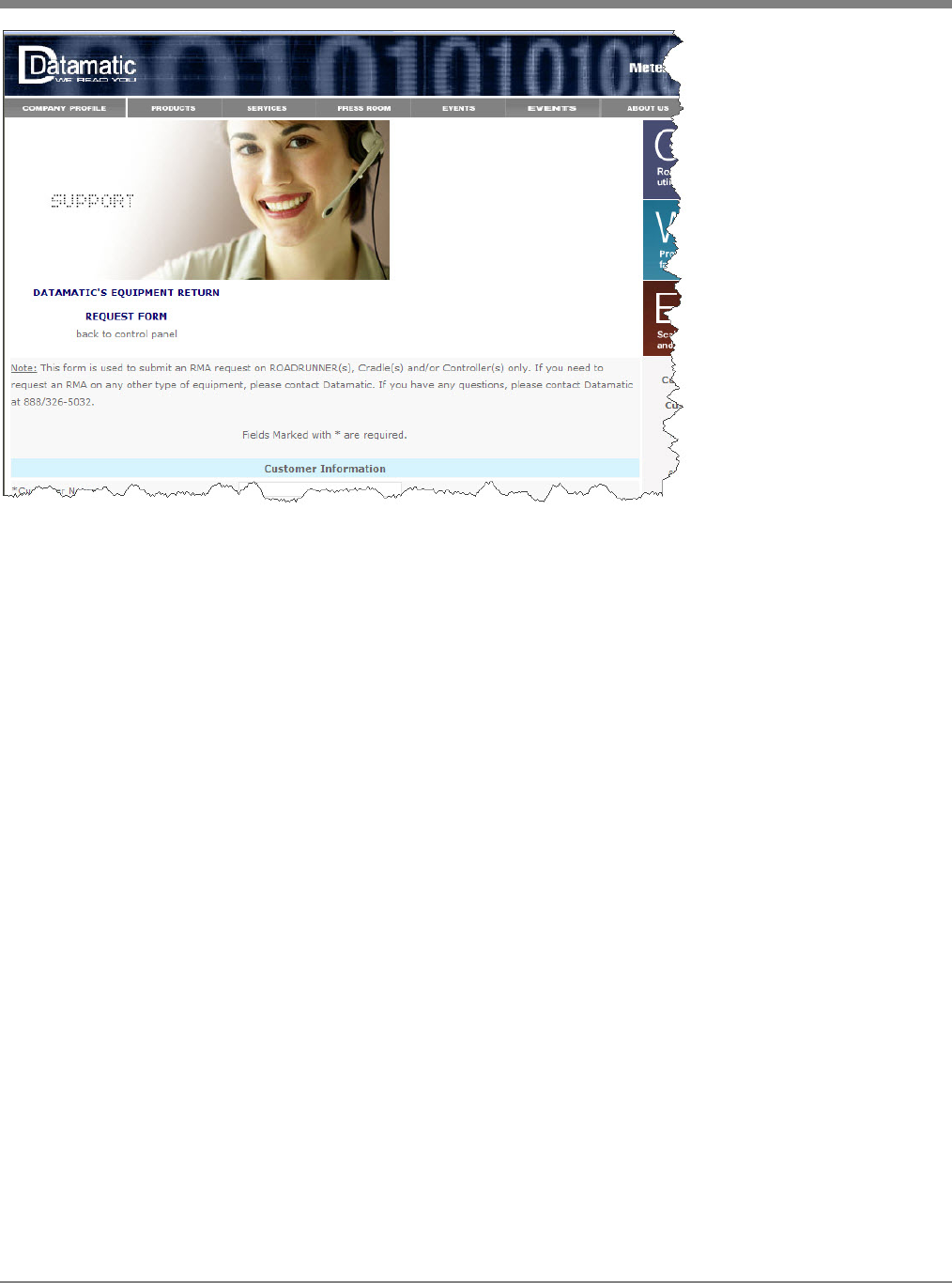
Datamatic, LTD. System Training Manual Version 08.24.12
- 89 - Confidential Datamatic, Ltd. 2012
FIREFLY RMA Request Form
Warranty Claim Exclusions for Water FIREFLYs
This section describes the Warranty Claim Exclusions for FIREFLY units. If you have any questions
about this process, please contact the Datamatic Customer Support Center at 888-326-5032.
Warranty Claims will be processed according to the following progression:
1. Is the unit still within its Warranty period? If yes, then proceed to #2. Do not ship any units that
are outside their warranty period to Datamatic. See your Warranty documentation for more
details.
2. Is the unit free of physical damage and permanent markings such that it can be repaired and used
as intended? If yes, then proceed to #3. Do not ship any units with physical damage to
Datamatic. Please dispose of damaged FIREFLYs properly using a local recycling facility.
3. Did the unit fail to function for any of the following reasons, in progression? Please use the
claim code tables below as a guide for submitting a FIREFLY RMA claim. Make sure to use
blue painter’s tape and note the appropriate code. (See picture examples below)
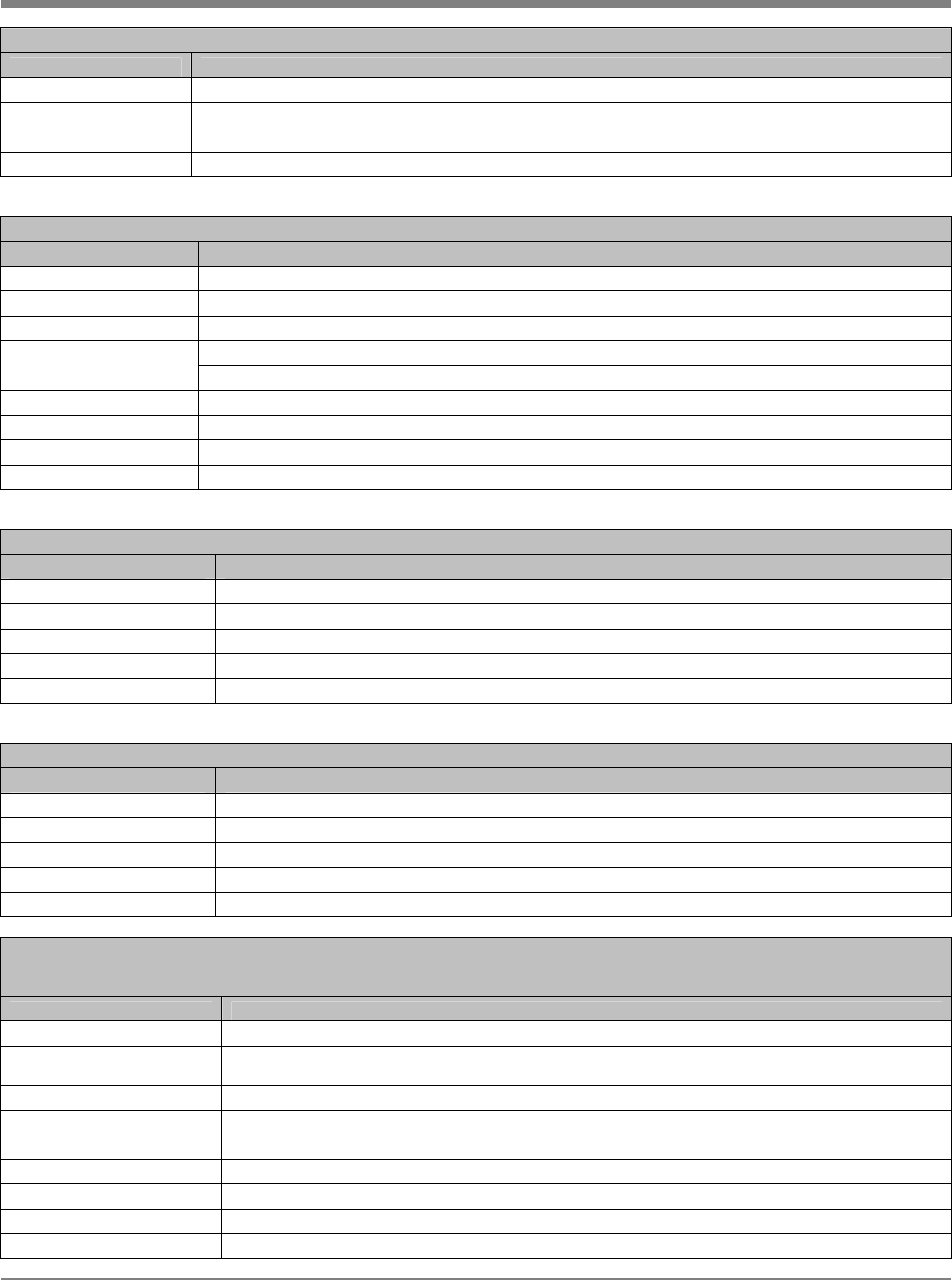
Datamatic, LTD. System Training Manual Version 08.24.12
- 90 - Confidential Datamatic, Ltd. 2012
D3 (Legacy/Single-Frequency) Failure Claim Codes – Use Painter’s Tape on Back of Unit and Mark Accordingly
Claim Code Diagnosis
DEAD Will not communicate via PPU
NO RF Will not read via RF signal
FBAT Low Battery Trouble Code
COUNT Won't 1) read encoder*, 2) pick up pulse* or 3) achieve sensor background*
* assumes register or connection issues are eliminated as cause
D4 (MOSAIC) Failure Claim Codes – WATER – Use Painter’s Tape on Back of Unit and Mark Accordingly
Claim Code Diagnosis
DEAD No Lights after Mag Swipe - Neither Red nor Green Light Up
NO RF Lights Work (Red and Green) but No RF with HH via FF SN
FBAT FBAT Flag in HH Current Settings or in MOSAIC
D41xx: HDWR Flag in HH Current Settings or in MOSAIC
HDWR D4000: HDWR Flag with TEMP, RTC, FLSH, CAL or BLO in HH Current Settings or in MOSAIC
COUNT Won't 1) read encoder*, 2) pick up pulse* or 3) achieve sensor background*
CLOCK Fast Flashing Green but No Red At All (No Clock)
FW Fast Flashing Red but No Green At All (No Firmware)
Other Call Customer Support - Do Not Ship Without Approval and Full Description
* assumes register or connection issues are eliminated as cause
D4 (MOSAIC) Failure Claim Codes - GAS - Use Painter's Tape on Back of Unit and Mark Accordingly
Claim Code Diagnosis
NO RF No RF with HH via FF SN after Mag Swipe
FBAT FBAT Flag in HH Current Settings or in MOSAIC
HDWR HDWR Flag in HH Current Settings or in MOSAIC
COUNT Inaccurate despite confirmed programming and properly functioning index*
Other Call Customer Support - Do Not Ship Without Approval and Full Description
* assumes index or connection issues are eliminated as cause
D4 (MOSAIC) Failure Claim Codes – REPEATERS - Use Painter's Tape on Back of Unit and Mark Accordingly
Claim Code Diagnosis
DEAD No Mesh or Receive/Transmit LEDs
NO RF No RF with HH via SN
FBAT FBAT Flag in HH Current Settings or in MOSAIC
CLOCK Date not set, date won’t set, or won’t communicate with Gateway
Other Call Customer Support - Do Not Ship Without Approval and Full Description
Failure Claim Codes – GATEWAY – Use Painter’s Tape on Back of Unit and Mark Accordingly
Failure Claim Codes for ENET and GPRS Gateways will be determined by Datamatic Customer Support after
appropriate troubleshooting
Claim Code Diagnosis
DEAD No Mesh, Receive / Transmit, or socket modem lights at power up
NO RF Lights Work (Red, Green, or Amber) but No RF comms with HH or neighbor table entries. If
problem is backhaul, see No Backhaul below
NO BACKHAUL Unable to establish Backhaul, but Gateway / Repeater does communicate to the Mesh
SOCMODEM No socket modem LEDs light up when applying AC (GPRS) or POE (ENET) connection
FBAT FBAT Flag reported and not able to be cleared by Datamatic
SD CARD SD Card Flag reported and not able to be cleared by Datamatic
CLOCK Date no set, date won’t set, or won’t communicate with collector
Other Datamatic has determined that the failure is not a standard failure
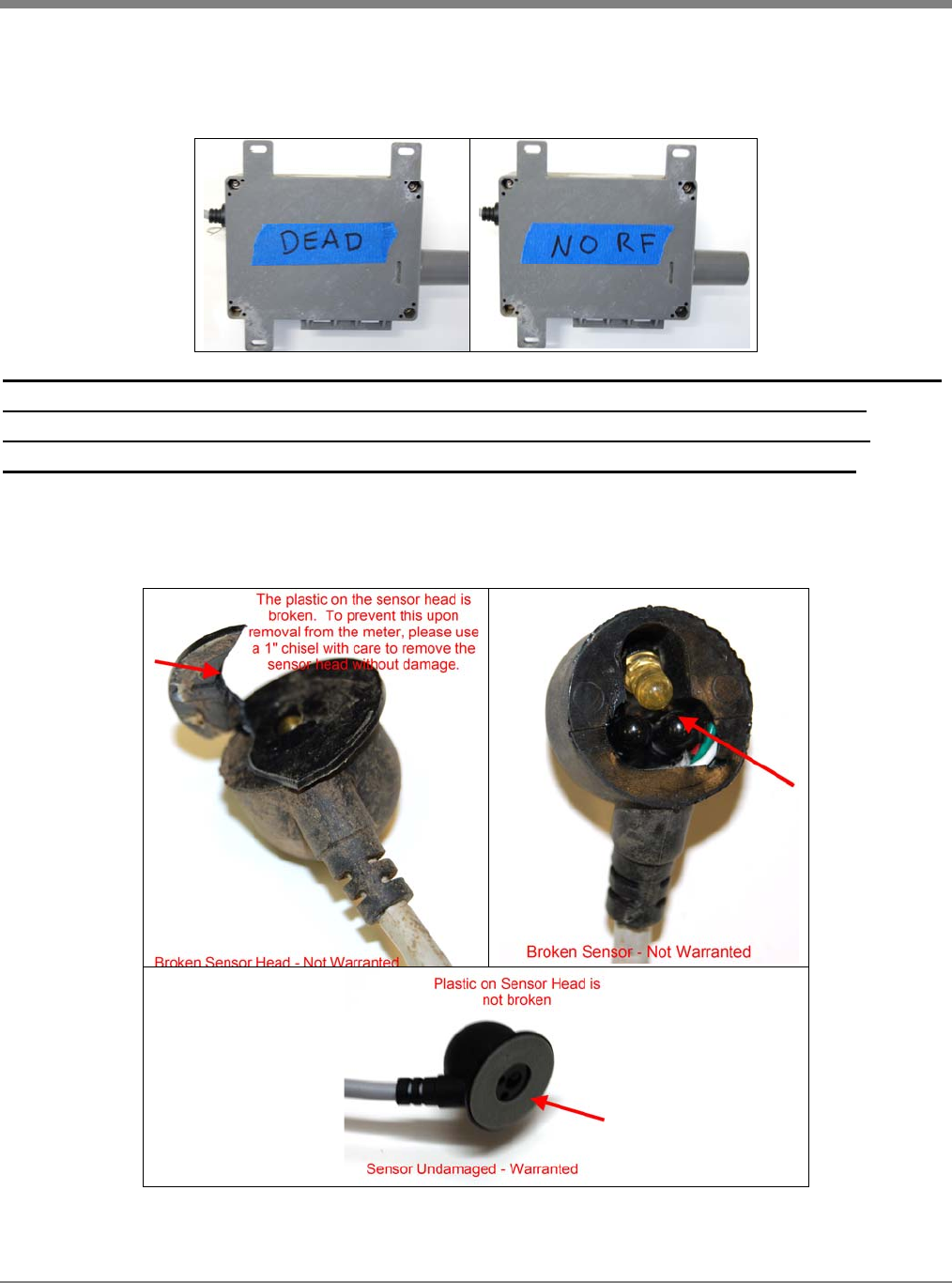
Datamatic, LTD. System Training Manual Version 08.24.12
- 91 - Confidential Datamatic, Ltd. 2012
To properly mark a claimed failure, use blue painter’s tape on the back of the FIREFLY and write the
failure code (below) on the tape.
Examples:
Only units that are within their Warranty Period and that are without physical damage
and that have failed for one or more of the above reasons may be covered under
Warranty. Do not ship any FIREFLY units with physical damage to Datamatic.
Please dispose of damaged FIREFLYs properly using a local recycling facility.
Specific Warranty exclusions include (but are not limited to) the following:
1. The Sensor Head is broken or damaged.
2. The FIREFLY’s cable is cut less than 18 inches from the base of the unit or if it is damaged such
that reliable reading may be compromised.
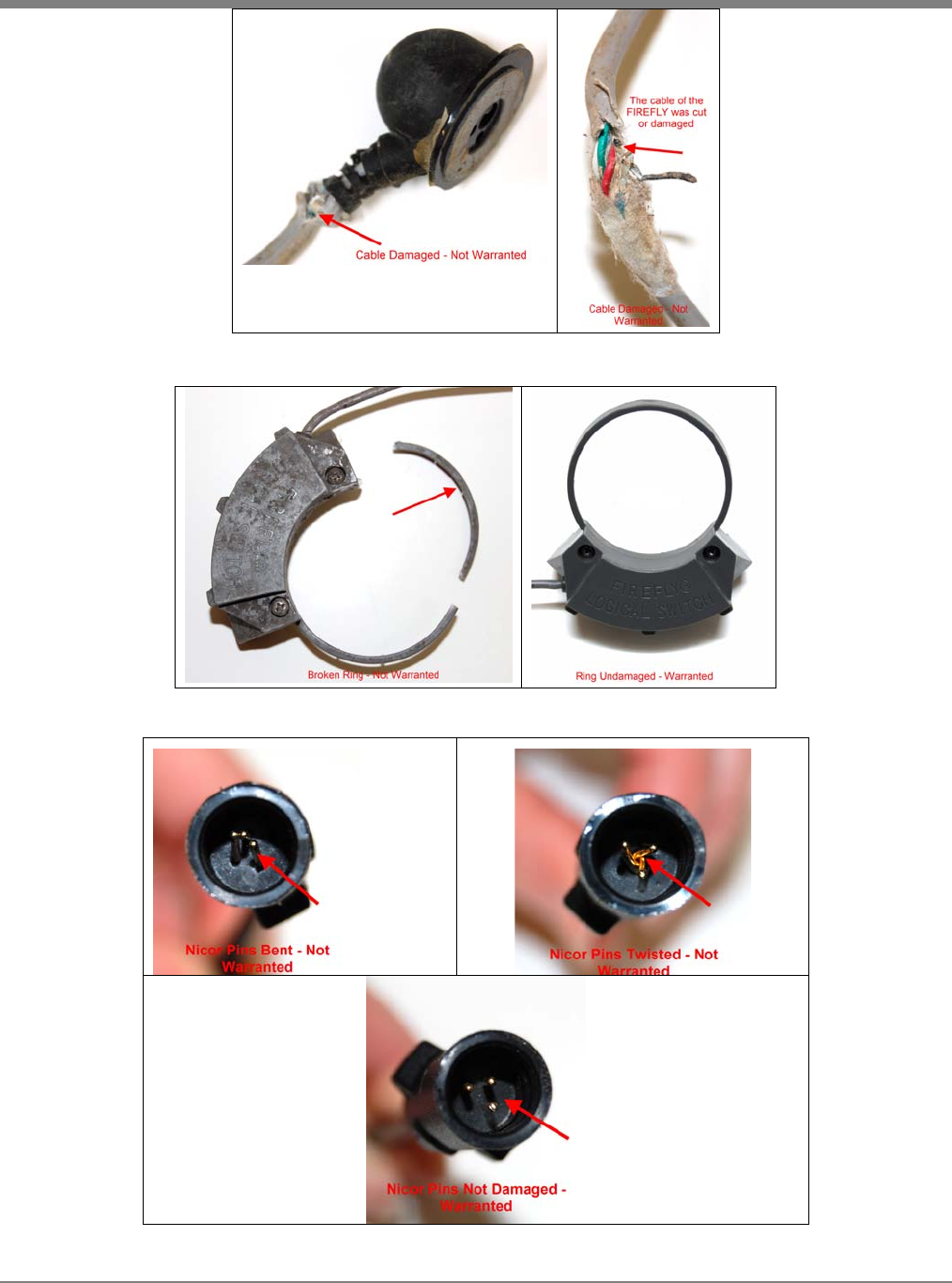
Datamatic, LTD. System Training Manual Version 08.24.12
- 92 - Confidential Datamatic, Ltd. 2012
3. The Logical Switch collar is broken on a Logical Switch FIREFLY.
4. The pins inside a Nicor connector are damaged, bent, twisted or missing.
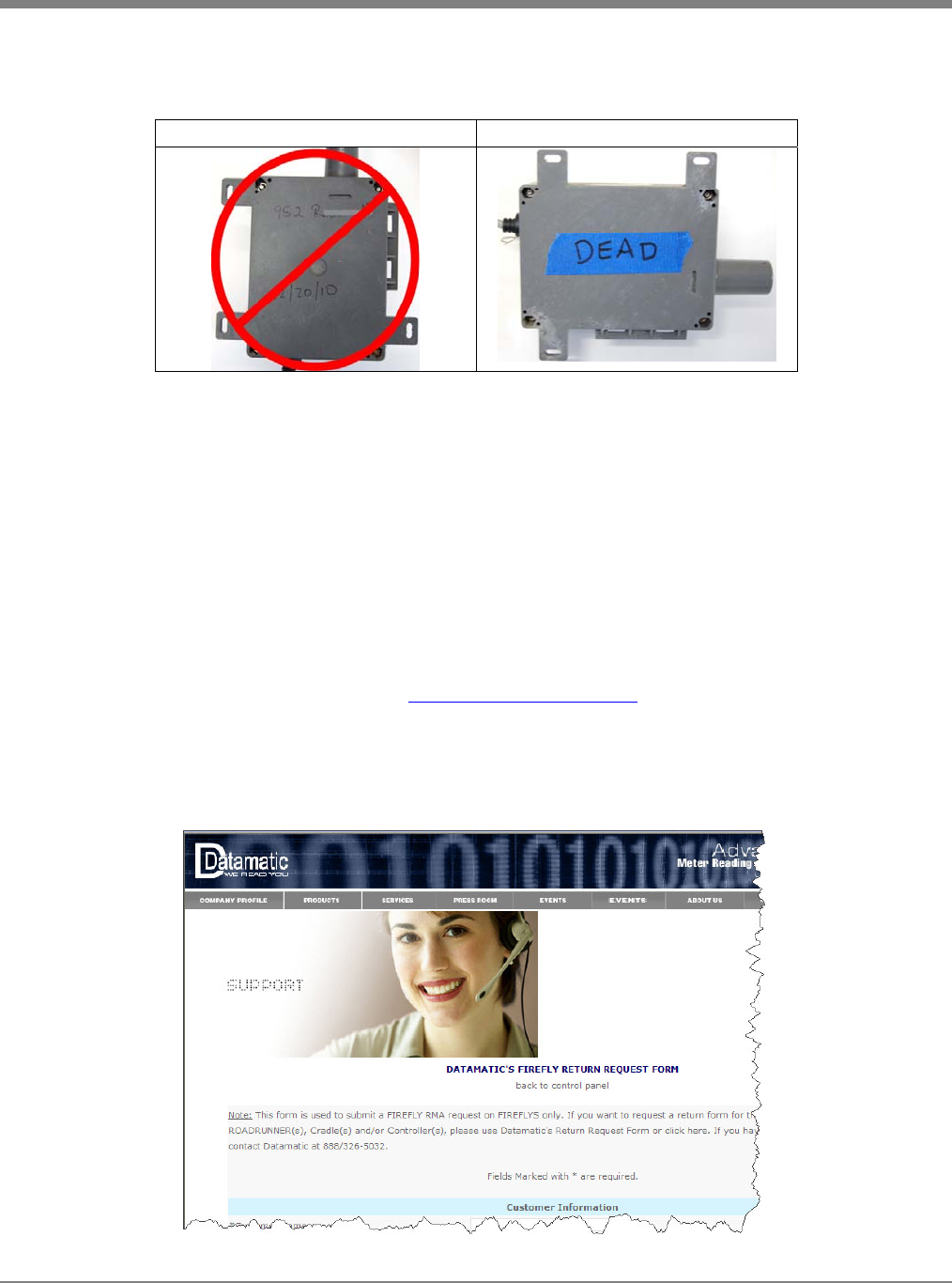
Datamatic, LTD. System Training Manual Version 08.24.12
- 93 - Confidential Datamatic, Ltd. 2012
5. The unit is permanently marked and/or painted (see examples below). To properly mark a
FIREFLY for RMA, please place a piece of blue painter’s tape on the FIREFLY and write the
failure code on the tape.
Improperly Marked FIREFLY Properly Marked FIREFLY
• Package Water FIREFLYs in an original (or similar) shipping box that includes dividers, serial
number side up.
• Package Electric FIREFLYs in static bags and bubble wrap. Remove back-up batteries from
Electric FIREFLYs.
• Package Gas FIREFLY MIU and gear drive only (index cover, battery and screws not needed).
If there is a defect in the gas battery screw (for Legacy Gas FIREFLY only) , draw an arrow on
the battery pointing to the insert with the permanent marker. Package gas batteries separately
(detached) from the FIREFLY. Mark all bad batteries with a Red “X”.
If you have any questions about your FIREFLY Warranty or the proper return process, please contact
Customer Support at 888-326-5032 or email Support@Datamatic.com
The FIREFLY RMA Request Form allows you to submit an electronic RMA request for FIREFLYs.
Fill in all required fields to submit your FIREFLY RMA Request.

Datamatic, LTD. System Training Manual Version 08.24.12
- 94 - Confidential Datamatic, Ltd. 2012
Training and Support
At Datamatic, we strive to provide excellent training and support because they are the foundations of
customer satisfaction.
Training
Training services include onsite training for a reasonable fee plus travel expenses. When a customer is
new to Datamatic, their sales order should include a specified amount of onsite training days or sessions.
This initial training is required to teach end users how to set up, operate, maintain, and efficiently use
their new hardware and/or software systems. Customers are strongly encouraged to have more then one
employee attend the training and to cross-train with other employees.
Supplemental training is available onsite or via telephone. Typically, this occurs when there is utility
employee turnover or when their responsibilities change. In many cases, users want a refresher or to be
able to dig deeper into the use and care of their system. Additional fees apply, so contact Customer
Support at 888-326-5032 for more information.
Telephone Support
Support services include telephone assistance, return material authorizations (RMA), and consumable
sales.
Technical phone support is provided to help answer questions or address specific issues with trained end
users. New users should take advantage of the opportunity to have focused one-on-one or group
training.
Customers can also contact technical support to request a return material authorization (RMA) for
equipment repair per the terms of a Maintenance Agreement.
Technical support also handles purchases of small consumable items such as hand straps or batteries for
the hand held devices.
Please send an email to support@datamatic.com or call 888-326-5032 for technical assistance, RMA requests,
and consumable orders.
Additional Datamatic Training Guides can be downloaded through the secure customer access area of
our website.

Datamatic, LTD. System Training Manual Version 08.24.12
- 95 - Confidential Datamatic, Ltd. 2012

Datamatic, LTD. System Training Manual Version 08.24.12
- 96 - Confidential Datamatic, Ltd. 2012
Document Revisions
Do Not Print
Team Members: Deena Duffy
Date: 6/10/08
Revision: A
Revision Log: Starting from last draft, added:
updated wiring connections
Non-mesh read functionality
Re-worked LED behavior explanations
Changed MOSAIC-Class FIREFLY references to
MOSAIC FIREFLY per Andy Kercher
Team Members: Deena Duffy
Date: 06/17/08
Revision: B
Revision Log: Completed updates per 06.04.08 approvals
Team Members: Deena Duffy
Date: July 1, 2008
Revision: C
Revision Log: Dd added new Support page
Team Members: Deena Duffy
Date: September 10, 2008
Revision: D
Revision Log: Dd added RSV control instructions
Team Members: Deena Duffy
Date: September 11, 2008
Revision: E
Revision Log: Dd added sensor-end install and programming instructions
Team Members: Deena Duffy
Date: September 15, 2008
Revision: F
Revision Log: Dd added sensor-end light behavior and wire-end
programming instructions and formatted for review
Team Members: Deena Duffy
Date: October 15, 2008
Revision: G
Revision Log: Dd updated wiring connections to match last approved
version of the laminated wire connections card
Team Members: Amy Fair and Deena Martin
Date: January and February, 2009
Revision: H
Revision Log: Updated for RR 3.26.3 and 3.26.4
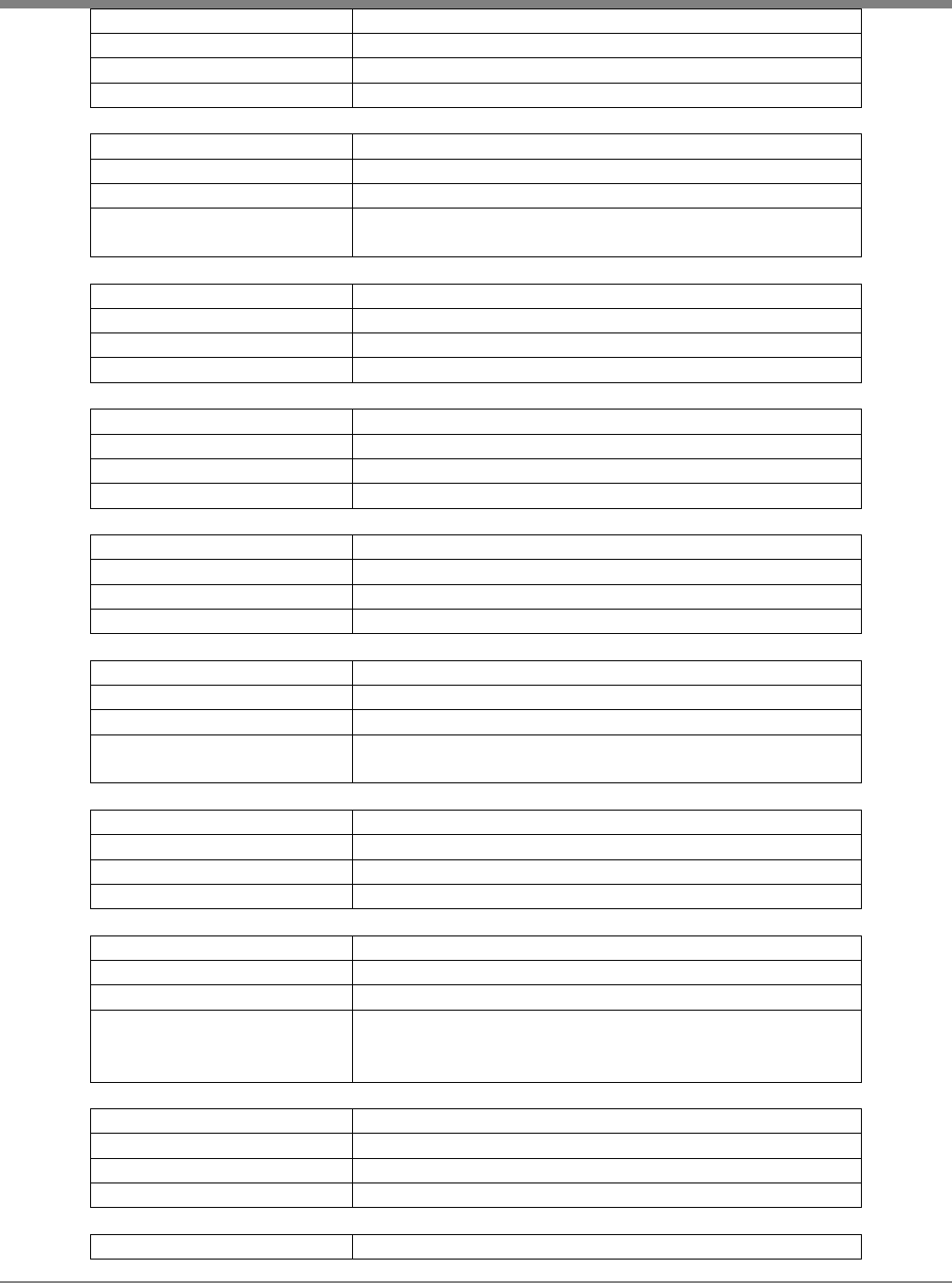
Datamatic, LTD. System Training Manual Version 08.24.12
- 97 - Confidential Datamatic, Ltd. 2012
Team Members: Deena Martin
Date: February 24, 2009 – March 19, 2009
Revision: I
Revision Log: Misc. general updates per emails, etc.
Team Members: Deena Martin
Date: April 20, 2009 – May 4, 2009
Revision: J
Revision Log: Updates related to CXMI 1.2 release; new Installation
Considerations added by AK
Team Members: Deena Martin
Date: July 6, 2009 – July 17, 2009
Revision: K
Revision Log: Updates related to CXMI 1.3 release
Team Members: Deena Martin
Date: August 14, 2009
Revision: L
Revision Log: Added Work out Waterless Hand Cleaner
Team Members: Deena Martin
Date: November 23 – January 12, 2010
Revision: M
Revision Log: Added functionality related to CXMI 1.3.2
Team Members: Deena Martin
Date: February 4, 2010
Revision: N
Revision Log: Added images and verbiage re: Nicor-end FFs per Andy
K.
Team Members: Deena Martin
Date: January 24, 2011
Revision: O
Revision Log: Added DC-111 to sensor install procedures
Team Members: Deena Martin
Date: February 15-25, 2011
Revision: P
Revision Log: Updated Mesh/Fence Rollover max values; added new
Contacting Datamatic section; added sensor
troubleshooting notes
Team Members: Deena Martin
Date: 03/21/11
Revision: Q
Revision Log: Updated Meter Type for Permalog and AMCO InVision
Team Members: Deena Martin

Datamatic, LTD. System Training Manual Version 08.24.12
- 98 - Confidential Datamatic, Ltd. 2012
Date: 05/17/11 – 05/23/11
Revision: R
Revision Log: Updated programming wire-end FFs in Mesh mode
sections; updated GPS programming instructions; updated
Training Guides pricing section
Team Members: Deena Martin
Date: 06/13/11
Revision: S
Revision Log: Added A-Frame Lid Lock Adapter
Team Members: Deena Martin
Date: July 11, 2011
Revision: T
Revision Log: Added patent information per Phil M.
Team Members: Deena Martin
Date: September 23 – October 14, 2011
Revision: U (DRAFT to specific customers)
Revision Log: Re-organized and updated all sections to reflect changes in
RR 3.27
Team Members: Deena Martin
Date: January 4 – 5, 2012
Revision: V
Revision Log: Added Time Zone to programming and templates section
(added after last version was released as a draft to specific
customers)
Team Members: Deena Martin
Date: February 9-14, 2012
Revision: W
Revision Log: Added new Contacting Datamatic section
Team Members: Deena Martin
Date: June 21, 2012
Revision: X
Revision Log: Added new Contacting Datamatic section; added
instructions to remove A-Frame lid lock adapters; added
MFFW FW 1.8.22 note
Team Members: Deena Martin
Date: August 24, 2012
Revision: Y
Revision Log: Added FCC IDs to p 7 per Product Development (Ken D)
